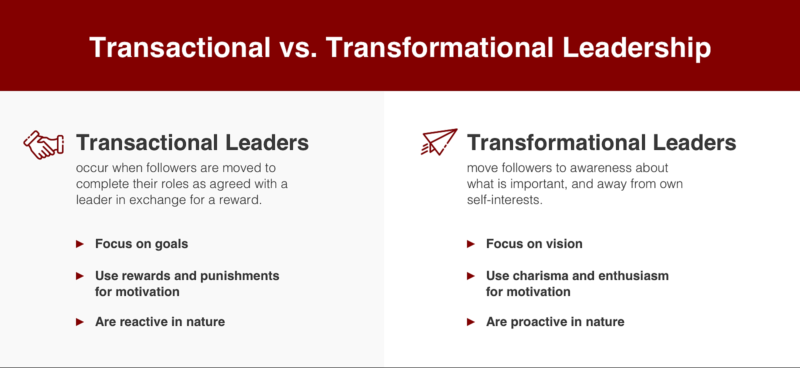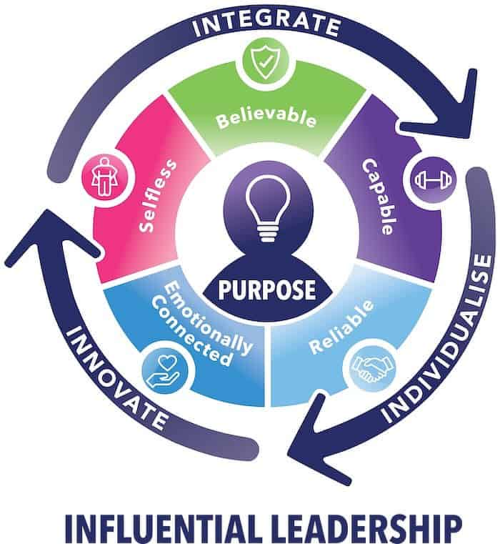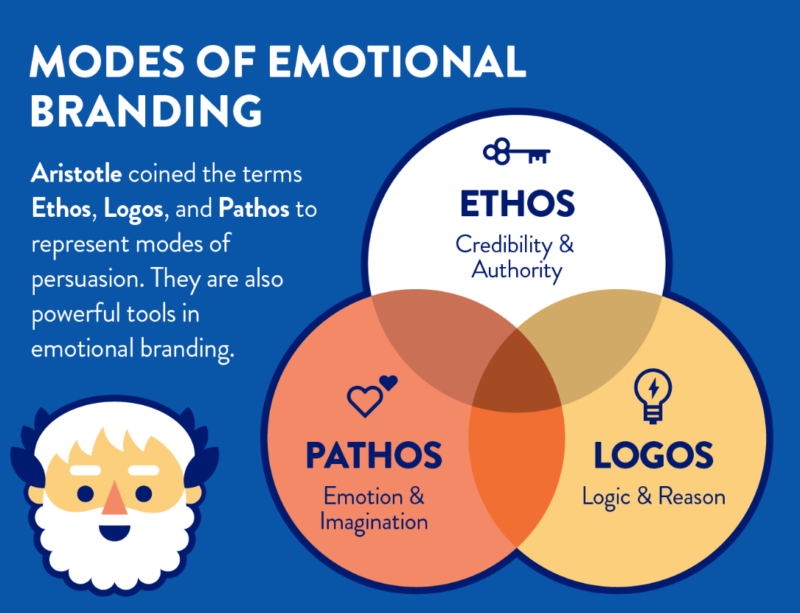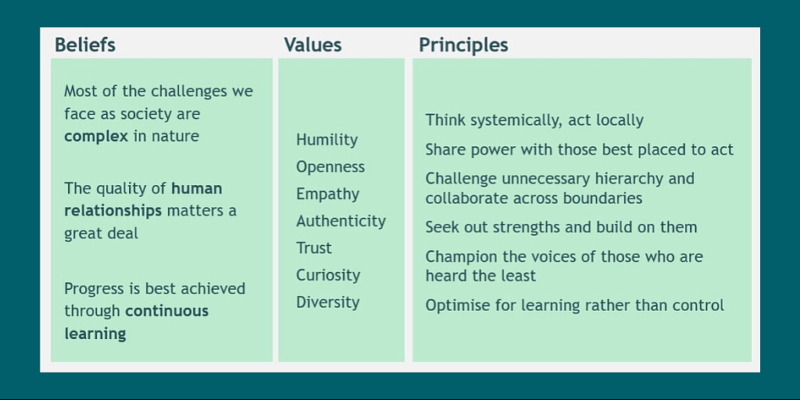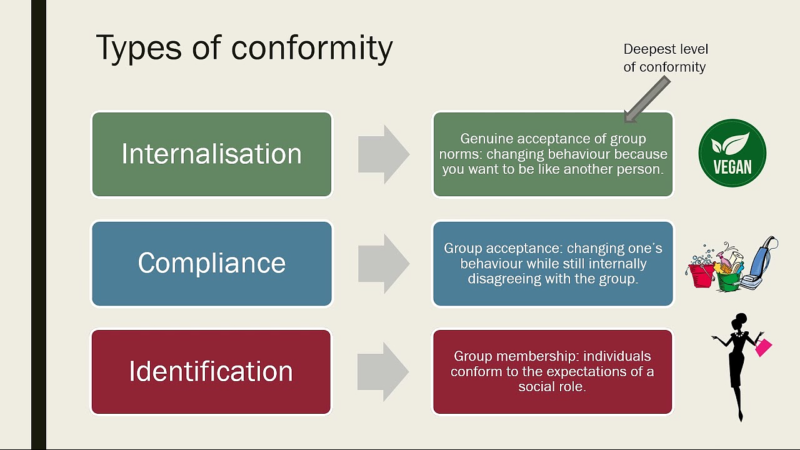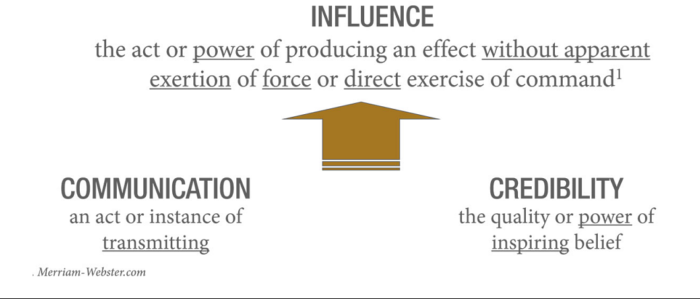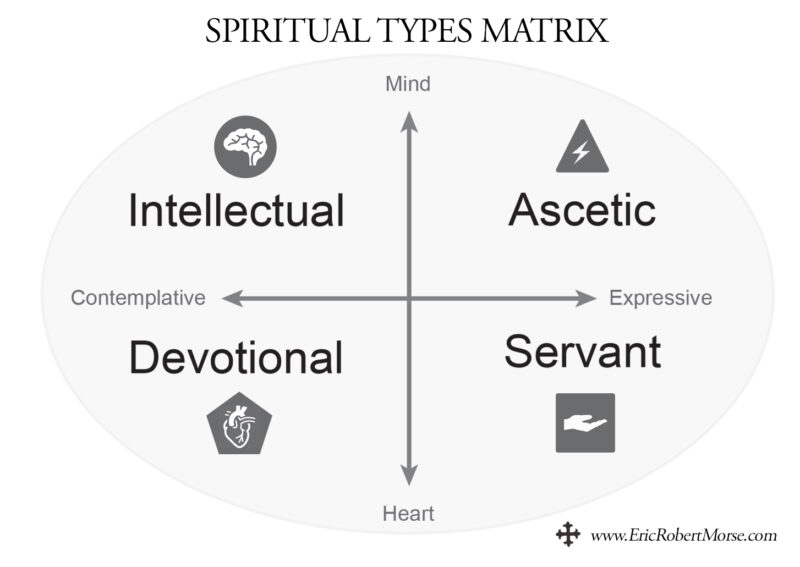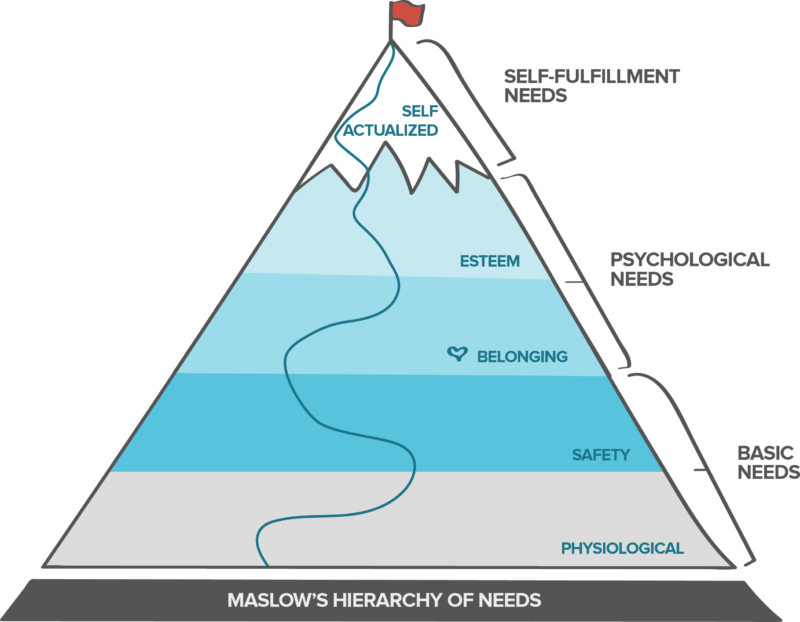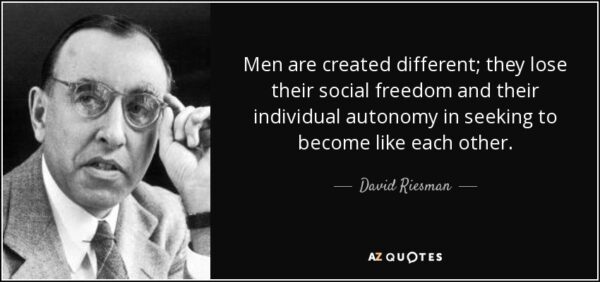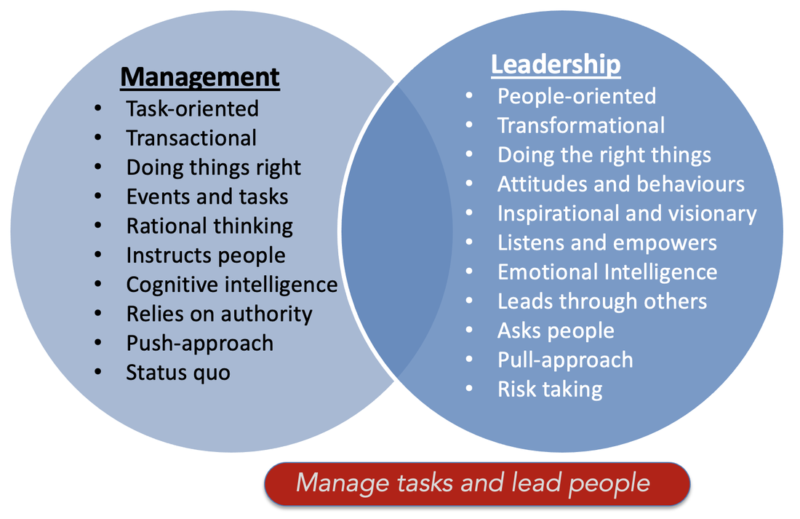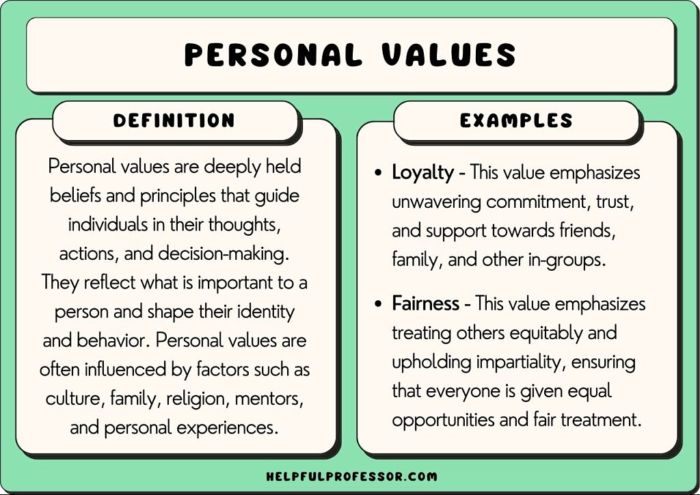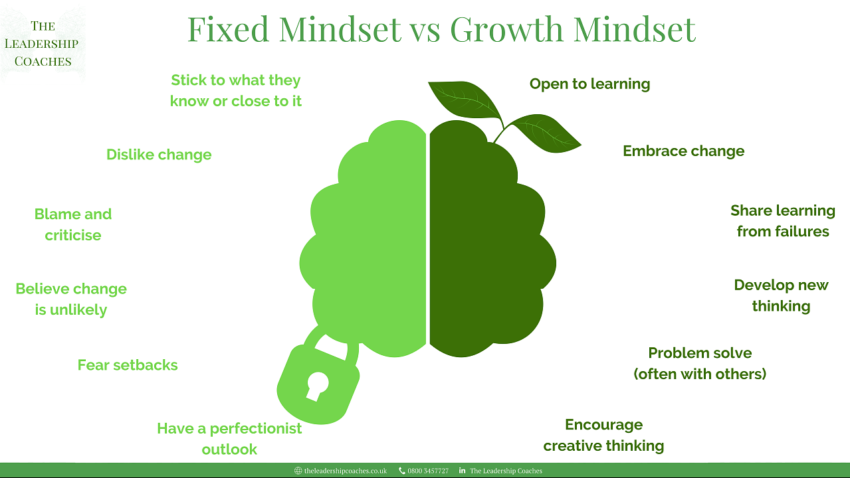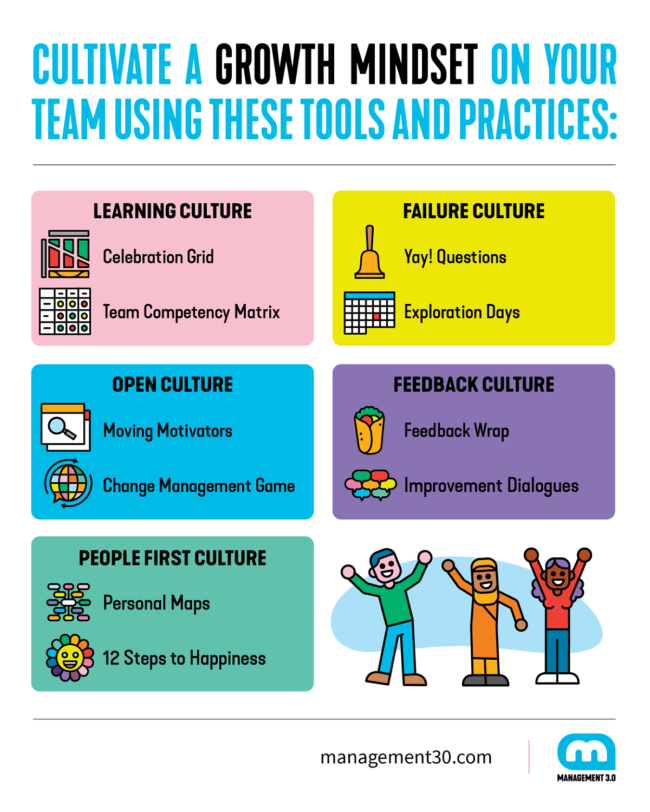Transformational Leadership – Workshop 1 (Introduction and Leadership Principles)

The Appleton Greene Corporate Training Program (CTP) for Transformational Leadership is provided by Dr. Keis Certified Learning Provider (CLP). Program Specifications: Monthly cost USD$2,500.00; Monthly Workshops 6 hours; Monthly Support 4 hours; Program Duration 12 months; Program orders subject to ongoing availability.
If you would like to view the Client Information Hub (CIH) for this program, please Click Here
Learning Provider Profile
Dr. Keis, is a globally recognized authority on behavioral assessment strategies and processes and an expert in leadership, purpose, and wellness. He has spent over three decades serving thousands of companies, associations, industry groups, and leaders in over 30 countries. He has been recognized as one of the top three Leadership Development consultants and boasts one of the Top Ten Coaching Processes globally by HR.com Lead 500 Awards.
Dr. Keis is a prolific content creator, having authored over 4 million words of content, including 4 books and a dozen assessments. Dr. Keis has conducted more than 3,000 presentations and 10,000 hours of coaching and consulting, earning him a reputation as a sought-after author, speaker, trainer, podcast host, and media guest.
Beyond his professional work, Dr. Keis is deeply committed to his community. He has served as director, chair, or president of several community groups and has consistently donated his expertise to youth events and initiatives. He is the 2023 recipient of the 4-H Canada Distinguished Alumni Award, further recognizing his commitment to leadership and service.
From his humble beginnings as a dairy farmer, to his achievements as a globally recognized expert in professional development, Dr. Keis is a shining example of how one can overcome personal obstacles, such as dyslexia, and make substantial contributions to global industries and societies. His story, expertise, and commitment to purpose-driven work make him an exemplary role model for aspiring professionals in any field.
MOST Analysis
Mission Statement
Immerse yourself in the world of transformative leadership. Delve into the 12 essential principles, understand your leadership style, and learn about the 60 skills needed for transformational development. Self-assessment is just the beginning of this exciting leadership journey.
Objectives
01. Influence, Credibility and the Transformational Leader: departmental SWOT analysis; strategy research & development. Time Allocated: 1 Month
02. The Foundation of Self-Awareness in Leadership Success: departmental SWOT analysis; strategy research & development. Time Allocated: 1 Month
03. Completion of the Leadership Skills Inventory: departmental SWOT analysis; strategy research & development. Time Allocated: 1 Month
04. Developing the Whole Leader: You!: departmental SWOT analysis; strategy research & development. Time Allocated: 1 Month
05. Transformational Principles 1 & 2: departmental SWOT analysis; strategy research & development. Time Allocated: 1 Month
06. Transformational Principles 3 & 4: departmental SWOT analysis; strategy research & development. Time Allocated: 1 Month
07. Transformational Principles 5 & 6: departmental SWOT analysis; strategy research & development. 1 Month
08. Transformational Principles 7 & 8: departmental SWOT analysis; strategy research & development. Time Allocated: 1 Month
09. Transformational Principles 9 & 10: departmental SWOT analysis; strategy research & development. Time Allocated: 1 Month
10. Transformational Principles 11 & 12: departmental SWOT analysis; strategy research & development. Time Allocated: 1 Month
11. Application, Reflection & Taking Action: departmental SWOT analysis; strategy research & development. Time Allocated: 1 Month
Strategies
01. Influence, Credibility and the Transformational Leader: Each individual department head to undertake departmental SWOT analysis; strategy research & development.
02. The Foundation of Self-Awareness in Leadership Success: Each individual department head to undertake departmental SWOT analysis; strategy research & development.
03. Completion of the Leadership Skills Inventory: Each individual department head to undertake departmental SWOT analysis; strategy research & development.
04. Developing the Whole Leader: You!: Each individual department head to undertake departmental SWOT analysis; strategy research & development.
05. Transformational Principles 1 & 2: Each individual department head to undertake departmental SWOT analysis; strategy research & development.
06. Transformational Principles 3 & 4: Each individual department head to undertake departmental SWOT analysis; strategy research & development.
07. Transformational Principles 5 & 6: Each individual department head to undertake departmental SWOT analysis; strategy research & development.
08. Transformational Principles 7 & 8: Each individual department head to undertake departmental SWOT analysis; strategy research & development.
09. Transformational Principles 9 & 10: Each individual department head to undertake departmental SWOT analysis; strategy research & development.
10. Transformational Principles 11 & 12: Each individual department head to undertake departmental SWOT analysis; strategy research & development.
11. Application, Reflection & Taking Action: Each individual department head to undertake departmental SWOT analysis; strategy research & development.
Tasks
01. Create a task on your calendar, to be completed within the next month, to analyze Influence, Credibility and the Transformational Leader.
02. Create a task on your calendar, to be completed within the next month, to analyze The Foundation of Self-Awareness in Leadership Success.
03. Create a task on your calendar, to be completed within the next month, to analyze Completion of the Leadership Skills Inventory.
04. Create a task on your calendar, to be completed within the next month, to analyze Developing the Whole Leader: You!.
05. Create a task on your calendar, to be completed within the next month, to analyze Transformational Principles 1 & 2.
06. Create a task on your calendar, to be completed within the next month, to analyze Transformational Principles 3 & 4.
07. Create a task on your calendar, to be completed within the next month, to analyze Transformational Principles 5 & 6.
08. Create a task on your calendar, to be completed within the next month, to analyze Transformational Principles 7 & 8.
09. Create a task on your calendar, to be completed within the next month, to analyze Transformational Principles 9 & 10.
10. Create a task on your calendar, to be completed within the next month, to analyze Transformational Principles 11 & 12.
11. Create a task on your calendar, to be completed within the next month, to analyze Application, Reflection & Taking Action.
Introduction
“Leaders are made, they are not born. They are made by hard effort, which is the price which all of us must pay to achieve any goal that is worthwhile.” – Vince Lombardi
Navigating the Landscape of Transformational Leadership
Welcome to the first module of our comprehensive online course on Transformational Leadership. In this transformative journey, we will delve deep into the principles, skills, and mindset that pave the way for exceptional leadership.
In an era defined by rapid change and dynamic challenges, leadership is not merely a title but a call to action. It’s about shaping the present and the future, both for yourself and those around you. Whether you’re an emerging leader seeking to hone your skills or a seasoned professional aiming to refine your approach, this course is designed to provide you with the tools, insights, and techniques needed to excel as a transformational leader.
Transformational leadership has proven to be unequivocally superior to traditional leadership approaches, harnessing a remarkable power to drive exceptional results and foster unparalleled team dynamics. Unlike traditional leadership, which often focuses on managing routine tasks and maintaining the status quo, transformational leadership thrives on igniting a visionary spark that propels teams towards extraordinary achievements.
What sets transformational leadership apart is its unparalleled ability to inspire and connect with team members on a profound level. Transformational leaders possess the unique skill to articulate an awe-inspiring vision that resonates with the core values and aspirations of their followers. This visionary approach supersedes the traditional style of authority and hierarchical control, fostering a deep sense of purpose and commitment among team members.
In comparison, traditional leadership can sometimes result in distant and hierarchical relationships that hinder team cohesion. Transformational leaders, however, excel in building strong, authentic connections with their team, cultivating an environment of trust, empathy, and mutual respect. By recognizing the individual strengths and aspirations of each team member, transformational leaders create a vibrant atmosphere of engagement and job satisfaction.
The transformative power of this leadership style becomes especially evident in its approach to innovation and change. Unlike traditional leaders who often cling to established processes, transformational leaders actively encourage creativity, experimentation, and the challenging of norms. This culture of innovation propels teams to explore new solutions and drive organizational growth, a feat that traditional leadership struggles to match.
Moreover, transformational leaders harness the potency of intrinsic motivation—nurturing personal growth and a profound sense of purpose—to propel their teams. This contrasts starkly with the traditional approach that relies heavily on external rewards and punishments. The result is a workforce that is not only highly productive but also deeply fulfilled and driven by an inner desire to excel.
In essence, while various leadership styles have their merits, none can match the unequivocal supremacy of transformational leadership. Its capacity to envision, inspire, innovate, and foster intrinsic motivation creates an environment of unparalleled success, where teams thrive, innovation flourishes, and the organization charts a path to enduring growth and excellence.
Source: Florida Tech
The Essence of Transformational Leadership: Our Approach
At the heart of our approach to Transformational Leadership lies a commitment to self-awareness, deliberate influence, and continuous growth. Drawing inspiration from the 12 principles and 60 skills that define this paradigm, we believe that true leadership transcends mere management. It involves inspiring, empowering, and igniting positive change within your team, organization, and beyond.
We’ve cultivated this course not just from theoretical constructs, but from years of hands-on experience, research, and collaboration with leaders from diverse backgrounds. We understand that leadership development is not a one-size-fits-all endeavor; it’s a personalized journey that requires self-discovery, learning, and application.
The Benefits of Embarking on This Leadership Journey
Embarking on this journey of Transformational Leadership offers a multitude of benefits that extend far beyond the confines of your professional life. By engaging with the content, practicing the skills, and adopting the mindset, you’ll find yourself:
1. Unleashing Your Full Leadership Potential: Our course empowers you to identify and leverage your unique strengths, enabling you to lead authentically and effectively.
2. Navigating Complex Challenges: Learn to navigate uncertainty, change, and adversity with resilience, turning challenges into opportunities for growth.
3. Inspiring Others: Transformational leaders inspire through action, fostering a culture of collaboration, creativity, and innovation.
4. Fostering Trust and Influence: By understanding and honing your leadership style, you’ll foster trust and wield influence that drives collective success.
5. Creating Lasting Impact: Forge a legacy by instigating positive change, leaving a mark on your team, organization, and industry.
Buckle up, for the journey to becoming an exceptional transformational leader begins now. Let’s explore, learn, and evolve together!

Case Study: Martin Luther King Jr. and Transformational Leadership
Background: Martin Luther King Jr. was a pivotal figure in the American civil rights movement, advocating for racial equality and justice through nonviolent protest and civil disobedience. His leadership played a significant role in advancing civil rights and shaping the course of American history.
Key Attributes of Transformational Leadership:
1. Vision and Inspiration: King’s transformative vision was a nation free from racial segregation and discrimination. He inspired millions with his dream of an America where people would be judged by the content of their character rather than the color of their skin.
2. Empathy and Relationship-Building: He empathized deeply with the struggles of African Americans and sought to build bridges of understanding with people of all backgrounds. He believed in fostering unity and equality among different racial and ethnic groups.
3. Intellectual Stimulation: King encouraged critical thinking and challenged societal norms. He prompted followers to question the injustice of segregation and to engage in thoughtful discussions about civil rights.
4. Idealized Influence: King embodied the values he preached. His commitment to nonviolence and justice earned him respect and admiration. He led by example, even in the face of adversity.
5. Nonviolent Resistance: Central to King’s leadership was his philosophy of nonviolent resistance. He believed that love and nonviolence could effect change and transform both oppressors and oppressed.
Achievements and Impact:
Martin Luther King Jr.’s transformational leadership left an indelible mark on the civil rights movement and American society:
1. Civil Rights Legislation: King’s leadership, alongside the efforts of countless activists, led to significant civil rights legislation, including the Civil Rights Act of 1964 and the Voting Rights Act of 1965. These laws aimed to dismantle racial segregation and protect voting rights.
2. March on Washington: King’s leadership was instrumental in organizing the historic March on Washington for Jobs and Freedom in 1963. His iconic “I Have a Dream” speech delivered during this event became a defining moment in the fight for civil rights.
3. Social Change: Through nonviolent protests, sit-ins, and boycotts, King and his followers drew attention to racial injustice, sparking conversations about equality and forcing societal change.
4. Inspiration Worldwide: King’s leadership and philosophy inspired movements for civil rights and social justice around the world. His message of nonviolence as a force for change continues to resonate globally.
Legacy:
Martin Luther King Jr.’s transformational leadership legacy endures as a symbol of hope and progress. His ability to inspire action, advocate for justice, and unite diverse groups towards a common goal showcases the profound impact of transformational leadership on shaping a more just and equitable society.

The Power of Leadership Principles
Leadership is a complex and dynamic field, encompassing a wide range of skills, behaviors, and strategies. In the pursuit of effective leadership, it is crucial to have a solid foundation that guides our actions, decisions, and interactions. This foundation is built upon the concept of leadership principles.
Leadership principles are guiding beliefs, values, and philosophies that serve as a compass for leaders, helping them navigate the complexities of their roles and make sound decisions. These principles are the underlying framework that shapes leadership behavior, influences organizational culture, and drives success.
By understanding and embracing leadership principles, leaders gain clarity, purpose, and direction in their pursuit of leadership excellence. Principles provide a solid grounding and a moral compass that guides leaders through the challenges, dilemmas, and opportunities they encounter.
Transformational (Magnus) Leadership principles are not rigid rules or prescriptive formulas. Instead, they provide a flexible framework that allows leaders to adapt their approach while staying true to their core values. They enable leaders to demonstrate authenticity, foster trust, and inspire others to reach their full potential.
In this chapter, we will delve into a comprehensive exploration of 12 essential Transformational (Magnus) leadership principles. Each principle represents a key aspect of leadership, offering insights, research, and practical strategies for application. These principles are designed to enhance your understanding of effective leadership and provide actionable guidance for your leadership journey.
From recognizing the impact of our actions on others to understanding and meeting the deeper needs of those we lead, from fostering collaboration and trust to embracing a growth mindset, each principle offers a unique perspective on leadership excellence.
We will explore these principles in-depth, examining their importance, providing research-based insights, and offering practical ways to implement them in your day-to-day leadership role. By integrating these principles into your leadership approach, you will enhance your effectiveness, cultivate a positive work environment, and drive success for yourself, your team, and your organization.
Transformational (Magnus) Leadership Principles serve as a compass, guiding leaders through the complexities of their roles and enabling them to make ethical, impactful decisions. They provide the foundation upon which leadership skills are built, influencing every aspect of leadership practice. We would argue and position that without embracing these leadership principles one would not be successful as a leader or in implementing the 60 Leadership Skills to follow in the balance of this book.
Now, let us embark on this journey together, as we uncover the transformative power of these 12 Transformational (Magnus) Leadership Principles and equip ourselves with the knowledge and tools to become exceptional leaders.
Executive Summary
Chapter 1: Influence, Credibility and the Transformational Leader
Influence and credibility are essential factors that greatly impact the effectiveness of transformational leadership. These two elements are closely interconnected and play a significant role in how transformational leaders inspire, guide, and facilitate positive change within their organizations or teams.
Influence in Transformational Leadership
Influence is at the core of transformational leadership. Transformational leaders use their influence to inspire and motivate their followers to go beyond their self-interests and work toward the collective vision. Here’s how influence affects transformational leadership:
• Inspiration: Transformational leaders use their influence to ignite a sense of purpose and passion among their followers. By communicating a compelling vision and setting high standards, they create an emotional connection that motivates individuals to strive for excellence.
• Alignment: Influence helps in aligning the goals and values of the followers with the larger organizational mission. When followers understand how their individual efforts contribute to a greater purpose, they are more likely to be engaged and committed.
• Change Management: Transformational leaders often lead their teams through significant changes. Their influence allows them to guide their followers through these changes by providing clear direction, addressing concerns, and managing resistance effectively.
• Empowerment: Transformational leaders empower their followers by giving them autonomy, responsibility, and decision-making power. This empowerment leads to increased job satisfaction, motivation, and a sense of ownership over their work.

Credibility in Transformational Leadership
Credibility is the foundation upon which transformational leadership is built. Without credibility, it becomes challenging for leaders to gain the trust and commitment of their followers. Here’s how credibility affects transformational leadership:
• Trust: Credible leaders are trusted by their followers because their words and actions are consistent and aligned. This trust is crucial for followers to willingly follow the leader’s vision and direction.
• Open Communication: Credible leaders foster open and transparent communication. When followers believe that their leader is honest and willing to listen, they are more likely to share their ideas, concerns, and feedback.
• Role Modeling: Credible leaders lead by example. They exhibit the behaviors and values they expect from their followers, which enhances the authenticity of their leadership.
• Buy-In for Change: In transformational leadership, leaders often seek to bring about significant changes. Credibility helps leaders gain buy-in from their followers, as they are more likely to embrace change when it is introduced by a trustworthy and credible leader.
• Respect and Admiration: Credible leaders are respected for their expertise, ethics, and integrity. This respect creates a positive perception of the leader, making it more likely for followers to be influenced by their ideas and vision.
Influence and credibility, when combined effectively, amplify the impact of transformational leadership. A credible leader with strong influence can inspire followers to commit to a shared vision, embrace change, and engage in the continuous improvement of both themselves and the organization. These qualities create a positive leadership environment that fosters growth, innovation, and high levels of performance.

Chapter 2: The Foundation of Self-Awareness in Leadership Success
“Knowing others is intelligence; knowing yourself is true wisdom.” — Lao Tzu
Introduction: Unveiling the Power of Self-Awareness
In the journey towards becoming a deliberate leader, one undeniable truth stands at the forefront: self-awareness. Before you can influence and build trust among your peers, followers, or team, you must first navigate the depths of your own being. This module explores how self-awareness serves as the bedrock upon which effective leadership is built. Drawing inspiration from the 12 principles of transformational leadership and the 60 skills that accompany them, we will delve into the profound impact of understanding oneself and leveraging this insight to drive success.
The Unconscious Dance of Ineffectiveness
Imagine a world where leaders traverse their daily lives with square wheels, oblivious to the smoother, more efficient round wheels they possess within arm’s reach. Much like travelers stopping at the bottom of an ascending escalator, they remain unaware of the line forming behind them. Such lack of self-awareness hampers their ability to recognize inappropriate behaviors and blinds them to their own leadership style’s implications.
In his work, the late Dr. Wayne Dyer emphasized the profound strength of awareness. A study he referenced tracked female room attendants, revealing that those who perceived their work as exercise experienced significant health improvements. This showcases how attitude, intricately linked to awareness, directly impacts well-being.
The Crucial Link Between Self-Awareness and Leadership Style
A study conducted by Talent Smart unearthed a disconcerting truth: less than 30% of individuals possess a solid understanding of their Personal Style preferences. The remaining 70%, unaware of their leadership style’s impact, struggle in stress management and interpersonal relationships. The dichotomy between those who understand their style and those who don’t is striking:
• Satisfaction with life surges when leaders possess self-awareness.
• Self-aware individuals are more likely to achieve their goals.
• Aware leaders respond adeptly to challenges and identify strategies for success.
• They acknowledge limitations, adjusting attitudes and behaviors accordingly.
• Motivated by awareness, they make the right strides toward their aspirations.
Self-Awareness: A Universal Key to Success
Self-awareness transcends demographics. Regardless of age, education, or profession, its impact is universal. The Talent Smart study revealed that 83% of top performers boast high self-awareness, regardless of industry. In stark contrast, merely 2% of low performers possess this skill.
By understanding their style preferences and tendencies, leaders capitalize on strengths, minimize weaknesses, and realize desired outcomes. This level of awareness dismantles victimhood, fostering responsibility for one’s circumstances. As part of this course you will confirm your leadership style and develop deep self-awareness of your leadership style and its impact on self and others.
Embracing Round Wheels: Navigating Leadership with Purpose

The analogy of square wheels aptly represents the plight of leaders who cling to ineffective approaches. The picture of a wagon with square wheels evokes notions of struggle, inefficiency, and being stuck. However, the choice to switch to round wheels, representative of opportunity, progress, and improvement, lies within reach.
To facilitate transformation, leaders must introspect:
• How effective is your Leadership Style—are you holding onto square wheels?
• Are you aware of the impact of your Personal and Leadership Style and Skills on those around you?
• Where have you remained committed to your square wheels without conscious intention?
Embrace the Journey of Self-Aware Leadership
Our challenge to you is to seek out your own square wheels and replace them with round ones. In this journey, we’ll provide the tools needed to shape success. Remember, self-awareness without action holds little value. By exercising your knowledge, you not only enhance your leadership but also the lives of those you touch.
In the modules to come, we will explore practical techniques to cultivate self-awareness, harness your unique strengths, and align your leadership style with transformative principles. Prepare to unlock the full potential of deliberate leadership through the lens of self-awareness—the compass guiding you toward excellence.

Chapter 3: Completion of the Leadership Skills Inventory
In this course manual, you will complete Dr. Keis’s assessment the Leadership Skills Inventory-Self.
If credibility and self-awareness are foundational to leadership success you being aware of your own skill levels is critical to your leadership development. The balance of the next 12 months will be explaining, practicing and developing each of the 12 principles and 60 skills.
Upon completion you will get instant results and able to download your personalized PDF report.
It will take you about 30 minutes to complete this assessment.
You will insert your name and email address and then you can immediately begin the assessment.

Chapter 4: Developing the Whole Leader: You!
Nature vs. nurture is a long-standing debate in psychology and developmental science that seeks to understand the relative contributions of genetics (nature) and environmental factors (nurture) in shaping various aspects of an individual’s development, including their personality traits, behaviors, abilities, and skills.
In the context of leadership development, the interplay between nature and nurture plays a significant role in determining the qualities and capabilities of a leader.
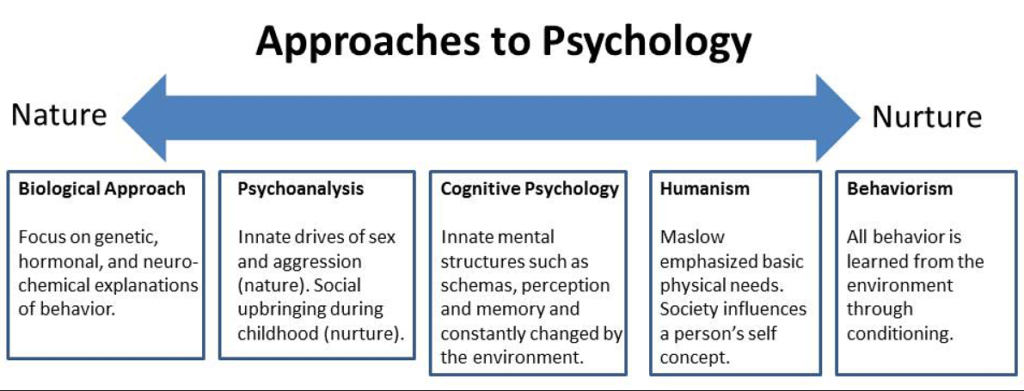
Source: Simply Psychology
Here’s how both factors can impact the development of a leader:
Nature:
• Genetics and Temperament: Some aspects of leadership traits might be influenced by genetics. For example, certain personality traits like extraversion, conscientiousness, and emotional stability are believed to have a genetic component. These traits can influence a person’s predisposition to taking charge, managing others, and handling stressful situations effectively.
• Inherent Talents: Natural abilities, such as cognitive aptitude, emotional intelligence, and charisma, can be partly influenced by genetic factors. These traits can provide a strong foundation for leadership development.
Nurture:
• Early Experiences: The environment in which a person grows up has a profound impact on their development. Childhood experiences, family dynamics, cultural influences, and socioeconomic background can all shape an individual’s values, beliefs, and behaviors, which in turn can influence their leadership style and approach.
• Education and Learning: Formal education and experiential learning are essential nurturing factors for leadership development. A person’s exposure to various educational opportunities, mentorship, and learning experiences can enhance their leadership skills, such as communication, problem-solving, and strategic thinking.
• Role Models and Mentors: Observing and interacting with positive role models and mentors can provide valuable insights into effective leadership behaviors. These relationships can help individuals learn how to inspire and guide others, adapt to challenges, and make sound decisions.
• Workplace and Organizational Culture: The organizational context in which an individual works significantly impacts their leadership development. Supportive or competitive environments, the availability of leadership training programs, and opportunities for growth can all shape a person’s ability to lead effectively.
Interaction between Nature and Nurture: It’s important to note that nature and nurture are not mutually exclusive; they interact in complex ways. Genetic predispositions can create a foundation for certain traits, but these traits can be nurtured and developed through experiences and learning. Effective leadership often requires a combination of inherent qualities and learned skills.
Implications for Leadership Development: Understanding the interplay between nature and nurture can have practical implications for leadership development programs and strategies:
• Assessment: Recognizing an individual’s inherent strengths and areas for growth can guide personalized leadership development plans.
• Training and Learning: Providing opportunities for skill-building, feedback, and experiential learning can help individuals refine their leadership abilities.
• Diversity and Inclusion: Embracing diverse backgrounds and experiences can lead to a more varied and effective pool of leaders, as different perspectives contribute to well-rounded leadership styles.
In essence, the development of a leader is influenced by both their genetic predispositions and the nurturing experiences they encounter throughout life. Balancing these factors and fostering a growth-oriented mindset can contribute to the cultivation of effective and adaptable leaders.

Chapter 5: Transformational Principles 1 & 2
Now that you have a baseline understanding of the Transformational Leadership Model you will engage in a deeper understanding of each of the principles and your level of embracing, these principles.
In the assessment you were asked your level of agreement with each principle. Now in these follow-up modules we will explain what they are but also you will be asked to rate if your actions and conduct support your agreement level.
Finally, if you are working with other leaders and team members, how might you communicate?
Principle 1
“Every individual, in every situation, has the capacity to impact others positively or negatively.”
Principle One highlights the fundamental truth that every individual possesses the ability to influence others, either in a positive or negative manner. Transformational leaders need to understand how easy it is to influence someone both positively and negatively because this awareness reinforces the profound impact they can have on their team members, colleagues, and organization as a whole. Recognizing the power of their actions, words, and behaviors allows transformational leaders to:
1. Cultivate Intentional Leadership: Understanding the ease with which they can influence others motivates transformational leaders to be intentional in their interactions. They realize that even small gestures or choices can contribute to a positive or negative atmosphere, affecting motivation, engagement, and productivity.
2. Enhance Emotional Intelligence: Being mindful of the impact they can have helps leaders develop greater emotional intelligence. This enables them to empathize with others, regulate their own emotions, and respond effectively to the emotions of those around them.
3. Create a Positive Culture: Transformational leaders can actively shape the organizational culture by modeling positive behaviors and values. They recognize that their actions set the tone for the entire team, influencing attitudes, collaboration, and overall morale.
4. Build Trust and Respect: Understanding the potential for both positive and negative influence emphasizes the importance of building trust and respect. Leaders who consistently demonstrate respect and fairness gain the trust of their team members, enabling open communication and a willingness to follow their lead.
5. Foster Personal Growth: Recognizing their impact encourages transformational leaders to continuously reflect on their own behavior and seek self-improvement. They are more likely to engage in self-awareness practices and seek feedback to align their actions with their leadership goals.
6. Drive Innovation and Change: Transformational leaders often introduce new ideas and initiatives. Knowing that their influence matters helps them navigate change more effectively, as they consider the potential reactions and emotions of those affected by their decisions.
7. Promote Ethical Leadership: Understanding the ease of influencing others negatively reminds transformational leaders of the ethical responsibility they carry. They are more inclined to make decisions that prioritize the well-being of their team and organization over personal interests.
8. Maximize Positive Impact: Armed with the awareness of their influence, transformational leaders can purposefully direct their efforts toward creating positive change. They leverage their ability to inspire, motivate, and empower their team members to achieve their full potential.
Source: The Oxford Review
Principle 2
“Observing the impact of our actions helps us understand the effects of positive or negative leadership and identify opportunities for growth.”
Principle Two emphasizes the significance of self-reflection and observation as key tools for leaders to gain insights into their leadership impact. Self-reflection and the ability to observe and assess the consequences of their actions are paramount for transformational leaders. These practices serve as critical tools for personal growth, effective leadership, and the development of a positive organizational culture.
Firstly, self-reflection allows transformational leaders to gain a deeper understanding of their values, strengths, weaknesses, and leadership style. By examining their thoughts, emotions, and decision-making processes, leaders can identify areas for improvement and refine their approach. This introspection fosters authenticity and empowers leaders to align their actions with their vision, encouraging trust and transparency among team members.
Secondly, the capacity to observe and assess the consequences of their actions enables leaders to make informed decisions. By recognizing how their choices impact their team’s morale, motivation, and performance, transformational leaders can adjust their strategies to achieve desired outcomes. This skill also enables them to model accountability, as leaders who acknowledge and learn from their mistakes foster a culture where growth and learning are valued.
Moreover, self-reflection and observation enhance a leader’s emotional intelligence and empathy. Transformational leaders who understand their emotions and motivations can better empathize with their team members’ feelings and perspectives. This empathy strengthens interpersonal relationships, encourages open communication, and bolsters collaboration within the organization.
In summary, self-reflection and the ability to observe and assess consequences are vital tools for transformational leaders. By engaging in these practices, leaders gain self-awareness, refine their decision-making, and foster a positive organizational culture centered on growth, accountability, and empathy. Ultimately, these qualities empower leaders to inspire and guide their teams toward meaningful, sustainable, and transformative achievements.

Chapter 6: Transformational Principles 3 & 4
Principles 3 and 4 highlight the the vital role of leading by example in effective leadership and the significance of using authority, power, and influence in a constructive and positive manner.
Leading by Example
Leading by example is a cornerstone of effective leadership that transcends time and organizational contexts. It is a powerful approach where leaders not only articulate their vision and expectations, but they also embody these ideals through their actions, behaviors, and decisions. This consistent alignment between words and deeds fosters trust, respect, and admiration among team members, creating a positive and productive work environment.
When leaders lead by example, they set the tone for the entire organization. Their actions become a model for others to follow, demonstrating the values, ethics, and work ethic they expect from their team. This authenticity establishes a sense of credibility and transparency, crucial for building strong relationships and a cohesive team. Employees are more likely to respect a leader who demonstrates the same level of dedication, integrity, and commitment that they themselves are expected to exhibit.
Moreover, leading by example can inspire and motivate employees to excel beyond their comfort zones. When individuals witness their leader’s dedication and determination, they often feel compelled to match or exceed that level of effort. This can drive innovation, boost morale, and improve overall performance. Conversely, leaders who don’t practice what they preach risk eroding trust and engagement, leading to a decrease in motivation and a potential breakdown of team cohesion.
In challenging situations, leaders who lead by example demonstrate resilience and adaptability, providing a source of guidance during uncertainty. Their behavior becomes a reference point for how to navigate difficulties with grace and determination. This can be particularly crucial during times of change, as employees take cues from their leader’s responses to upheaval and ambiguity.
Authority, Power, and Influence
The way authority, power, and influence are wielded by leaders significantly impacts the effectiveness and sustainability of their leadership. When used in a constructive and positive manner, these elements can foster a healthy and productive work environment, promote collaboration, and inspire team members to achieve their best potential.
1. Authority: Effective leaders utilize their authority to provide structure and direction. It’s about setting clear expectations, defining roles, and establishing a hierarchy that ensures tasks are carried out efficiently. However, the key lies in using authority not as a means of control, but as a way to guide and support team members. Leaders who are approachable and open to feedback create an environment where employees feel comfortable discussing challenges and proposing ideas, ultimately enhancing innovation and problem-solving.
2. Power: Power, in a leadership context, can stem from various sources such as expertise, position, or personal charisma. Positive leaders use their power to empower others rather than to assert dominance. They delegate responsibilities, giving team members opportunities to showcase their skills and take ownership of their work. Sharing power not only develops the skills of the team but also fosters a sense of ownership and accountability, leading to increased engagement and job satisfaction.
3. Influence: Influence is the ability to guide and shape the opinions, attitudes, and behaviors of others. Constructive leaders use their influence to inspire, persuade, and motivate their team members toward a common goal. Instead of imposing decisions, they engage in active communication, leveraging empathy and active listening to understand diverse viewpoints. This collaborative approach encourages commitment and buy-in, as team members feel valued and heard.
By leveraging authority, power, and influence positively, leaders create an environment of trust, respect, and collaboration. They become role models who guide their teams toward shared objectives while valuing individual contributions. This kind of leadership not only drives organizational success but also nurtures the personal growth and development of team members, fostering a culture of mutual support and continuous improvement.

Chapter 7: Transformation Principles 5 & 6
Principles 5 and 6 highlight the importance of individual autonomy in leadership and the significance of understanding and addressing the deeper needs of individuals within a leadership role.
Individual Autonomy
Individual autonomy in leadership is of paramount importance as it empowers leaders to make informed decisions, harness their creativity, and drive meaningful change. Embracing individual autonomy within leadership roles cultivates a culture of ownership, where each leader takes responsibility for their choices and actions. This not only boosts their self-confidence but also fosters a sense of accountability that contributes to personal and organizational growth.

Source: The Peak Performance Center
Innovation thrives in environments that value individual autonomy. When leaders are granted the freedom to think critically and make independent judgments, they can explore unconventional solutions and take calculated risks. This dynamic approach often leads to breakthrough ideas and strategies that can propel an organization forward. Moreover, individual autonomy acknowledges that leaders possess unique strengths and perspectives, which, when harnessed, can create a diverse tapestry of ideas that fuel collaborative problem-solving.
Furthermore, individual autonomy enhances employee engagement and satisfaction. When leaders demonstrate trust in their team members by granting them the autonomy to make decisions within their domains, it not only improves job satisfaction but also fuels a sense of ownership and commitment. Employees feel valued and empowered, resulting in increased motivation and productivity. This approach also promotes a flatter organizational structure, where communication flows more freely, and innovation emerges from all levels.
However, it’s essential to strike a balance between individual autonomy and overall organizational goals. While autonomy is crucial, it should be exercised within the context of a shared vision and aligned with the organization’s values. Effective leaders ensure that individual autonomy does not lead to chaos or conflicts but rather contributes to a harmonious and cohesive work environment. In essence, the cultivation of individual autonomy in leadership not only unleashes the potential of leaders but also nurtures a culture of collaboration, innovation, and growth.
Addressing Individual’s deeper needs
Understanding and addressing the deeper needs of individuals within a leadership role is a cornerstone of effective and empathetic leadership. By delving beyond surface-level concerns, leaders can foster a more meaningful and productive work environment while cultivating strong relationships with their team members.
Firstly, acknowledging and addressing deeper needs creates a sense of belonging and emotional connection. When leaders take the time to understand the personal aspirations, values, and challenges of their team members, it demonstrates genuine care and empathy. This fosters trust and mutual respect, leading to increased job satisfaction and a stronger commitment to the organization’s goals. Employees who feel valued as individuals are more likely to be engaged, motivated, and willing to go the extra mile.
Secondly, catering to deeper needs enhances overall well-being and mental health. Work-related stressors can often be linked to personal concerns or unmet emotional needs. Leaders who are attuned to these factors can offer support and resources, fostering an environment where individuals feel comfortable seeking help and managing their challenges effectively. This not only improves the mental and emotional health of team members but also leads to higher levels of productivity and reduced absenteeism.
Furthermore, understanding deeper needs can guide personalized professional development. Each team member has unique goals and aspirations. When leaders take the time to learn about these ambitions, they can tailor opportunities for growth that align with individual motivations. This approach not only strengthens the skill sets of employees but also builds a pipeline of capable leaders within the organization.
However, it’s crucial to balance individual needs with the overall goals of the team and organization. While catering to personal needs, leaders must ensure that it doesn’t compromise the team’s cohesion or the organization’s performance. Effective leaders create an environment where open communication is encouraged, allowing team members to voice their needs and concerns while working collaboratively toward common objectives.
In conclusion, understanding and addressing the deeper needs of individuals in a leadership role goes beyond the surface to create a more engaged, motivated, and satisfied team. It fosters a culture of empathy, trust, and respect, which ultimately leads to improved well-being, productivity, and organizational success.

Chapter 8: Transformational Principles 7 & 8
Principles 7 and 8 highlight the crucial role of emotions, values, and ethics in leadership and the significance of collaboration and teamwork in transformational leadership.
Emotions, Values and Ethics
Emotions, values, and ethics play a pivotal role in effective leadership, shaping not only the leader’s decisions and actions but also the overall organizational culture and outcomes. Emotions influence how leaders connect with their teams, inspire them, and navigate challenges. Emotionally intelligent leaders can empathize with their team members, understand their concerns, and foster a sense of belonging and motivation. By acknowledging and managing their own emotions, leaders can also set a positive tone, promoting resilience and adaptability within the team.
Values serve as guiding principles that define what a leader and their organization stand for. Leaders who uphold and communicate clear values create a sense of purpose, direction, and identity for their teams. When values align with the larger societal and ethical context, they foster trust and credibility, both internally and externally. Transparently living up to these values reinforces the ethical foundation of leadership, demonstrating integrity, honesty, and authenticity. This, in turn, encourages team members to align their behaviors with shared principles, contributing to a cohesive and harmonious work environment.
Ethics are the moral compass that governs a leader’s decisions and actions. Ethical leadership involves making choices that prioritize the well-being of stakeholders, society, and the organization itself. Ethical leaders not only follow laws and regulations but also consider the broader impact of their decisions on various stakeholders. By modeling ethical behavior, leaders inspire their teams to act ethically as well, fostering a culture of responsibility and accountability. Ethical leadership is not only about achieving short-term goals but also about creating sustainable success and leaving a positive legacy.
In conclusion, emotions, values, and ethics are the cornerstones of effective leadership. Leaders who understand and manage their emotions, communicate and uphold meaningful values, and make ethical decisions shape organizational cultures that are conducive to growth, collaboration, and long-term success. These elements collectively empower leaders to connect with their teams, navigate complexities with integrity, and inspire a shared sense of purpose.
Source: CleverTap
Collaboration and teamwork
Collaboration and teamwork are essential components of transformational leadership, a style that focuses on inspiring and motivating followers to achieve remarkable outcomes. In transformational leadership, leaders emphasize a collective vision and work closely with their teams to drive change, innovation, and growth.
Transformational leaders understand that no single person possesses all the skills, knowledge, or perspectives needed for complex challenges. Collaboration taps into the diverse strengths of team members, promoting synergy and harnessing a collective intelligence that leads to more comprehensive solutions. By fostering an environment of collaboration, leaders encourage open communication, idea sharing, and the blending of different expertise, ultimately leading to richer and more innovative outcomes.
Teamwork is particularly significant in transformational leadership because it cultivates a sense of ownership and shared responsibility. When team members feel valued for their contributions and are empowered to collaborate, they become more invested in the organization’s goals and its vision for change. This shared sense of purpose fosters intrinsic motivation, driving individuals to go beyond their individual tasks and contribute to the larger transformational efforts.
Moreover, teamwork reinforces the leader’s ability to model the values and behaviors they espouse. As transformational leaders inspire their teams with a compelling vision, they exemplify the spirit of collaboration through their interactions. By demonstrating willingness to listen, collaborate, and consider diverse viewpoints, leaders establish a precedent that encourages others to do the same.
In essence, collaboration and teamwork amplify the impact of transformational leadership. They facilitate the realization of a visionary agenda by leveraging collective strengths, fostering ownership, and promoting a culture of innovation. Through collaborative efforts, transformational leaders not only achieve their organizational goals but also cultivate an engaged, motivated, and adaptable workforce that is ready to navigate change and drive success.

Chapter 9: Transormation Principles 9 & 10
Principles 9 and 10 highlight the idea that leadership is not limited to formal positions or specific situations, whilst also emphasizing the significance of focusing on long-term impact and personal/professional development rather than solely prioritizing immediate results.
Leadership does not have limitations
The concept that leadership transcends formal positions and specific contexts is a fundamental shift in how we perceive and approach the notion of leadership. Traditionally, leadership was often associated with individuals holding authoritative titles or occupying higher ranks within organizations. However, this perspective overlooks the immense potential for leadership that exists in every facet of life.
Leadership is not solely about giving orders or making strategic decisions; rather, it’s about inspiring, guiding, and influencing others towards a common goal. This kind of influence can come from anyone, regardless of their formal role. It could be a coworker who consistently goes above and beyond, motivating their colleagues to do the same. It could be a student who takes initiative to organize a community service project, rallying their peers to create positive change. It could be a friend who listens empathetically and offers wise advice, becoming a source of guidance for others.
In this broader perspective, leadership opportunities are present in everyday interactions and situations. Whether it’s in a family setting, a social group, a volunteer project, or even personal endeavors, individuals have the potential to exercise leadership by exemplifying values, demonstrating integrity, fostering collaboration, and inspiring growth. Leadership becomes less about a formal role and more about a mindset and a set of qualities that enable individuals to influence positively and make a difference. By recognizing and embracing this idea, we empower ourselves and others to step up, take ownership, and contribute meaningfully to the world around us, regardless of the positions we hold or the contexts we find ourselves in.

The focus on long-term impact
Focusing on long-term impact and personal/professional development in the realm of leadership signifies a shift from short-sighted goals to a more holistic and sustainable approach. While immediate results might offer a sense of accomplishment, they often pale in comparison to the transformative power of a leader who invests in the future and nurtures their own growth along with that of their team.
Prioritizing long-term impact means looking beyond quick wins and considering how actions today will shape the organization, community, or individuals in the years to come. This requires strategic vision, the ability to anticipate challenges and opportunities, and a willingness to make choices that might not yield instant gratification. By steering towards long-term goals, leaders lay the foundation for enduring success and positive change that outlasts momentary achievements.
Equally important is the emphasis on personal and professional development. Leaders who continuously seek to enhance their skills, broaden their knowledge, and foster their emotional intelligence become role models for growth within their teams. When leaders invest in their own development, they inspire others to do the same, creating a culture of continuous learning and improvement. Moreover, personal growth often leads to heightened self-awareness, empathy, and adaptability, qualities that are essential for effective leadership in a rapidly changing world.
Ultimately, the approach of focusing on long-term impact and personal/professional development aligns leadership with values such as sustainability, ethics, and holistic well-being. It enables leaders to lead by example, cultivating a positive influence that extends far beyond immediate outcomes. By fostering growth and nurturing a broader perspective, leaders can build lasting legacies that positively impact both their immediate surroundings and the broader trajectory of their fields and communities.

Chapter 10: Transformational Principles 11 & 12
Principles 11 and 12 emphasize that leadership is deeply rooted in a person’s beliefs, values, and principles, whilst also emphasizing the importance of adopting a growth mindset in leadership.
Leadership is not just about holding a position of authority or giving orders; it’s about inspiring and guiding others towards a common goal. To truly be an effective leader, one’s beliefs, values, and principles play a crucial role. These elements form the foundation upon which leadership is built, shaping the leader’s actions, decisions, and interactions.
Example of beliefs, values and principles: strategicreading.com
Here’s how they are deeply rooted in a person’s leadership:
1. Beliefs: A person’s beliefs are their deeply ingrained convictions about what is true, right, and meaningful. These beliefs influence a leader’s perspective on various aspects of their role and the organization they lead. For instance, a leader who believes in the potential for growth and development in every individual will approach their leadership with a focus on mentorship and empowerment. On the other hand, someone who believes in collaboration and teamwork will promote a cooperative and inclusive environment.
2. Values: Values are the principles and standards that guide a person’s behavior and decision-making. They reflect what a person considers important and worthy. A leader’s values shape their ethical compass and the way they handle challenges. For example, a leader who values integrity will always prioritize honesty and transparency, even in difficult situations. Values also influence the type of culture a leader aims to create within their team or organization.
3. Principles: Principles are fundamental truths that serve as the foundation for a leader’s actions. They are often derived from a combination of beliefs and values. Principles act as a consistent guide for decision-making, particularly in complex or uncertain situations. A leader who follows a principle of equity and fairness will ensure that their decisions are unbiased and just, regardless of personal inclinations.
4. Authenticity: A leader who aligns their beliefs, values, and principles with their actions is considered authentic. Authentic leadership fosters trust and credibility among team members because they can predict how their leader will respond to different situations. When a leader’s actions consistently reflect their inner convictions, they are more likely to earn respect and loyalty.
5. Influence and Communication: A leader’s beliefs, values, and principles influence their communication style. They shape the messages a leader conveys to their team, stakeholders, and the wider community. Effective communication is rooted in authenticity and clarity, which stem from a leader’s deeply held beliefs and values.
6. Long-Term Vision: A leader’s beliefs, values, and principles often contribute to the development of a long-term vision for their team or organization. This vision is a reflection of what they hold dear and what they aspire to achieve. It guides strategic planning and decision-making, helping the leader and their team work towards a shared future.
In essence, leadership is a reflection of the leader’s inner world. When a leader’s beliefs, values, and principles are deeply ingrained and aligned with their actions, they have the potential to create a positive and lasting impact on their team and organization. This congruence between the personal and professional aspects of a leader’s life fosters an environment of trust, growth, and collaboration.
Growth Mindset

Source: FIS Global
Adopting a growth mindset in leadership is of paramount importance as it lays the groundwork for a culture of continuous learning, adaptability, and resilience within an organization. A growth mindset revolves around the belief that abilities and intelligence can be honed through dedication and hard work. When leaders embrace this mindset, it sets in motion a series of transformative effects that ripple throughout their teams and the entire organization.
Leaders who embody a growth mindset prioritize the concept of continuous learning. Their openness to new ideas and their proactive pursuit of opportunities to expand their knowledge and skills infuse their teams with a similar thirst for learning. This cultivates an environment where personal and professional development are highly valued, and team members are inspired to evolve and improve.
Moreover, a growth mindset equips leaders with a powerful tool: adaptability. Such leaders readily embrace change and regard challenges as gateways to growth. Their ability to pivot strategies based on evolving circumstances makes their teams nimble and well-equipped to navigate the ever-changing landscape of the business world.
Resilience is another hallmark of leaders with a growth mindset. These leaders view setbacks and failures not as indications of personal inadequacy, but as stepping stones toward improvement. Their resilient approach inspires their teams to persist in the face of adversity, maintaining a positive outlook and an unwavering commitment to progress.
Leaders who embrace a growth mindset also place great emphasis on empowerment. They understand that fostering growth in others is a testament to their leadership prowess. By offering constructive feedback, creating opportunities for skill enhancement, and nurturing an environment where every individual feels valued, these leaders catalyze the development of their team members.
Furthermore, a growth mindset fuels innovation. Leaders who encourage experimentation and risk-taking understand that failure is an inevitable part of the journey toward innovation. They foster an environment where calculated risks are welcomed, and breakthroughs emerge from pushing boundaries and exploring uncharted territories.
A growth mindset also contributes to the cultivation of a positive organizational culture. These leaders set the tone by exemplifying collaboration, open communication, and a collective commitment to improvement. Such a culture not only propels the personal growth of team members but also reinforces the organization’s overall resilience and adaptability.
Finally, a growth mindset lends itself to a strategic, long-term perspective. Leaders who believe in the potential for ongoing development focus on sustainable growth rather than short-lived triumphs. This alignment between individual and organizational growth fosters an environment where everyone is inspired to contribute to the organization’s long-term success.
In essence, integrating a growth mindset into leadership not only transforms leaders themselves but also resonates throughout their teams and organizations. By cultivating an atmosphere of learning, adaptability, resilience, and empowerment, leaders with a growth mindset lay the groundwork for sustained innovation, positive culture, and holistic organizational advancement.

Chapter 11: Application, Reflection & Taking Action
In this pivotal chapter, participants are to engage in a profound reflection on the content covered in previous course manuals. It’s not just about absorbing information; it’s about weaving the threads of understanding into a cohesive tapestry of knowledge. Through carefully designed exercises, individuals will retrace their learning path, connecting dots between concepts, and uncovering the hidden nuances that might have eluded them initially. This reflective process serves as a foundation upon which new insights can be built, fostering a deeper understanding of the subject matter.
In the first exercise, participants will embark on a transformative self-reflection journey. Guided by the insights gleaned from previous course manuals, they will create personalized charts to navigate their personal and work situations over the coming month. These charts serve as mirrors, enabling participants to assess their reactions, decisions, and outcomes with heightened self-awareness. By visually capturing their experiences and insights, participants can proactively shape their responses to challenges and opportunities. This exercise transforms reflection into a proactive tool, fostering continuous growth and improvement.
Transitioning to the second exercise, we delve into the intricate realm of team dynamics. This exercise centers on exploring the profound impact of Beliefs, Values, and Principles (BVPs) on collaborative work environments. Participants will delve into the intricate interplay between their individual and collective BVPs, deciphering how these core elements influence their interactions with colleagues and stakeholders. By understanding the undercurrents of these dynamics, participants can harness their shared BVPs as a unifying force. This exercise isn’t just about comprehension; it’s about optimizing teamwork, fostering effective communication, and building bridges of understanding that extend far beyond the classroom.
In “Application, Reflection & Taking Action,” participants will not only reflect on their academic journey but will also set the stage for meaningful application. The combination of reflection and proactive planning ensures that learning transcends the confines of theory, leading to impactful results. This chapter sets the tone for a month of purposeful learning, guiding participants towards a path where knowledge transforms into action, and ideas manifest into reality.
Curriculum
Transformational Leadership – Workshop 1 – Introduction and Leadership Principles
- Influence, Credibility and the Transformational Leader
- The Foundation of Self-Awareness in Leadership Success
- Completion of the Leadership Skills Inventory
- Developing the Whole Leader: You!
- Transformational Principles 1 & 2
- Transformational Principles 3 & 4
- Transformational Principles 5 & 6
- Transformational Principles 7 & 8
- Transformational Principles 9 & 10
- Transformational Principles 11 & 12
- Application, Reflection & Taking Action
Distance Learning
Introduction
Welcome to Appleton Greene and thank you for enrolling on the Transformational Leadership corporate training program. You will be learning through our unique facilitation via distance-learning method, which will enable you to practically implement everything that you learn academically. The methods and materials used in your program have been designed and developed to ensure that you derive the maximum benefits and enjoyment possible. We hope that you find the program challenging and fun to do. However, if you have never been a distance-learner before, you may be experiencing some trepidation at the task before you. So we will get you started by giving you some basic information and guidance on how you can make the best use of the modules, how you should manage the materials and what you should be doing as you work through them. This guide is designed to point you in the right direction and help you to become an effective distance-learner. Take a few hours or so to study this guide and your guide to tutorial support for students, while making notes, before you start to study in earnest.
Study environment
You will need to locate a quiet and private place to study, preferably a room where you can easily be isolated from external disturbances or distractions. Make sure the room is well-lit and incorporates a relaxed, pleasant feel. If you can spoil yourself within your study environment, you will have much more of a chance to ensure that you are always in the right frame of mind when you do devote time to study. For example, a nice fire, the ability to play soft soothing background music, soft but effective lighting, perhaps a nice view if possible and a good size desk with a comfortable chair. Make sure that your family know when you are studying and understand your study rules. Your study environment is very important. The ideal situation, if at all possible, is to have a separate study, which can be devoted to you. If this is not possible then you will need to pay a lot more attention to developing and managing your study schedule, because it will affect other people as well as yourself. The better your study environment, the more productive you will be.
Study tools & rules
Try and make sure that your study tools are sufficient and in good working order. You will need to have access to a computer, scanner and printer, with access to the internet. You will need a very comfortable chair, which supports your lower back, and you will need a good filing system. It can be very frustrating if you are spending valuable study time trying to fix study tools that are unreliable, or unsuitable for the task. Make sure that your study tools are up to date. You will also need to consider some study rules. Some of these rules will apply to you and will be intended to help you to be more disciplined about when and how you study. This distance-learning guide will help you and after you have read it you can put some thought into what your study rules should be. You will also need to negotiate some study rules for your family, friends or anyone who lives with you. They too will need to be disciplined in order to ensure that they can support you while you study. It is important to ensure that your family and friends are an integral part of your study team. Having their support and encouragement can prove to be a crucial contribution to your successful completion of the program. Involve them in as much as you can.
Successful distance-learning
Distance-learners are freed from the necessity of attending regular classes or workshops, since they can study in their own way, at their own pace and for their own purposes. But unlike traditional internal training courses, it is the student’s responsibility, with a distance-learning program, to ensure that they manage their own study contribution. This requires strong self-discipline and self-motivation skills and there must be a clear will to succeed. Those students who are used to managing themselves, are good at managing others and who enjoy working in isolation, are more likely to be good distance-learners. It is also important to be aware of the main reasons why you are studying and of the main objectives that you are hoping to achieve as a result. You will need to remind yourself of these objectives at times when you need to motivate yourself. Never lose sight of your long-term goals and your short-term objectives. There is nobody available here to pamper you, or to look after you, or to spoon-feed you with information, so you will need to find ways to encourage and appreciate yourself while you are studying. Make sure that you chart your study progress, so that you can be sure of your achievements and re-evaluate your goals and objectives regularly.
Self-assessment
Appleton Greene training programs are in all cases post-graduate programs. Consequently, you should already have obtained a business-related degree and be an experienced learner. You should therefore already be aware of your study strengths and weaknesses. For example, which time of the day are you at your most productive? Are you a lark or an owl? What study methods do you respond to the most? Are you a consistent learner? How do you discipline yourself? How do you ensure that you enjoy yourself while studying? It is important to understand yourself as a learner and so some self-assessment early on will be necessary if you are to apply yourself correctly. Perform a SWOT analysis on yourself as a student. List your internal strengths and weaknesses as a student and your external opportunities and threats. This will help you later on when you are creating a study plan. You can then incorporate features within your study plan that can ensure that you are playing to your strengths, while compensating for your weaknesses. You can also ensure that you make the most of your opportunities, while avoiding the potential threats to your success.
Accepting responsibility as a student
Training programs invariably require a significant investment, both in terms of what they cost and in the time that you need to contribute to study and the responsibility for successful completion of training programs rests entirely with the student. This is never more apparent than when a student is learning via distance-learning. Accepting responsibility as a student is an important step towards ensuring that you can successfully complete your training program. It is easy to instantly blame other people or factors when things go wrong. But the fact of the matter is that if a failure is your failure, then you have the power to do something about it, it is entirely in your own hands. If it is always someone else’s failure, then you are powerless to do anything about it. All students study in entirely different ways, this is because we are all individuals and what is right for one student, is not necessarily right for another. In order to succeed, you will have to accept personal responsibility for finding a way to plan, implement and manage a personal study plan that works for you. If you do not succeed, you only have yourself to blame.
Planning
By far the most critical contribution to stress, is the feeling of not being in control. In the absence of planning we tend to be reactive and can stumble from pillar to post in the hope that things will turn out fine in the end. Invariably they don’t! In order to be in control, we need to have firm ideas about how and when we want to do things. We also need to consider as many possible eventualities as we can, so that we are prepared for them when they happen. Prescriptive Change, is far easier to manage and control, than Emergent Change. The same is true with distance-learning. It is much easier and much more enjoyable, if you feel that you are in control and that things are going to plan. Even when things do go wrong, you are prepared for them and can act accordingly without any unnecessary stress. It is important therefore that you do take time to plan your studies properly.
Management
Once you have developed a clear study plan, it is of equal importance to ensure that you manage the implementation of it. Most of us usually enjoy planning, but it is usually during implementation when things go wrong. Targets are not met and we do not understand why. Sometimes we do not even know if targets are being met. It is not enough for us to conclude that the study plan just failed. If it is failing, you will need to understand what you can do about it. Similarly if your study plan is succeeding, it is still important to understand why, so that you can improve upon your success. You therefore need to have guidelines for self-assessment so that you can be consistent with performance improvement throughout the program. If you manage things correctly, then your performance should constantly improve throughout the program.
Study objectives & tasks
The first place to start is developing your program objectives. These should feature your reasons for undertaking the training program in order of priority. Keep them succinct and to the point in order to avoid confusion. Do not just write the first things that come into your head because they are likely to be too similar to each other. Make a list of possible departmental headings, such as: Customer Service; E-business; Finance; Globalization; Human Resources; Technology; Legal; Management; Marketing and Production. Then brainstorm for ideas by listing as many things that you want to achieve under each heading and later re-arrange these things in order of priority. Finally, select the top item from each department heading and choose these as your program objectives. Try and restrict yourself to five because it will enable you to focus clearly. It is likely that the other things that you listed will be achieved if each of the top objectives are achieved. If this does not prove to be the case, then simply work through the process again.
Study forecast
As a guide, the Appleton Greene Transformational Leadership corporate training program should take 12-18 months to complete, depending upon your availability and current commitments. The reason why there is such a variance in time estimates is because every student is an individual, with differing productivity levels and different commitments. These differentiations are then exaggerated by the fact that this is a distance-learning program, which incorporates the practical integration of academic theory as an as a part of the training program. Consequently all of the project studies are real, which means that important decisions and compromises need to be made. You will want to get things right and will need to be patient with your expectations in order to ensure that they are. We would always recommend that you are prudent with your own task and time forecasts, but you still need to develop them and have a clear indication of what are realistic expectations in your case. With reference to your time planning: consider the time that you can realistically dedicate towards study with the program every week; calculate how long it should take you to complete the program, using the guidelines featured here; then break the program down into logical modules and allocate a suitable proportion of time to each of them, these will be your milestones; you can create a time plan by using a spreadsheet on your computer, or a personal organizer such as MS Outlook, you could also use a financial forecasting software; break your time forecasts down into manageable chunks of time, the more specific you can be, the more productive and accurate your time management will be; finally, use formulas where possible to do your time calculations for you, because this will help later on when your forecasts need to change in line with actual performance. With reference to your task planning: refer to your list of tasks that need to be undertaken in order to achieve your program objectives; with reference to your time plan, calculate when each task should be implemented; remember that you are not estimating when your objectives will be achieved, but when you will need to focus upon implementing the corresponding tasks; you also need to ensure that each task is implemented in conjunction with the associated training modules which are relevant; then break each single task down into a list of specific to do’s, say approximately ten to do’s for each task and enter these into your study plan; once again you could use MS Outlook to incorporate both your time and task planning and this could constitute your study plan; you could also use a project management software like MS Project. You should now have a clear and realistic forecast detailing when you can expect to be able to do something about undertaking the tasks to achieve your program objectives.
Performance management
It is one thing to develop your study forecast, it is quite another to monitor your progress. Ultimately it is less important whether you achieve your original study forecast and more important that you update it so that it constantly remains realistic in line with your performance. As you begin to work through the program, you will begin to have more of an idea about your own personal performance and productivity levels as a distance-learner. Once you have completed your first study module, you should re-evaluate your study forecast for both time and tasks, so that they reflect your actual performance level achieved. In order to achieve this you must first time yourself while training by using an alarm clock. Set the alarm for hourly intervals and make a note of how far you have come within that time. You can then make a note of your actual performance on your study plan and then compare your performance against your forecast. Then consider the reasons that have contributed towards your performance level, whether they are positive or negative and make a considered adjustment to your future forecasts as a result. Given time, you should start achieving your forecasts regularly.
With reference to time management: time yourself while you are studying and make a note of the actual time taken in your study plan; consider your successes with time-efficiency and the reasons for the success in each case and take this into consideration when reviewing future time planning; consider your failures with time-efficiency and the reasons for the failures in each case and take this into consideration when reviewing future time planning; re-evaluate your study forecast in relation to time planning for the remainder of your training program to ensure that you continue to be realistic about your time expectations. You need to be consistent with your time management, otherwise you will never complete your studies. This will either be because you are not contributing enough time to your studies, or you will become less efficient with the time that you do allocate to your studies. Remember, if you are not in control of your studies, they can just become yet another cause of stress for you.
With reference to your task management: time yourself while you are studying and make a note of the actual tasks that you have undertaken in your study plan; consider your successes with task-efficiency and the reasons for the success in each case; take this into consideration when reviewing future task planning; consider your failures with task-efficiency and the reasons for the failures in each case and take this into consideration when reviewing future task planning; re-evaluate your study forecast in relation to task planning for the remainder of your training program to ensure that you continue to be realistic about your task expectations. You need to be consistent with your task management, otherwise you will never know whether you are achieving your program objectives or not.
Keeping in touch
You will have access to qualified and experienced professors and tutors who are responsible for providing tutorial support for your particular training program. So don’t be shy about letting them know how you are getting on. We keep electronic records of all tutorial support emails so that professors and tutors can review previous correspondence before considering an individual response. It also means that there is a record of all communications between you and your professors and tutors and this helps to avoid any unnecessary duplication, misunderstanding, or misinterpretation. If you have a problem relating to the program, share it with them via email. It is likely that they have come across the same problem before and are usually able to make helpful suggestions and steer you in the right direction. To learn more about when and how to use tutorial support, please refer to the Tutorial Support section of this student information guide. This will help you to ensure that you are making the most of tutorial support that is available to you and will ultimately contribute towards your success and enjoyment with your training program.
Work colleagues and family
You should certainly discuss your program study progress with your colleagues, friends and your family. Appleton Greene training programs are very practical. They require you to seek information from other people, to plan, develop and implement processes with other people and to achieve feedback from other people in relation to viability and productivity. You will therefore have plenty of opportunities to test your ideas and enlist the views of others. People tend to be sympathetic towards distance-learners, so don’t bottle it all up in yourself. Get out there and share it! It is also likely that your family and colleagues are going to benefit from your labors with the program, so they are likely to be much more interested in being involved than you might think. Be bold about delegating work to those who might benefit themselves. This is a great way to achieve understanding and commitment from people who you may later rely upon for process implementation. Share your experiences with your friends and family.
Making it relevant
The key to successful learning is to make it relevant to your own individual circumstances. At all times you should be trying to make bridges between the content of the program and your own situation. Whether you achieve this through quiet reflection or through interactive discussion with your colleagues, client partners or your family, remember that it is the most important and rewarding aspect of translating your studies into real self-improvement. You should be clear about how you want the program to benefit you. This involves setting clear study objectives in relation to the content of the course in terms of understanding, concepts, completing research or reviewing activities and relating the content of the modules to your own situation. Your objectives may understandably change as you work through the program, in which case you should enter the revised objectives on your study plan so that you have a permanent reminder of what you are trying to achieve, when and why.
Distance-learning check-list
Prepare your study environment, your study tools and rules.
Undertake detailed self-assessment in terms of your ability as a learner.
Create a format for your study plan.
Consider your study objectives and tasks.
Create a study forecast.
Assess your study performance.
Re-evaluate your study forecast.
Be consistent when managing your study plan.
Use your Appleton Greene Certified Learning Provider (CLP) for tutorial support.
Make sure you keep in touch with those around you.

Tutorial Support
Programs
Appleton Greene uses standard and bespoke corporate training programs as vessels to transfer business process improvement knowledge into the heart of our clients’ organizations. Each individual program focuses upon the implementation of a specific business process, which enables clients to easily quantify their return on investment. There are hundreds of established Appleton Greene corporate training products now available to clients within customer services, e-business, finance, globalization, human resources, information technology, legal, management, marketing and production. It does not matter whether a client’s employees are located within one office, or an unlimited number of international offices, we can still bring them together to learn and implement specific business processes collectively. Our approach to global localization enables us to provide clients with a truly international service with that all important personal touch. Appleton Greene corporate training programs can be provided virtually or locally and they are all unique in that they individually focus upon a specific business function. They are implemented over a sustainable period of time and professional support is consistently provided by qualified learning providers and specialist consultants.
Support available
You will have a designated Certified Learning Provider (CLP) and an Accredited Consultant and we encourage you to communicate with them as much as possible. In all cases tutorial support is provided online because we can then keep a record of all communications to ensure that tutorial support remains consistent. You would also be forwarding your work to the tutorial support unit for evaluation and assessment. You will receive individual feedback on all of the work that you undertake on a one-to-one basis, together with specific recommendations for anything that may need to be changed in order to achieve a pass with merit or a pass with distinction and you then have as many opportunities as you may need to re-submit project studies until they meet with the required standard. Consequently the only reason that you should really fail (CLP) is if you do not do the work. It makes no difference to us whether a student takes 12 months or 18 months to complete the program, what matters is that in all cases the same quality standard will have been achieved.
Support Process
Please forward all of your future emails to the designated (CLP) Tutorial Support Unit email address that has been provided and please do not duplicate or copy your emails to other AGC email accounts as this will just cause unnecessary administration. Please note that emails are always answered as quickly as possible but you will need to allow a period of up to 20 business days for responses to general tutorial support emails during busy periods, because emails are answered strictly within the order in which they are received. You will also need to allow a period of up to 30 business days for the evaluation and assessment of project studies. This does not include weekends or public holidays. Please therefore kindly allow for this within your time planning. All communications are managed online via email because it enables tutorial service support managers to review other communications which have been received before responding and it ensures that there is a copy of all communications retained on file for future reference. All communications will be stored within your personal (CLP) study file here at Appleton Greene throughout your designated study period. If you need any assistance or clarification at any time, please do not hesitate to contact us by forwarding an email and remember that we are here to help. If you have any questions, please list and number your questions succinctly and you can then be sure of receiving specific answers to each and every query.
Time Management
It takes approximately 1 Year to complete the Transformational Leadership corporate training program, incorporating 12 x 6-hour monthly workshops. Each student will also need to contribute approximately 4 hours per week over 1 Year of their personal time. Students can study from home or work at their own pace and are responsible for managing their own study plan. There are no formal examinations and students are evaluated and assessed based upon their project study submissions, together with the quality of their internal analysis and supporting documents. They can contribute more time towards study when they have the time to do so and can contribute less time when they are busy. All students tend to be in full time employment while studying and the Transformational Leadership program is purposely designed to accommodate this, so there is plenty of flexibility in terms of time management. It makes no difference to us at Appleton Greene, whether individuals take 12-18 months to complete this program. What matters is that in all cases the same standard of quality will have been achieved with the standard and bespoke programs that have been developed.
Distance Learning Guide
The distance learning guide should be your first port of call when starting your training program. It will help you when you are planning how and when to study, how to create the right environment and how to establish the right frame of mind. If you can lay the foundations properly during the planning stage, then it will contribute to your enjoyment and productivity while training later. The guide helps to change your lifestyle in order to accommodate time for study and to cultivate good study habits. It helps you to chart your progress so that you can measure your performance and achieve your goals. It explains the tools that you will need for study and how to make them work. It also explains how to translate academic theory into practical reality. Spend some time now working through your distance learning guide and make sure that you have firm foundations in place so that you can make the most of your distance learning program. There is no requirement for you to attend training workshops or classes at Appleton Greene offices. The entire program is undertaken online, program course manuals and project studies are administered via the Appleton Greene web site and via email, so you are able to study at your own pace and in the comfort of your own home or office as long as you have a computer and access to the internet.
How To Study
The how to study guide provides students with a clear understanding of the Appleton Greene facilitation via distance learning training methods and enables students to obtain a clear overview of the training program content. It enables students to understand the step-by-step training methods used by Appleton Greene and how course manuals are integrated with project studies. It explains the research and development that is required and the need to provide evidence and references to support your statements. It also enables students to understand precisely what will be required of them in order to achieve a pass with merit and a pass with distinction for individual project studies and provides useful guidance on how to be innovative and creative when developing your Unique Program Proposition (UPP).
Tutorial Support
Tutorial support for the Appleton Greene Transformational Leadership corporate training program is provided online either through the Appleton Greene Client Support Portal (CSP), or via email. All tutorial support requests are facilitated by a designated Program Administration Manager (PAM). They are responsible for deciding which professor or tutor is the most appropriate option relating to the support required and then the tutorial support request is forwarded onto them. Once the professor or tutor has completed the tutorial support request and answered any questions that have been asked, this communication is then returned to the student via email by the designated Program Administration Manager (PAM). This enables all tutorial support, between students, professors and tutors, to be facilitated by the designated Program Administration Manager (PAM) efficiently and securely through the email account. You will therefore need to allow a period of up to 20 business days for responses to general support queries and up to 30 business days for the evaluation and assessment of project studies, because all tutorial support requests are answered strictly within the order in which they are received. This does not include weekends or public holidays. Consequently you need to put some thought into the management of your tutorial support procedure in order to ensure that your study plan is feasible and to obtain the maximum possible benefit from tutorial support during your period of study. Please retain copies of your tutorial support emails for future reference. Please ensure that ALL of your tutorial support emails are set out using the format as suggested within your guide to tutorial support. Your tutorial support emails need to be referenced clearly to the specific part of the course manual or project study which you are working on at any given time. You also need to list and number any questions that you would like to ask, up to a maximum of five questions within each tutorial support email. Remember the more specific you can be with your questions the more specific your answers will be too and this will help you to avoid any unnecessary misunderstanding, misinterpretation, or duplication. The guide to tutorial support is intended to help you to understand how and when to use support in order to ensure that you get the most out of your training program. Appleton Greene training programs are designed to enable you to do things for yourself. They provide you with a structure or a framework and we use tutorial support to facilitate students while they practically implement what they learn. In other words, we are enabling students to do things for themselves. The benefits of distance learning via facilitation are considerable and are much more sustainable in the long-term than traditional short-term knowledge sharing programs. Consequently you should learn how and when to use tutorial support so that you can maximize the benefits from your learning experience with Appleton Greene. This guide describes the purpose of each training function and how to use them and how to use tutorial support in relation to each aspect of the training program. It also provides useful tips and guidance with regard to best practice.
Tutorial Support Tips
Students are often unsure about how and when to use tutorial support with Appleton Greene. This Tip List will help you to understand more about how to achieve the most from using tutorial support. Refer to it regularly to ensure that you are continuing to use the service properly. Tutorial support is critical to the success of your training experience, but it is important to understand when and how to use it in order to maximize the benefit that you receive. It is no coincidence that those students who succeed are those that learn how to be positive, proactive and productive when using tutorial support.
Be positive and friendly with your tutorial support emails
Remember that if you forward an email to the tutorial support unit, you are dealing with real people. “Do unto others as you would expect others to do unto you”. If you are positive, complimentary and generally friendly in your emails, you will generate a similar response in return. This will be more enjoyable, productive and rewarding for you in the long-term.
Think about the impression that you want to create
Every time that you communicate, you create an impression, which can be either positive or negative, so put some thought into the impression that you want to create. Remember that copies of all tutorial support emails are stored electronically and tutors will always refer to prior correspondence before responding to any current emails. Over a period of time, a general opinion will be arrived at in relation to your character, attitude and ability. Try to manage your own frustrations, mood swings and temperament professionally, without involving the tutorial support team. Demonstrating frustration or a lack of patience is a weakness and will be interpreted as such. The good thing about communicating in writing, is that you will have the time to consider your content carefully, you can review it and proof-read it before sending your email to Appleton Greene and this should help you to communicate more professionally, consistently and to avoid any unnecessary knee-jerk reactions to individual situations as and when they may arise. Please also remember that the CLP Tutorial Support Unit will not just be responsible for evaluating and assessing the quality of your work, they will also be responsible for providing recommendations to other learning providers and to client contacts within the Appleton Greene global client network, so do be in control of your own emotions and try to create a good impression.
Remember that quality is preferred to quantity
Please remember that when you send an email to the tutorial support team, you are not using Twitter or Text Messaging. Try not to forward an email every time that you have a thought. This will not prove to be productive either for you or for the tutorial support team. Take time to prepare your communications properly, as if you were writing a professional letter to a business colleague and make a list of queries that you are likely to have and then incorporate them within one email, say once every month, so that the tutorial support team can understand more about context, application and your methodology for study. Get yourself into a consistent routine with your tutorial support requests and use the tutorial support template provided with ALL of your emails. The (CLP) Tutorial Support Unit will not spoon-feed you with information. They need to be able to evaluate and assess your tutorial support requests carefully and professionally.
Be specific about your questions in order to receive specific answers
Try not to write essays by thinking as you are writing tutorial support emails. The tutorial support unit can be unclear about what in fact you are asking, or what you are looking to achieve. Be specific about asking questions that you want answers to. Number your questions. You will then receive specific answers to each and every question. This is the main purpose of tutorial support via email.
Keep a record of your tutorial support emails
It is important that you keep a record of all tutorial support emails that are forwarded to you. You can then refer to them when necessary and it avoids any unnecessary duplication, misunderstanding, or misinterpretation.
Individual training workshops or telephone support
Please be advised that Appleton Greene does not provide separate or individual tutorial support meetings, workshops, or provide telephone support for individual students. Appleton Greene is an equal opportunities learning and service provider and we are therefore understandably bound to treat all students equally. We cannot therefore broker special financial or study arrangements with individual students regardless of the circumstances. All tutorial support is provided online and this enables Appleton Greene to keep a record of all communications between students, professors and tutors on file for future reference, in accordance with our quality management procedure and your terms and conditions of enrolment. All tutorial support is provided online via email because it enables us to have time to consider support content carefully, it ensures that you receive a considered and detailed response to your queries. You can number questions that you would like to ask, which relate to things that you do not understand or where clarification may be required. You can then be sure of receiving specific answers to each individual query. You will also then have a record of these communications and of all tutorial support, which has been provided to you. This makes tutorial support administration more productive by avoiding any unnecessary duplication, misunderstanding, or misinterpretation.
Tutorial Support Email Format
You should use this tutorial support format if you need to request clarification or assistance while studying with your training program. Please note that ALL of your tutorial support request emails should use the same format. You should therefore set up a standard email template, which you can then use as and when you need to. Emails that are forwarded to Appleton Greene, which do not use the following format, may be rejected and returned to you by the (CLP) Program Administration Manager. A detailed response will then be forwarded to you via email usually within 20 business days of receipt for general support queries and 30 business days for the evaluation and assessment of project studies. This does not include weekends or public holidays. Your tutorial support request, together with the corresponding TSU reply, will then be saved and stored within your electronic TSU file at Appleton Greene for future reference.
Subject line of your email
Please insert: Appleton Greene (CLP) Tutorial Support Request: (Your Full Name) (Date), within the subject line of your email.
Main body of your email
Please insert:
1. Appleton Greene Certified Learning Provider (CLP) Tutorial Support Request
2. Your Full Name
3. Date of TS request
4. Preferred email address
5. Backup email address
6. Course manual page name or number (reference)
7. Project study page name or number (reference)
Subject of enquiry
Please insert a maximum of 50 words (please be succinct)
Briefly outline the subject matter of your inquiry, or what your questions relate to.
Question 1
Maximum of 50 words (please be succinct)
Maximum of 50 words (please be succinct)
Question 3
Maximum of 50 words (please be succinct)
Question 4
Maximum of 50 words (please be succinct)
Question 5
Maximum of 50 words (please be succinct)
Please note that a maximum of 5 questions is permitted with each individual tutorial support request email.
Procedure
* List the questions that you want to ask first, then re-arrange them in order of priority. Make sure that you reference them, where necessary, to the course manuals or project studies.
* Make sure that you are specific about your questions and number them. Try to plan the content within your emails to make sure that it is relevant.
* Make sure that your tutorial support emails are set out correctly, using the Tutorial Support Email Format provided here.
* Save a copy of your email and incorporate the date sent after the subject title. Keep your tutorial support emails within the same file and in date order for easy reference.
* Allow up to 20 business days for a response to general tutorial support emails and up to 30 business days for the evaluation and assessment of project studies, because detailed individual responses will be made in all cases and tutorial support emails are answered strictly within the order in which they are received.
* Emails can and do get lost. So if you have not received a reply within the appropriate time, forward another copy or a reminder to the tutorial support unit to be sure that it has been received but do not forward reminders unless the appropriate time has elapsed.
* When you receive a reply, save it immediately featuring the date of receipt after the subject heading for easy reference. In most cases the tutorial support unit replies to your questions individually, so you will have a record of the questions that you asked as well as the answers offered. With project studies however, separate emails are usually forwarded by the tutorial support unit, so do keep a record of your own original emails as well.
* Remember to be positive and friendly in your emails. You are dealing with real people who will respond to the same things that you respond to.
* Try not to repeat questions that have already been asked in previous emails. If this happens the tutorial support unit will probably just refer you to the appropriate answers that have already been provided within previous emails.
* If you lose your tutorial support email records you can write to Appleton Greene to receive a copy of your tutorial support file, but a separate administration charge may be levied for this service.

How To Study
Your Certified Learning Provider (CLP) and Accredited Consultant can help you to plan a task list for getting started so that you can be clear about your direction and your priorities in relation to your training program. It is also a good way to introduce yourself to the tutorial support team.
Planning your study environment
Your study conditions are of great importance and will have a direct effect on how much you enjoy your training program. Consider how much space you will have, whether it is comfortable and private and whether you are likely to be disturbed. The study tools and facilities at your disposal are also important to the success of your distance-learning experience. Your tutorial support unit can help with useful tips and guidance, regardless of your starting position. It is important to get this right before you start working on your training program.
Planning your program objectives
It is important that you have a clear list of study objectives, in order of priority, before you start working on your training program. Your tutorial support unit can offer assistance here to ensure that your study objectives have been afforded due consideration and priority.
Planning how and when to study
Distance-learners are freed from the necessity of attending regular classes, since they can study in their own way, at their own pace and for their own purposes. This approach is designed to let you study efficiently away from the traditional classroom environment. It is important however, that you plan how and when to study, so that you are making the most of your natural attributes, strengths and opportunities. Your tutorial support unit can offer assistance and useful tips to ensure that you are playing to your strengths.
Planning your study tasks
You should have a clear understanding of the study tasks that you should be undertaking and the priority associated with each task. These tasks should also be integrated with your program objectives. The distance learning guide and the guide to tutorial support for students should help you here, but if you need any clarification or assistance, please contact your tutorial support unit.
Planning your time
You will need to allocate specific times during your calendar when you intend to study if you are to have a realistic chance of completing your program on time. You are responsible for planning and managing your own study time, so it is important that you are successful with this. Your tutorial support unit can help you with this if your time plan is not working.
Keeping in touch
Consistency is the key here. If you communicate too frequently in short bursts, or too infrequently with no pattern, then your management ability with your studies will be questioned, both by you and by your tutorial support unit. It is obvious when a student is in control and when one is not and this will depend how able you are at sticking with your study plan. Inconsistency invariably leads to in-completion.
Charting your progress
Your tutorial support team can help you to chart your own study progress. Refer to your distance learning guide for further details.
Making it work
To succeed, all that you will need to do is apply yourself to undertaking your training program and interpreting it correctly. Success or failure lies in your hands and your hands alone, so be sure that you have a strategy for making it work. Your Certified Learning Provider (CLP) and Accredited Consultant can guide you through the process of program planning, development and implementation.
Reading methods
Interpretation is often unique to the individual but it can be improved and even quantified by implementing consistent interpretation methods. Interpretation can be affected by outside interference such as family members, TV, or the Internet, or simply by other thoughts which are demanding priority in our minds. One thing that can improve our productivity is using recognized reading methods. This helps us to focus and to be more structured when reading information for reasons of importance, rather than relaxation.
Speed reading
When reading through course manuals for the first time, subconsciously set your reading speed to be just fast enough that you cannot dwell on individual words or tables. With practice, you should be able to read an A4 sheet of paper in one minute. You will not achieve much in the way of a detailed understanding, but your brain will retain a useful overview. This overview will be important later on and will enable you to keep individual issues in perspective with a more generic picture because speed reading appeals to the memory part of the brain. Do not worry about what you do or do not remember at this stage.
Content reading
Once you have speed read everything, you can then start work in earnest. You now need to read a particular section of your course manual thoroughly, by making detailed notes while you read. This process is called Content Reading and it will help to consolidate your understanding and interpretation of the information that has been provided.
Making structured notes on the course manuals
When you are content reading, you should be making detailed notes, which are both structured and informative. Make these notes in a MS Word document on your computer, because you can then amend and update these as and when you deem it to be necessary. List your notes under three headings: 1. Interpretation – 2. Questions – 3. Tasks. The purpose of the 1st section is to clarify your interpretation by writing it down. The purpose of the 2nd section is to list any questions that the issue raises for you. The purpose of the 3rd section is to list any tasks that you should undertake as a result. Anyone who has graduated with a business-related degree should already be familiar with this process.
Organizing structured notes separately
You should then transfer your notes to a separate study notebook, preferably one that enables easy referencing, such as a MS Word Document, a MS Excel Spreadsheet, a MS Access Database, or a personal organizer on your cell phone. Transferring your notes allows you to have the opportunity of cross-checking and verifying them, which assists considerably with understanding and interpretation. You will also find that the better you are at doing this, the more chance you will have of ensuring that you achieve your study objectives.
Question your understanding
Do challenge your understanding. Explain things to yourself in your own words by writing things down.
Clarifying your understanding
If you are at all unsure, forward an email to your tutorial support unit and they will help to clarify your understanding.
Question your interpretation
Do challenge your interpretation. Qualify your interpretation by writing it down.
Clarifying your interpretation
If you are at all unsure, forward an email to your tutorial support unit and they will help to clarify your interpretation.
Qualification Requirements
The student will need to successfully complete the project study and all of the exercises relating to the Transformational Leadership corporate training program, achieving a pass with merit or distinction in each case, in order to qualify as an Accredited Transformational Leadership Specialist (ATLS). All monthly workshops need to be tried and tested within your company. These project studies can be completed in your own time and at your own pace and in the comfort of your own home or office. There are no formal examinations, assessment is based upon the successful completion of the project studies. They are called project studies because, unlike case studies, these projects are not theoretical, they incorporate real program processes that need to be properly researched and developed. The project studies assist us in measuring your understanding and interpretation of the training program and enable us to assess qualification merits. All of the project studies are based entirely upon the content within the training program and they enable you to integrate what you have learnt into your corporate training practice.
Transformational Leadership – Grading Contribution
Project Study – Grading Contribution
Customer Service – 10%
E-business – 05%
Finance – 10%
Globalization – 10%
Human Resources – 10%
Information Technology – 10%
Legal – 05%
Management – 10%
Marketing – 10%
Production – 10%
Education – 05%
Logistics – 05%
TOTAL GRADING – 100%
Qualification grades
A mark of 90% = Pass with Distinction.
A mark of 75% = Pass with Merit.
A mark of less than 75% = Fail.
If you fail to achieve a mark of 75% with a project study, you will receive detailed feedback from the Certified Learning Provider (CLP) and/or Accredited Consultant, together with a list of tasks which you will need to complete, in order to ensure that your project study meets with the minimum quality standard that is required by Appleton Greene. You can then re-submit your project study for further evaluation and assessment. Indeed you can re-submit as many drafts of your project studies as you need to, until such a time as they eventually meet with the required standard by Appleton Greene, so you need not worry about this, it is all part of the learning process.
When marking project studies, Appleton Greene is looking for sufficient evidence of the following:
Pass with merit
A satisfactory level of program understanding
A satisfactory level of program interpretation
A satisfactory level of project study content presentation
A satisfactory level of Unique Program Proposition (UPP) quality
A satisfactory level of the practical integration of academic theory
Pass with distinction
An exceptional level of program understanding
An exceptional level of program interpretation
An exceptional level of project study content presentation
An exceptional level of Unique Program Proposition (UPP) quality
An exceptional level of the practical integration of academic theory
Preliminary Analysis
Further Reading
1. Drive: The Surprising Truth About What Motivates Us by Daniel H. Pink: This book shows how every individual has the potential to motivate and influence others positively or negatively.
2. “Reflective Leadership: Learning to Manage and Lead Human Organizations” by Jack D. Militello, Kathawala Yunus: This research paper discusses the importance of self-reflection in understanding the impact of one’s actions.
3. Leading by Example: How We Can Inspire an Energy and Security Revolution by Bill Richardson: The author argues that leading by example is a powerful way to effect change.
4. Power: Why Some People Have It—and Others Don’t by Jeffrey Pfeffer: This book explores the concept of power in leadership and how it can be used positively.
5. “The Locus of Control” by Julian B. Rotter: This seminal work discusses how individuals can control their actions and behaviors.
6. Leaders Eat Last: Why Some Teams Pull Together and Others Don’t by Simon Sinek: This book explains the importance of understanding and meeting the needs of the team.
7. The Heart of Leadership: Becoming a Leader People Want to Follow by Mark Miller: This book emphasizes the importance of heart in leadership.
8. The Power of Collaborative Leadership by Bert Frydman, Iva M. Wilson: This book talks about the importance of collaboration in leadership.
9. “Leadership in Everyday Life: The Significance of Collaborative Efforts for Leadership in Local Communities” by Inga Minelgaite Snaebjornsson: This research paper discusses the opportunities for leadership in everyday situations.
10. The Compound Effect by Darren Hardy: This book underscores the importance of long-term impact and the cumulative effect of small, consistent actions.
11. The Leadership Challenge: How to Make Extraordinary Things Happen in Organizations by James M. Kouzes, Barry Z. Posner: This book discusses the importance of personal values and beliefs in leadership.
12. Mindset: The New Psychology of Success by Carol S. Dweck: This book explains the concept of a growth mindset and how it affects leadership.
Course Manuals 1-11
Course Manual 1: Influence, Credibility and the Transformational Leader
“Leadership is not about titles, positions or flowcharts. It is about one life influencing another.” – John C. Maxwell
Leadership is the single most important factor in accomplishing success in everything we do. As elegantly argued by Dr. Chacha of teamworkministries.com, “Leadership is, without a doubt, the pillar that bears the largest load. If this collapses, the structure will collapse” ─ and this applies both personally and professionally.
Transformational leadership is about being self-aware enough so that you can be – purposefully wise, diplomatic, and intentional with competence, embracing the values (and behaviors) of accountability, reliability, and responsibility while being amiable, diligent, proactive, imaginative, self-starting, humble, and focused. Admittedly, there are hundreds of other definitions of leadership; they all vary somewhat in orientation, but most imply that the leadership process contains the element of influence, which is situational, in constant flux, and could be directed towards individuals, teams, or organizations – all with the intent of achieving success.
Influencing is what leaders do to accomplish success. In their classic book on leadership, Leaders: Strategies for Taking Charge, Warren Bennis and Burt Nanus argue that:
Leading is influencing, guiding in direction, course, action, or opinion. An essential factor in leadership is the capacity to influence.
Leaders lead by establishing the rules of engagement and mobilizing people around their compelling vision of the future, by empowering them to follow in their footsteps. They show those around them what is possible and inspire them to make those possibilities a reality. They energize and focus teams in ways that fulfill their dreams, provide them a process to realize unity, purpose, and leave them with a profound sense of accomplishment when success is achieved.
Deliberate leaders lead by personally modeling the behaviors or ways of thinking they desire while encouraging others to courageously take initiative to be independent in their reasoning and in doing so, transfer ownership and responsibility to others.
Deliberate leaders are teachers, mentors, and role models–and they accomplish the majority of their results through the power of influence, not authority.
One theory of how leaders can positively influence their followers is through social influence. Social influence occurs when one’s emotions, opinions, or behaviors are affected by others. Social influence takes many forms and can be seen in conformity, socialization, peer pressure, obedience, leadership, persuasion, sales, and marketing. In 1958, Harvard psychologist Herbert Kelman identified three broad varieties of social influence: compliance, identification, and internalization.
Compliance is when people appear to agree with others, but keep their dissenting opinions private. Identification is when people are influenced by someone who is well-liked and respected, such as a (positive) famous celebrity. Internalization is when people accept a belief or behavior and agree both publicly and privately.
A Transformational Leader can use all three types of social influence to consciously maintain respect and influence. For example, compliance is often used by the leaders to maintain order, such as when employees are required to follow the basic rules or policies set out by their leaders. Similarly, identification will occur if the leader is well-liked and respected. Identification is important since a major component of a leader’s job is to be a figurehead that employees, peers, clients and even investors can rally around and support. Having a leader that is well-liked and respected will positively affect the culture of the agency. Finally, internalization occurs when employees “buy-in” to the mission and vision of the organization, due to the influence of its leadership.
All of these aspects of influence are essential for leaders to ensure that followers will respect them and the decisions that they make. While influence is important, it is also crucial that leaders deliberately persuade their followers (through the leader’s actions) to believe that they are “Credible.”

Case Study: Gandhi’s Social Influence
A prime example of a leader who influenced their followers through social influence is Mahatma Gandhi and his leadership during India’s struggle for independence from British colonial rule.
Background: Mahatma Gandhi, born Mohandas Karamchand Gandhi, was a prominent Indian nationalist leader who advocated for nonviolent civil disobedience and peaceful protest as a means to achieve social and political change. He became a symbol of resistance against British rule in India and played a pivotal role in India’s struggle for independence.
How Gandhi Used Social Influence:
1. Leading by Example: Gandhi famously practiced what he preached. He wore simple, homespun clothes to show solidarity with the common people and to promote self-sufficiency in India. His actions demonstrated his commitment to the principles he advocated.
2. Civil Disobedience and Nonviolence: Gandhi’s philosophy of nonviolent resistance, or “Satyagraha,” inspired millions of Indians to join the independence movement. He encouraged followers to resist unjust laws and policies without resorting to violence, creating a powerful moral high ground.
3. Effective Communication: Gandhi was a skilled communicator who used speeches, writings, and media to spread his message. His messages resonated with people of all backgrounds and socioeconomic statuses, making his ideas accessible to a wide audience.
4. Salt March: One of the most iconic examples of Gandhi’s social influence was the Salt March in 1930. He led a 240-mile march to the Arabian Sea to protest the British monopoly on salt production. The march gained widespread attention and inspired many to join the civil disobedience movement.
5. Symbolic Gestures: Gandhi’s use of symbolic gestures, such as fasting, had a profound impact on public opinion. His hunger strikes were acts of sacrifice that drew attention to critical issues and mobilized public support.
6. Unity and Inclusion: Gandhi emphasized the importance of unity among diverse groups in India. He worked to bridge divides based on religion, caste, and region, creating a sense of common purpose among Indians striving for independence.
Impact and Legacy: Gandhi’s social influence was instrumental in galvanizing millions of Indians to participate in the freedom struggle. His principles of nonviolence and civil disobedience created a powerful movement that challenged British authority and ultimately contributed to India gaining independence in 1947.
Lessons Learned:
1. Lead by Example: Leaders who embody the values they promote are more likely to gain the trust and respect of their followers.
2. Communicate Clearly: Effective communication helps leaders share their vision and ideas with a broader audience, fostering understanding and support.
3. Appeal to Shared Values: Gandhi’s messages resonated because they tapped into universal values of justice, equality, and human dignity.
4. Symbolism Matters: Symbolic actions and gestures can have a profound impact on shaping public opinion and mobilizing support.
5. Inclusion and Unity: Leaders who promote inclusivity and unity across diverse groups can create a more cohesive and powerful movement.
Gandhi’s leadership showcases the transformative power of social influence, demonstrating how a single individual can inspire a nation to work collectively for change through nonviolent means.
Credibility is at the heart of influence!
But what is credibility?
Credibility is one of the most-studied areas among communication scholars. Writings about the construct date back over 2000 years ago, occurring most notably when Aristotle discussed the concept of ethos and how an audience’s perceptions of a speaker’s character would influence the believability of what the speaker said. Other noteworthy scholars of the day, such as Plato and Cicero, raised similar issues. The concept is pretty straightforward – the greater a speaker’s credibility, the more believable the message or speech; the lower the credibility, the less believable the message.
For Aristotle and his contemporaries, credibility consisted of a speaker’s character, intelligence, and goodwill.
Contemporary scholars across several disciplines have thoroughly researched the area, producing definitions of credibility similar to those expressed by Aristotle. For example, psychologists Hovland, Janis, and Kelley (1951) determined that credibility possessed three dimensions – trustworthiness, expertness, and intention. James McCroskey, the most prolific credibility researcher in communication, and Thomas Young (1981) ultimately concluded that perceptions of an individual’s character and competence are the primary determinants of credibility, with intention being a part of character.
Our definition is “Credibility is your reputation” – to demonstrate the various characteristics and qualities outlined above, plus honesty, competence, vision (foresight) and the ability to inspire others from their point of view. The last four qualities were verified by authors and researchers James Kouzes and Barry Posner in their in-depth study on what employees wanted, needed, and demanded from their leadership – so that leaders would be viewed as credible.They documented their findings in their best-selling book Credibility (1993/2011).
Credible leaders are those perceived by followers as possessing these enduring qualities of trust and expertise.

What does this mean?
The follower must perceive the leader to be a person of integrity, well-intended, and desiring to do the most good for all involved. Anything less reduces the leader’s communication effectiveness. Why? Because decreasing credibility induces decreasing levels of the leader’s believability.
The domino effect of our behaviors continues with “Trust” being a foundational component of being credible, which in turn improves your ability to influence others. Trusted leaders are more likely to be believed. Regardless of your level of expertise, if you are not trusted, you cannot be a credible and effective deliberate leader.
To emphasize this point, Dr. Keis was participating in a leadership conference with Malcom Goldsmith, author of 38 books including the bestseller What Got You Here, Won’t Get You There (and who is acknowledged as the number-one executive coach in the world). During his presentation Malcom shared his standards or policy when coaching senior executives – or anybody, for that matter:
I never coach individuals who lack integrity – no exceptions. If I am coaching someone who can’t be trusted and lacks integrity. I simply say thank you and end our relationship. There is no negotiation because integrity is not something that can be coached!
Trust is a non-negotiable trait of anyone who wants to be viewed as a credible leader. We have all witnessed the impact of what happens in society when you can’t trust a leader. News stories, particularly about government and business organizations, reflect a lack of trust and countless violations of ethical expectations. In the research and work by Diddams and Chang, they argue that effective leaders aim to achieve ends through development of trust with followers. This is a key ingredient in establishing and maintaining the leader-follower relationships.
The research in this module reveals precisely why so few individuals are viewed as effective and successful leaders. This obviously is not something that happens by accident while walking to work one day. Our ability to positively influence (lead) is undergirded by our credibility and trust that others have in us.
As you proceed through this course we will outline numerous strategies and insights so you can deliberately build trust and credibility with others to positively influence them. We are not saying that this all happens without effort, but we do know that it is worth it. And quite frankly the alternative is not an option!

Case Study: Richard Nixon and the Watergate Scandal
One of the most prominent examples of a leader’s credibility affecting their influence is the case of Richard Nixon and the Watergate scandal. Richard Nixon was the 37th President of the United States, serving from 1969 to 1974. His presidency is often overshadowed by the Watergate scandal, which ultimately led to his resignation.
Background: The Watergate scandal began in 1972 when five men were arrested for breaking into the Democratic National Committee headquarters at the Watergate office complex in Washington, D.C. Initially, the Nixon administration attempted to distance itself from the incident, but as investigations continued, it became clear that members of Nixon’s re-election campaign were involved.
Credibility Crisis: Throughout the unfolding of the scandal, Nixon’s credibility came into question. He repeatedly denied any involvement or knowledge of the break-in and attempted to cover up the administration’s role in the crime. However, as evidence mounted, including secret tapes of conversations in the Oval Office, it became apparent that Nixon had not been truthful to the American public.
Impact on Influence: Nixon’s credibility crisis had a significant impact on his ability to lead and influence both the American public and government officials. Several key factors illustrate this impact:
1. Erosion of Trust: Nixon’s repeated denials and contradictory statements eroded the trust that the public and Congress had in his leadership. This undermined his ability to rally support for his policy initiatives and decisions.
2. Media and Public Perception: The media played a crucial role in exposing the truth behind the Watergate scandal. As more information came to light, public perception of Nixon shifted from a trusted leader to someone who was involved in a cover-up. This tarnished his reputation and diminished his influence.
3. Government Paralysis: As investigations and legal proceedings intensified, the scandal consumed a significant portion of the government’s time and resources. This created a sense of paralysis in the administration’s ability to address pressing issues, as many were skeptical of Nixon’s leadership.
4. Bipartisan Opposition: Nixon’s credibility crisis transcended party lines. Members of his own Republican Party began to distance themselves from him, and bipartisan support for impeachment grew in Congress. This lack of political support further weakened his influence.
5. Resignation: Facing imminent impeachment in the House of Representatives and a likely conviction in the Senate, Nixon announced his resignation on August 8, 1974. The loss of credibility due to the Watergate scandal played a pivotal role in his decision to step down.
Lessons Learned: The Watergate scandal serves as a cautionary tale about the importance of a leader’s credibility and the impact it can have on their influence. Nixon’s attempts to downplay the severity of the situation, withhold information, and mislead the public ultimately led to his downfall. The case underscores the significance of transparency, honesty, and ethical behavior in leadership, as well as the consequences of a leader losing the trust of those they lead.

Exercise 1.1: Influence Island
1. Index cards or small pieces of paper.
2. Markers or pens.
1. Introduction (10 minutes): Begin with a recap on the importance of influence as a transformational leader.
2. Island Scenario (5 minutes): Explain to the participants that they are stranded on a deserted island and need to collectively decide on five items to bring with them to survive. Emphasize that they must work together to make these decisions.
3. Individual Selection (5 minutes): Distribute index cards or small pieces of paper to each participant. Instruct them to individually write down the five items they believe should be brought to the island for survival. They should keep their choices confidential for now.
4. Group Discussion (15 minutes): Have the participants form 2 groups. In these groups, each member takes turns presenting their five chosen items and explaining why they think those items are essential. After each member shares, the group discusses and collaboratively decides on the final five items to bring to the island.
5. Share and Compare (10 minutes): Bring the whole group back together. Have each small group share the final list of five items they selected and the reasoning behind their choices. Encourage a discussion about the differences and similarities between the groups’ decisions.
6. Reflect and Discuss (10 minutes): Lead a group discussion about the exercise:
• How did your group decide on the final items? What influenced your decisions?
• Did anyone use specific persuasive tactics to sway the group’s decision?
• How did you navigate conflicting opinions and reach a consensus?
• How does this activity relate to real-life scenarios where influence and persuasion are important?
7. Key Takeaways (5 minutes): Summarize the key lessons learned about influence, persuasion, teamwork, and decision-making. Emphasize the importance of effective communication and collaboration.
• Participants experience firsthand how influence and persuasion can impact group decisions.
• The exercise promotes collaboration, negotiation, and effective communication.
• Teams reflect on the dynamics of influence within a controlled scenario.

Course Manual 2: The Foundation of Self-Awareness in Leadership Success
Self-awareness is the ability to recognize and understand your own emotions, thoughts, strengths, weaknesses, values, and motivations. It involves being in tune with your feelings and behaviors, as well as having an accurate perception of how you impact others and the world around you.
Transformational leaders must possess a high degree of self-awareness as a foundational element of their leadership style. Self-awareness refers to the ability to recognize and understand one’s own emotions, strengths, weaknesses, values, and motivations.
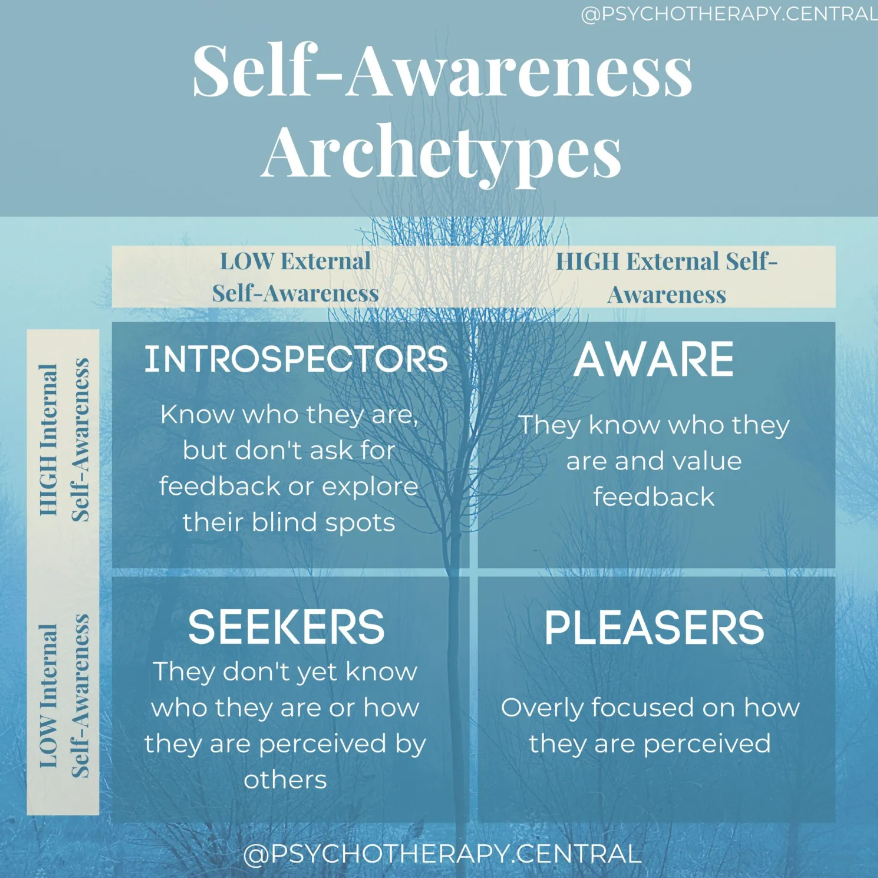
For transformational leaders, this self-awareness is crucial for several reasons:
Authenticity
Self-aware leaders are in touch with their true selves. They are genuine and authentic, which creates a sense of trust and credibility among their peers, followers, and teams. When people perceive a leader as genuine, they are more likely to engage and follow willingly.
Emotional Intelligence
Transformational leaders need to connect with their followers on an emotional level. By understanding their own emotions and reactions, these leaders can better relate to the emotions of others. This empathy and emotional intelligence enable leaders to effectively communicate, support, and motivate their team members.
Adaptability
Self-aware leaders are more adaptable because they have a clear understanding of their strengths and weaknesses. They can leverage their strengths to drive positive change and innovation while also seeking help or delegating tasks in areas where they may not excel. This adaptability is essential in an ever-changing business landscape.
Conflict Resolution
Conflict is inevitable in any group or organization. Self-aware leaders can handle conflicts more constructively by recognizing their own biases, triggers, and emotions. This awareness allows them to approach conflicts with a level-headed perspective and find resolutions that benefit the team as a whole.
Continuous Learning
Transformational leaders view themselves as a work in progress. They are open to feedback and actively seek opportunities for personal and professional growth. This mindset of continuous learning sets a positive example for their team members, encouraging them to embrace growth and development as well.
Influence and Inspiration
Leaders who understand their values and motivations can effectively communicate their vision to their team. This clear articulation of purpose inspires others to rally behind common goals, fostering a sense of shared purpose and dedication.
Resilience
Self-aware leaders are better equipped to cope with challenges and setbacks. They understand their stressors and can employ coping mechanisms effectively. This resilience not only helps leaders persevere but also encourages their team members to stay focused and motivated during tough times.
Ethical Decision-Making
Self-awareness includes understanding one’s ethical compass and values. Leaders who are in tune with their ethical beliefs are more likely to make principled decisions, even in difficult situations, which contributes to a culture of trust and integrity.
In essence, self-awareness serves as a cornerstone for transformational leadership. It enables leaders to build stronger connections, make informed decisions, and create an environment where individuals can thrive and reach their full potential. By embarking on a journey of self-discovery and introspection, transformational leaders lay the groundwork for their own growth and the growth of those they lead.
Source: Next Element
The Crucial Link Between Self-Awareness and Leadership Style
The link between self-awareness and leadership style is crucial as it fundamentally shapes how leaders interact with their teams and influence their organizational environments. Here’s how self-awareness and leadership style are interconnected:
1. Style Alignment: Self-awareness helps leaders understand their natural tendencies and preferences. This awareness enables them to align their leadership style with their authentic selves, rather than trying to emulate others. A leader who knows their strengths and weaknesses can choose a style that leverages their strengths and mitigates their weaknesses.
2. Adaptation: Self-aware leaders can adapt their leadership style based on the needs of the situation and the individuals they’re leading. They recognize that a one-size-fits-all approach might not work and can modify their style to accommodate different personalities, tasks, and challenges.
3. Emotional Intelligence: Self-awareness is a cornerstone of emotional intelligence, which is critical for effective leadership. Leaders who understand their own emotions and triggers are better equipped to empathize with the emotions of others. This empathy fosters better communication, conflict resolution, and relationship-building.
4. Decision-Making: Self-awareness helps leaders make better decisions by understanding their biases, motivations, and values. This awareness enables them to make choices that align with their core principles and the best interests of their team and organization.
5. Communication: A self-aware leader understands how their communication style affects others. They can tailor their communication to be more effective, ensuring that their messages are clear, respectful, and well-received by their team members.
6. Feedback Receptivity: Self-aware leaders are open to feedback from their team members, peers, and mentors. They recognize that feedback provides valuable insights into their leadership style’s impact and areas for improvement.
7. Building Trust: Authenticity is a hallmark of self-aware leadership. When leaders are authentic and true to themselves, it fosters trust among team members. Trust, in turn, leads to stronger relationships and a more cohesive team.
8. Growth Mindset: Self-aware leaders embrace a growth mindset, which encourages continuous learning and development. They actively seek opportunities to refine their leadership style, adapt to changes, and stay relevant in a dynamic environment.
9. Conflict Resolution: Self-awareness helps leaders manage conflicts effectively. By understanding their role in conflicts and recognizing their emotional responses, they can approach resolution with a calm and rational perspective.
In essence, self-awareness is the foundation upon which a leader’s style is built. It empowers leaders to understand themselves deeply, make intentional choices, and cultivate relationships that drive success. Self-aware leaders are more adaptable, empathetic, and effective in their roles, as they bring an authentic and well-informed approach to their leadership style.
What can happen if a leader is not self-aware?
If transformational leaders lack self-awareness, several negative consequences can arise that can hinder both their leadership effectiveness and the growth of their teams and organizations.
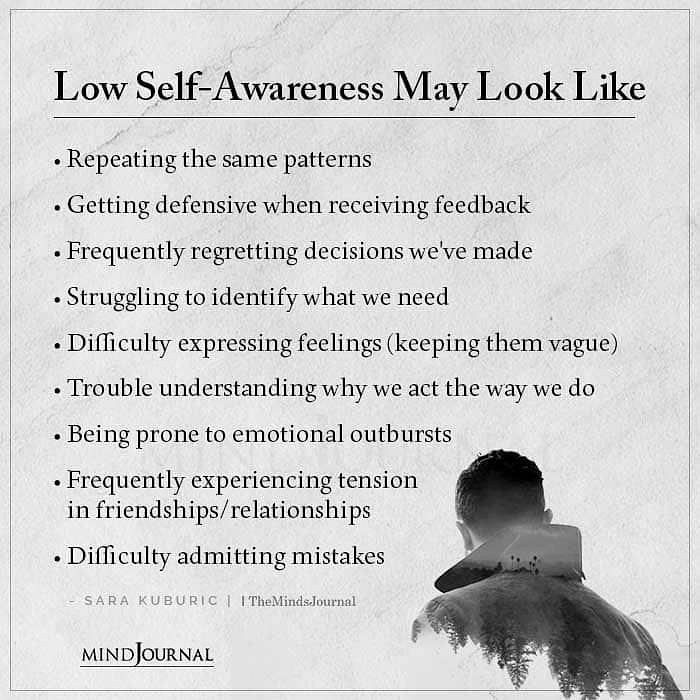
Here are some potential outcomes:
• Inauthenticity: Self-awareness is crucial for authenticity in leadership. Without self-awareness, leaders might project an image that doesn’t align with their true selves. This can lead to a sense of mistrust among team members who may perceive the leader as insincere or lacking in integrity.
• Limited Emotional Intelligence: Transformational leaders are known for their ability to connect with and inspire their teams emotionally. Without self-awareness, leaders may struggle to understand their own emotions, let alone empathize with others. This can lead to poor communication, difficulty in handling conflicts, and an overall lack of emotional resonance with team members.
• Ineffective Communication: Self-awareness is essential for effective communication. Leaders who lack self-awareness might not recognize how their words and actions impact others. This can lead to misunderstandings, misinterpretations, and a failure to effectively convey their vision and goals.
• Missed Growth Opportunities: Self-awareness drives personal growth and development. Leaders who are not self-aware may stagnate in their leadership abilities, missing opportunities to refine their skills, adapt to changes, and lead their teams through innovation and challenges.
• Poor Decision-Making: Self-aware leaders are better equipped to make informed decisions that align with their values and the organization’s goals. Without self-awareness, leaders might make impulsive or ill-informed decisions that could negatively impact the team or organization.
• Lack of Adaptability: Transformational leaders need to be adaptable in a dynamic environment. Self-awareness enables leaders to recognize when they need to adjust their approach. Without it, leaders may be resistant to change or unable to identify when their current methods are no longer effective.
• Loss of Trust and Confidence: Team members look to transformational leaders for guidance and inspiration. Without self-awareness, leaders might make mistakes, exhibit inconsistency, or fail to acknowledge their shortcomings. This can lead to a loss of trust and confidence from their team members.
• Difficulty in Building Relationships: Transformational leadership relies on building strong relationships based on trust and respect. Self-awareness helps leaders navigate interpersonal dynamics. Without it, leaders might struggle to connect with team members on a personal level.
• Resistance to Feedback: Self-aware leaders actively seek and value feedback from others. Leaders lacking self-awareness might be resistant to feedback, hindering their growth and preventing them from making necessary improvements.
• Limited Personal Fulfillment: Leadership can be personally fulfilling when leaders align their actions with their values and goals. Self-awareness is essential for finding this alignment. Leaders who lack self-awareness may find themselves unfulfilled and disconnected from their roles.
In essence, lacking self-awareness can undermine the very essence of transformational leadership, which thrives on authenticity, emotional intelligence, and personal growth. Without self-awareness, transformational leaders risk becoming disconnected from their teams and failing to create the positive and impactful changes they aim for.

Case Study: Steve Jobs’ lack of Self Awareness
A famous leader known for lacking self-awareness at times is Steve Jobs, the co-founder and former CEO of Apple Inc. While Jobs was undoubtedly a visionary and innovative leader who played a pivotal role in revolutionizing technology and design, there were instances where his lack of self-awareness led to challenges in his leadership style.
One notable example of Steve Jobs’ lack of self-awareness is his handling of the initial iPhone price drop in 2007. When Apple released the first iPhone, it was priced at $599. However, just a few months later, Jobs announced a significant price drop to $399. This move upset many early adopters who had paid the higher price, leading to a public relations backlash.
Jobs responded to the backlash by writing an open letter titled “A Letter from Steve Jobs” on Apple’s website. In the letter, he addressed the price drop but displayed a lack of empathy and self-awareness regarding customers’ concerns. He famously wrote, “This is life in the technology lane,” implying that price drops were a normal occurrence in the industry.
While Jobs’ intention might have been to explain the business rationale behind the decision, his tone and lack of acknowledgment of customers’ feelings came across as dismissive. This incident highlighted his tendency to prioritize innovation and the company’s goals over customer satisfaction and perception.
Jobs’ lack of self-awareness in this situation led to negative press and criticism, tarnishing Apple’s reputation temporarily. Over time, Apple recovered from the incident due to the continued success of its products and innovations. Nonetheless, this example underscores how even visionary leaders can sometimes overlook the emotional and psychological aspects of their decisions, which are critical in maintaining positive relationships with customers and stakeholders.
It’s important to note that Jobs’ leadership style evolved over the years, and he learned from his mistakes. He became known for being more empathetic and collaborative in his later years at Apple, which contributed to the company’s sustained success.
Embracing Round Wheels: Navigating Leadership with Purpose
When people refer to leaders as having “square wheels,” they are using a metaphor to describe leaders who are outdated, rigid, resistant to change, or ineffective in their approach. The metaphor draws on the image of a vehicle with square wheels – a configuration that would result in a bumpy and inefficient ride.

Source: LinkedIn
In the context of leadership, describing someone as having “square wheels” suggests that the leader is not adapting to new challenges, technologies, or changes in the environment. Such leaders might be clinging to traditional methods that are no longer effective, resisting innovation, or failing to recognize the need for flexibility and agility.
Overall, calling a leader “having square wheels” is a way of highlighting their lack of adaptability and responsiveness, indicating that they are not keeping up with the evolving demands and expectations of their role or organization.

Exercise 1.2: How Effective is your Leadership Style?
• How effective is your Leadership Style—are you holding onto square wheels?
• Are you aware of the impact of your Personal and Leadership Style and Skills on those around you?
• Where have you remained committed to your square wheels without conscious intention?

Course Manual 3: Completion of the Leadership Skills Inventory
In a moment you will complete Dr. Keis’s assessment the Leadership Skills Inventory-Self.
If credibility and self-awareness are foundational to leadership success you being aware of your own skill levels is critical to your leadership development. The balance of the next 12 months will be explaining, practicing and developing each of the 12 principles and 60 skills.
Upon completion you will get instant results and able to download your personalized PDF report.
It will take you about 30 minutes to complete this assessment.
Just insert your name and email address you can immediately begin the assessment.

Course Manual 4: Developing the Whole Leader: You!
“I want freedom for the full expression of my personality.” – Mahatma Gandhi
Becoming a Transformational leader starts with developing all of you. We started to discuss self-awareness but this incudes your leadership and personal style and several other factors that make up what you bring as a leader to the playing field. To be a successful leader means deliberately developing the whole person. But how does one go about doing that? Well, it starts with learning the art and science of digging deeper into understanding yourself, and at the same time you learn about the others you are leading.
Are We Nature or Nurture?
Are we a product of nature (born that way) or nurture (input from our environment)?
The answer is Yes. We are a combination of both nature and nurture.
Have you ever completed a personality assessment that ended up boxing you into a specific type? Did you feel trapped by the results? Most personality assessment test designers do not honor the whole person and fail to acknowledge in their methodology that we are both nature and nurture.
Each person is born with many parts that form the whole (nature); we gain knowledge and beliefs (nurture) as we live our lives.
The Uniqueness of You
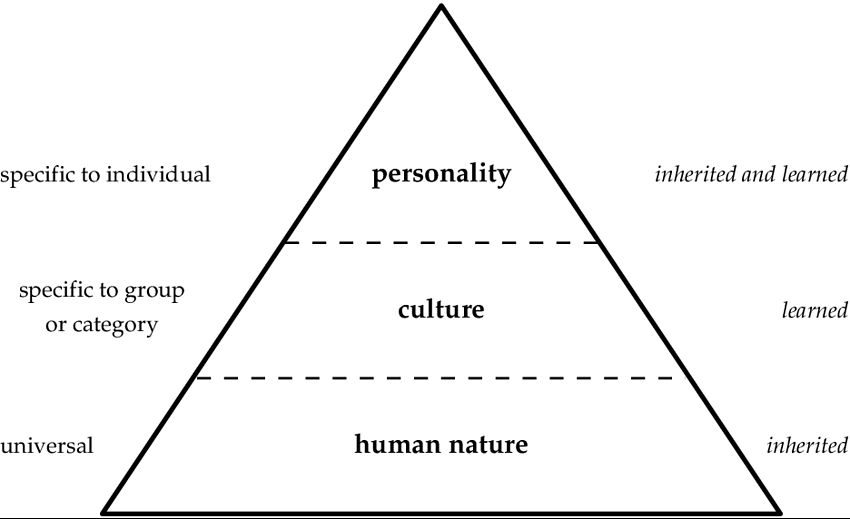
Source: www.researchgate.net
Your personality is exclusive to you alone. No one else in the history of time has been or will be exactly as you are.
To turn out the same way you have, other people would have to live your life exactly as you have lived it. They would need to possess, from the moment of conception, the same genes that determine—among other things—the color of your eyes, the shape of your ears, and the texture of your hair. They would have to be brought up under exactly the same conditions you experienced in childhood, play all the games you played, suffer all the falls you took, and learn all the lessons you learned.
In fact, they would need to experience everything in precisely the same way you have to produce a person with your unique hopes, fears, desires, values, and characteristics. Even then, your gifts, talents, and abilities are genetically yours; there is little likelihood any two leaders will ever be exactly the same.
During an episode of Star Trek: The Next Generation, Commander Riker was beamed up from the surface of a planet. Unknown to the crew, a mirror image of Commander Riker was reflected back to the surface.
Up to that point, the two were identical leaders in every way. For the next five years, however, the second Commander Riker survived under hostile conditions on the planet. When The Enterprise returned and discovered the second Commander Riker, it was clear the men were no longer identical. Their experiences over the five years had shaped them differently, even though they were clones when the duplication occurred. This demonstrates that every event in our lives uniquely shapes us.
But just before we get into the explanation of these different factors – we would like you to think about not only how all these factors are affecting you and your leadership style and character, but also how all these factors are influencing every individual that you lead, follow, or interact with. You can’t be a Deliberate Leader – if you are ignorant or unaware. We encourage you as you read through this chapter – that being a Deliberate Leader means you are not only a student of self but diligent in the study of human behavior and how ALL these contributing factors are shaping the responses of everyone else around you – from work to home and everyone in between.
It is extremely difficult to assess just how important any one factor has been in creating your personality. How much weight can be given to any single factor?
There’s no simple answer, and the presence of several factors makes it all the more complex. One of the factors that has influenced—and continues to affect—your personality is your Personal Style, as briefly mentioned in the previous chapter.
To further explain Personal Style’s special influence, let’s examine the role it plays in your life.
Your Personal Style is the foundation for your leadership and interpersonal style; the totality of you as a person is called your PERSONALITY
Your Personal Style strongly affects everything you choose to do and the way you choose to do it. Even though you may have learned how to display behavior that is unrelated to your Leadership/Personal Style, your style always has an impact on your decision-making; it serves as a filter system through which all your learned behavior must pass.
All the inputs, conditions, characteristics, and socially learned and expected behaviors you have acquired, plus your Personal Style, combine to create your unique Personality.
To acknowledge people’s diversity and provide a framework for development and understanding of self and others, we created the Personality Development Factors Model.™

A Holistic Approach to Your Personality Development
You will notice the three factors in the top half of the model are called Internal Factors; they affect your personality “from within” because they emanate directly from inside your body or mind. The factors in the bottom half are called External Factors; they are more dependent on stimulation from phenomena “from outside” yourself.
These factors represent the different kinds of influences present to some extent in the lives of all human beings, regardless of gender, race, or culture. The strength of the influence coming from factors within each of the categories may vary for each individual.
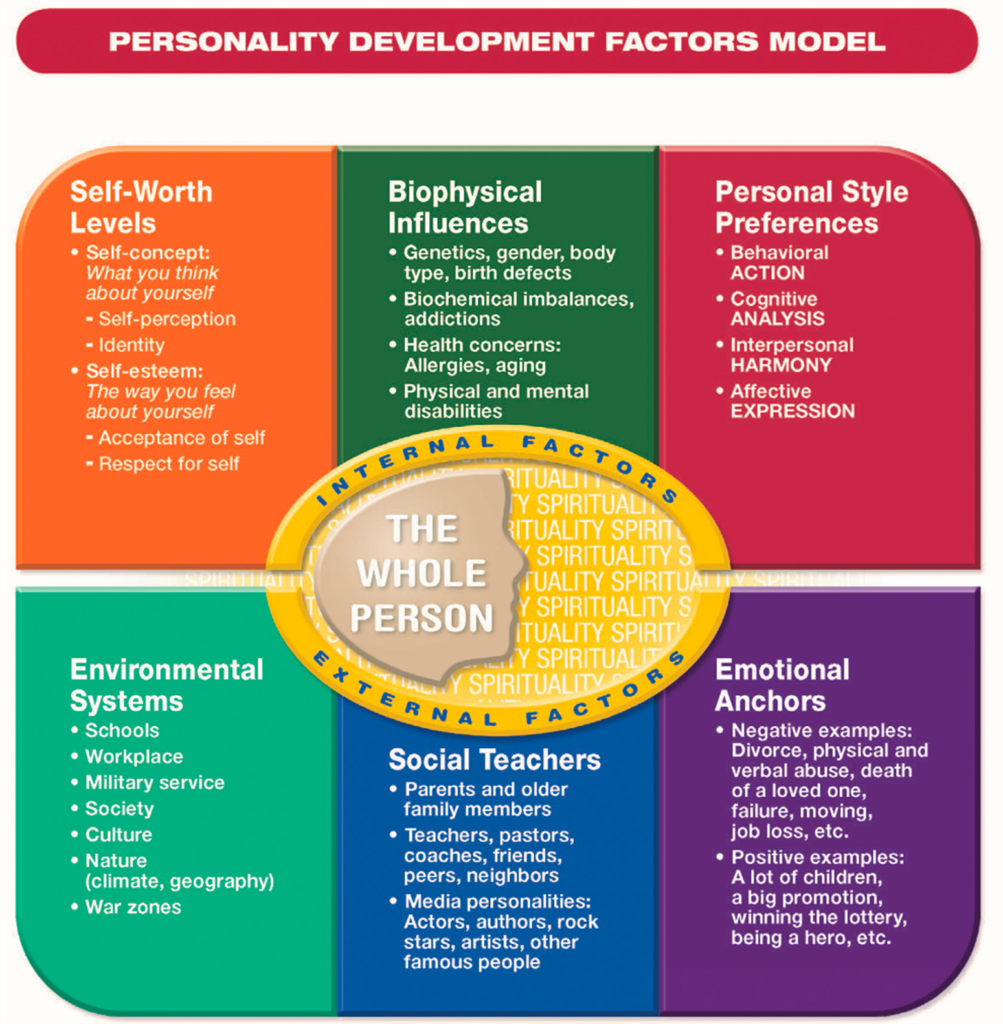
Let’s look at each factor in the model and examine how each influences your personality development and that of others. Starting from the top-right corner of the model and moving counter-clockwise, the first factor is Personal Style Preferences.
Personal Style Preferences
We will cover this in-depth for you in the next Module. Personal Style defines the naturally occurring preferences people have for engaging with whatever they find in their environment—their unique and consistent ways of reacting to their surroundings. Their preferences are reflected in their various needs, wants, and values.
The origin of these preferences is unclear, but recent scientific research is offering some clues. Based on conclusions drawn from studies of the functions of various parts of the brain, Personal Style may be closely related to different types of information-processing within the brain. Personal Style is observable very early after birth; that suggests our preferences are genetically-based.
If indeed Personal Style is natural, then likely it is strongly related to biochemical functioning in the brain.
It should be noted, however, that the question of whether Personal Style is an inherited trait remains open; children often possess styles quite different from the styles of their parents, and siblings can have opposite styles. Some research attempts to link Personal Style to birth order, but that cannot easily account for discrepancies, such as why all first-born children do not fit the same patterns.
We do know children reveal a Personal Style that will remain unchanged throughout their lives; the style a person has at age two will be evident at age 80.

Personality is the totality of who you are.
Personal Style is just one part of you—an important part, nevertheless.
We also know that each individual tends to process information (think) in a distinct way. That means that although people see and hear the same information, they may interpret the information differently. Those interpretations are called perceptions.
Mitch had a 1967 Mercedes-Benz and one day decided to modernize it a bit. He adjusted the seats’ dimensions, updated the stereo system, installed new flooring, painted from the inside out, and replaced lights, tires, and some engine components. He kept the body or the frame of the car as it was.
The body and the frame represent your Personal Style—constant and unchanged. The inside changes reflect the constant upgrades created by your beliefs, your experience, your thoughts, your education and learning, the significant events in your life, and so on.
• You were born with the part of your personality we call Personal Style, and your Personal Style does not change over time.
• Other parts of your personality do change through learning and experience.
As a result, your personality has both flexibility and stability throughout your life
Biophysical Influences

Source: SlidePlayer
Biophysical influences are the elements of our physiology and/or chemistry of our body that influence our personality.
In 1988, Dr. Keis was moody and had severe emotional swings. One minute he was motivated and excited, the next he just had to go to bed and sleep. His doctor said he was manic- depressive and put him on the antidepressant lithium. About a week into treatment, he was ready to crawl right out of his skin—he was irritable and was worse than before treatment.
A friend said, “Ken, you don’t have a depression problem. It sounds more like a biophysical condition.” At his insistence, the doctor conducted a glucose tolerance test (GTT). (After giving you pure sugar to drink, they draw blood every 30 minutes for 6 hours, to measure glucose levels in your bloodstream.)
The test revealed Ken had extreme hypoglycemia, a blood sugar condition. When he consumes sugar, his pancreas does not produce insulin in the correct proportion, which causes all kinds of complications. Because of the wild swings in his blood sugar, his personality became significantly different. It was a biochemical state. It had had nothing to do with depression.
That is a simple illustration of how something can affect our biophysical system and have a big impact on our life. A more serious illustration of the way biophysical influences impact personality is found in the area of addictions. It is proven that heavy and repeated alcohol and/or drug use can be very detrimental to your overall health, even causing brain damage, which can result in permanent personality shifts or changes.
Our biophysical influences can cause each of us to engage life differently. In the Biophysical factor, we include any and all biological and physical influences on your personality and on your body that occur during your lifetime.
Many years ago Ken had a staff member whose performance was so varied that he thought there were two different individuals coming to work each week. It was not long into this staff member’s employment that Ken figured out that his new staff member was an alcoholic. By not paying attention to the right clues it could have been easy for Ken to make incorrect assumptions about the reasons for his staff member’s poor performance.
It is therefore essential for you as a Deliberate Leader to be fully awake and aware of what is going on in your surroundings (including biophysical conditions of yourself and your team members) if you genuinely want to make a difference in this world.
Even before we are born, factors such as our genetic inheritance from our parents are at work, determining a host of physical characteristics such as our gender, height, and skin color. Any and all biochemical changes that occur within the body fall into the Biophysical category.
Doctors and naturopaths focus most of their attention on the elements of the biophysical factor. Biophysics is the “window” through which they tend to look at personality and behavior. They have strong evidence that the mind-body connection is one of the most important links to understanding human behavior.
Let’s say you are a healthy and vibrant person and you get the flu. How differently will you engage with the environment? During that period, friends call with an invitation to a party but you decline because you are not up to it; you choose to stay home. Once you recover from the flu, your personality goes back to normal.
Other Elements under Biophysical Influences that can Influence Personality and Behavior:
Recently, medical doctor Don Colbert said that in North America, no health care system can support our current lifestyles; we have such poor wellness levels. At the time of this writing, 42% of the population (in North America) are obese, and over 70% of people are overweight and unfit.
Even if you had a personal style and personality that wanted to be active, high energy, and an engaging inspiring leader, it would not be possible if you had biophysical conditions that would not permit it. How can a person play sports or be active with his kids if he gets winded simply walking across a room?
Some might ask the question, what does wellness have to do with leadership? Lots! Our moods, our energy, irritability, resilience, and our cognitive abilities are strongly linked to our overall wellness levels. To realize your potential as a leader and your team you must take into consideration our biophysical condition.
Later in this course we will go in-depth into your stress levels and wellness and mental health strategies.

Self-Worth Levels
Two people could have a similar Personal Style but if one has high self-worth and the other has low self-worth, they could respond differently to similar events.
• Self-worth is the part of the human personality that determines personal value and importance.
• It is the area of our thinking that evaluates our behavior, appearance, feelings, thoughts, and abilities.
• It outlines both the level of appreciation we have for ourselves and the way we feel about our inherent worth—what we believe we need to be or do to have value as a person.
• Self-worth levels highly influence the impact and ability of leaders.
Does it really matter if your sense of personal value (self-worth) is high or low?
The answer is yes, absolutely!
Image: Who determines your self-worth?

Source: Kilmann Diagnostics
Self-worth is a basic human need that is essential to normal, healthy development. High self-worth helps provide flexibility, strength, and a capacity to regenerate. It relates to increased levels of mental health, life success, and happiness.
Research has shown that leaders with lower self-worth have a lesser ability to contribute to society than people with higher self-worth. Low self-worth undermines all areas of human interaction, leadership and diminishes hardiness in the face of life’s problems. Low self-worth can stunt psychological and emotional growth.
Our level of self-worth is an extremely powerful factor in our personality development and leadership behaviors. It represents the important role that our feelings about ourselves play a role in determining aspects of our personality. Our sense of security is linked directly to our level of self-worth.
The majority of research overwhelmingly supports the opinion that there are strong overall benefits to having high self-worth.
Self-worth is not only a source of motivation and personal energy to engage life; it reveals areas of psychological vulnerability. Dr. Nathaniel Branden, author and researcher of Our Urgent Need for Self-Esteem, sums up our thoughts in this quote (note: as you read this quote think about how important high self-worth is in order to be an effective and deliberate leader).:
Self-worth provides the experience of being able to cope with the basic challenges of life and being worthy of happiness. It consists of two components:
1. Self-Efficacy: Confidence in our ability to think, learn, choose, and make appropriate decisions
2. Self-Respect: Confidence in our right to be happy and the belief that achievement, success, friendship, respect, love, and fulfillment are appropriate to us
The basic challenges of life include fundamentals such as these:
• The ability to earn a living.
• The ability to take independent care of ourselves in the world.
• The competence to form human relationships that are mutually satisfying.
• The resilience that allows us to bounce back from adversity and persevere in our aspirations.
• The ability to handle the pressures and responsibility to lead others.
Think about it for a moment. What high self-worth traits in the above list would not be critical to being a Transformational Leader? None, right? They are all important.
Most of the research suggests that our self-worth is in constant flux, changing in response to the many dynamics that present themselves in our lives personally and professionally. We never achieve high self-worth permanently; we are always actively re-establishing it during our entire lifetime.
We see a fluctuation of self-worth in leaders who are laid off or fired from long-term positions or when personal relationships fail. In numerous cases, seemingly high self-worth leaders can fall apart.
It is possible to reduce the impact that various events could have on an individual’s self-worth levels, if the person understands the situation and has specific approaches for maintaining and increasing self-worth levels.
As self-worth goes up, so does our sense of trust that somehow we can cope with the environment. When it decreases, we lose confidence that we can be successful in our environment.
For instance, a person with a high level of self-worth may overcome a negative environment and become successful, while a person with a lower level of self-worth may fail within positive surroundings.

Case Study: Serena Williams and Self-Worth in Sports
Background: Serena Williams is one of the most accomplished and celebrated tennis players in history. Throughout her career, she has faced numerous challenges, including injuries, intense competition, and public scrutiny. Despite her exceptional achievements, Serena has openly discussed her struggles with self-doubt and self-worth.
Situation: During the 2018 US Open Women’s Final, Serena Williams faced off against Naomi Osaka. The match became highly contentious due to a series of code violations and disagreements with the chair umpire. Serena received a coaching violation, a point penalty for smashing her racket, and a game penalty for verbal abuse directed at the umpire.
Outcome: Serena’s struggles with self-worth and external pressure played a role in her emotional response during the match:
1. Coaching Violation: Serena’s coach made hand signals from the stands, which led to a coaching violation. Serena was upset by the implication that she needed coaching and felt it was a reflection on her abilities as a player.
2. Racket Smash and Point Penalty: Frustrated by the coaching violation, Serena smashed her racket on the court, resulting in a point penalty. Her emotional response demonstrated her intense investment in the match and her frustration with the perceived unfair treatment.
3. Verbal Abuse and Game Penalty: After receiving the point penalty, Serena confronted the umpire and expressed her anger. She called the umpire a “thief” for taking a point from her, resulting in a game penalty. Serena’s emotional outburst was indicative of the stress and pressure she felt in the moment.
Resolution: Serena’s emotional response during the match drew significant media attention and debate. While the incident was widely discussed, it also sparked conversations about the pressures faced by athletes and the role of self-worth in high-stakes situations.
In interviews following the match, Serena discussed how her strong desire to win and her concern for her daughter’s perception of her behavior contributed to her emotional response. She acknowledged her struggles with self-doubt and the internal pressure to excel on and off the court.
Lessons Learned: Serena Williams’ case illustrates how even accomplished individuals can grapple with self-worth issues and emotional responses in high-pressure situations. Her experience highlights the challenges of managing external expectations, personal standards, and the desire for success. The case serves as a reminder that self-worth and emotional well-being can play a significant role in determining outcomes in competitive environments.
Note that self-worth is learned. It does not exist at birth.
In our opinion, most self-worth is a product of nurture, not nature. It develops in us during very early childhood. It is strongly affected during adolescence and adulthood as people and events react to our personalities and behavior.
To some extent, self-worth is developed by factors in all the other categories. It is especially influenced by factors within the social-teacher category. We come to behave toward ourselves in much the same manner that significant others have behaved toward us.
For instance, if parents are persistently critical about what they consider to be failings or imperfections in their children, when the children become adults they may have difficulty appreciating the skills and the attributes that they possess as a leader.
The same holds true of a leader who consistently criticizes his or her staff. Not only does this behavior erode the self-worth of the staff member; typically it is poorly developed leaders with low self-worth who make these types of offenses.
If the reactions of significant others are positive toward who we are and what we do, our self-worth levels begin to increase and strengthen. If their reactions are negative, we can become weaker and our sense of value as a person decreases.
While the foundations of our self-worth can be established as young as age seven or eight, the fact remains that in the mind, each individual is in a constant state of self-evaluation of his or her worth.
The important point to remember is that our self-worth levels are learned and whatever has been learned can be unlearned
Note: Personal Style theory can be a major advantage in building self-worth. We have found it affirms leaders about who they are. Thus, they can change their unreasonable or erroneous expectations and simply accept—and be—themselves.

Environmental Systems
This category includes any form of experiential stimulus we receive from the environment around us—a stimulus that does not belong specifically in any of the other categories. That includes all the general influences we experience in our lives as a result of being members of certain social, cultural, and ethnic groups.
It also refers to any form of environmental stimulus, other than the influence of people who have functioned in some way as significant role models for us. For instance, while a person’s whole family unit would be included here, the role played by a specific relative would belong in the social-teacher category.
We are strongly influenced by the environmental systems that surround us as we grow up. The first such system is our family of origin—the family unit in which we are raised from birth to young adulthood.
In looking into the environmental-systems category, we are interested in how your personality was affected by your exposure to, as well as your observations of, the interactions of your family.
Children are often the family’s audience. Much of our childhood time is spent watching what is occurring within the family unit, rather than actively participating in it.
Your leadership style is influenced by this category: we are interested in information such as how Mom and Dad communicated, problem-solved, argued, made up after an argument, showed affection, discussed important issues, and even how we took vacations.
Also important are other interactions within the family, such as how an older brother got along with Mom, a younger sister with Grandpa, or Dad with his in-laws. All those kinds of everyday family interactions created an environment that shaped our perceptions of, and attitudes toward, family life and—more important—life and people in general.
The fact that over half of marriages end in divorce has fragmented families, leaving a negative environmental experience for many children – who then grow up to be tomorrow’s leaders.
Other environmental systems include schools you have attended, towns or cities where you lived, the countryside where you grew up, the society and cultures that influenced you, military service, and associations and organizations to which you belonged.
The following factors are examples of Environmental Systems.
Social Teachers
Social Teachers can be anyone who influences us, including our family members, and they have a large impact on our personality.
I had a friend Mitch grew up in a poor family and was taught to work hard from his very early days, from delivering newspapers early in the mornings, pumping gas after school each day, washing the neighbors’ cars on weekends and other ventures. When he came to the US as a teenager, he thought it was natural to be working three jobs while going to school. In every position he has held since, he has put 100% into his efforts, no matter the working conditions or the pay being offered. In this situation, Mitch’s parents were his social teachers, and the work ethic they instilled into his mind long ago is something he carries to this day.
So how have your social teachers shaped you?
Social Teachers are the people we imitate . . . anyone who has had a direct or indirect influence on the way we currently perceive, approach, or interact with the environment. Those influences can be positive or negative. For instance, copying the conduct of social teachers has been shown to influence a broad range of behavior, from aggressiveness in children to the way children reward their own performances.
This social learning process is called modeling. We use other people as role models and develop an understanding of which behavior is desirable and which should be avoided.
Frequently, the learning occurs indirectly and often without our being aware of it.
Much of the way we behave and lead on a daily basis is learned from watching and imitating other people’s behavior
The American Academy of Pediatrics (www.aap.org) confirmed that a child’s input reflects his or her output. Social teachers can be video games, social media, music, and the like. Exposure to media violence through television, movies, music, and video games can contribute to a variety of physical and mental health problems for children and adolescents, including desensitization to violence and aggressive behavior, nightmares, fear, and depression. Here is their statement:
American Academy of Pediatrics
Music plays an important role in the socialization of children and adolescents. Popular music is present almost everywhere, and it is easily available through the radio, various recordings, the Internet, and new technologies, allowing adolescents to hear it in diverse settings and situations, alone or shared with friends.
Parents often are unaware of the lyrics to which their children are listening because of the increasing use of downloaded music and headphones. Research on popular music has explored its effects on schoolwork, social interactions, mood, and effect, and particularly behavior.
The effect that popular music has on the behavior and the emotions of children and adolescents is of paramount concern. Lyrics have become more explicit in their references to drugs, sex, and violence over the years, particularly in certain genres. A teenager’s preference for certain types of music could be correlated or associated with certain behaviors.
As with popular music, the perception and the effect of music video messages are important, because research has reported that exposure to violence, sexual messages, sexual stereotypes, and use of substances of abuse in music videos might produce significant changes in behaviors and attitudes of young viewers. Pediatricians and parents should be aware of this information.
Furthermore, with the evidence portrayed in these studies, it is essential for pediatricians and parents to take a stand regarding video content and music lyrics.
Input Equals Output
The social-teacher category includes the people who raised us from birth—in most cases, our parents. It includes other family members with whom we frequently came into contact, especially those who are older than we are. That would include all our peers while growing up and other significant individuals such as teachers, pastors, and athletic coaches.
But this also includes media personalities, historical figures, authors, sports celebrities, and movie stars might be included in that category if they had a significant impact on our thinking and behavior.
A list of social teachers who might have had some lasting impact upon our thinking, personality, and behavior include the following:
Even today, your values are being shaped and influenced by the input you are allowing into your space and mind
It’s time to be brutally honest with yourself.
Who are you allowing as input or social teachers for yourself and/or your family?
• What kind of books or magazines did you buy—if any—last month? Are they positive and educational or frivolous, like People and the National Enquirer?
• If we looked at your library, what would we find?
• What about other media—TV, music, DVDs, podcasts, movies? What was the content? How much time did you spend in each of those media? North Americans watch 5+ hours of TV a day. That’s a lot of input.
• If you have children, what input are you allowing them to absorb?
• What about family and friends? Can you educate them on the impact of the input they are allowing into their lives?
Even if both of us have identical Personal Style preferences, we can have different values because of our social teachers. One of us could be a police officer, the other a criminal.

Emotional Anchors
This category consists of any experience that has in some way caused us a strong emotional recall or response—positive or negative. After a major event shocks or affects our systems, we are never the same again. The memory of it penetrates beyond our reasoning into our subconscious and leaves us “different” from who we were before the event happened. Growing up on the dairy farm, Ken and his family were always conscious of safety around farm equipment. His father was harvesting silage—cutting grass for winter storage.
One day after school, Ken hitched a ride in one of the silage wagons that had chains and sharp spikes for unloading the silage (feed for cattle) at the storage location. The driver pulled the silage wagon up to a powerful blower that threw silage six stories high. In the process, he had forgotten Ken was in the silage wagon. He had already turned on the belt that fed the blower and was about to turn on the silage wagon. He knew Ken had to get out of the wagon or he would be injured or killed.
As Ken jumped out, he slipped onto the conveyer belt that fed into the blower. He was two seconds away from death when a hired hand pulled him off the belt. Needless to say, he never rode inside another silage wagon.
That experience is an emotional anchor for Ken. It has made him extremely safety-conscious and cautious around any type of equipment.
Emotional experiences may not start out negatively, but they can end up that way. For example, a woman who gives birth to triplets may be overjoyed at first, but due to the extra amount of work involved in taking care of three infants, she might end up feeling quite resentful because she has no time to herself. While she loves each one of the children, the overall experience has become an emotional anchor.
Notice we said might end up feeling resentful. The same experience may not have the same effect on another individual. For instance, one person who has been in a very serious auto accident may be emotionally scarred for life, whereas another person may quickly get over the accident and still enjoy driving.
A few years ago, a firefighter saved a 5-year-old who had fallen into an old abandoned well. That seemingly simple act of courage turned into a disaster for the firefighter.
As media outlets from around the world called to interview him, he began to get attached to the attention. Before long, his attitude (ego) toward his colleagues became too hard to handle and he was fired from his position. Even his family abandoned him, leaving him with nothing. A seemingly positive event turned into a negative emotional anchor.
An emotional anchor is any event or memory that causes a strong emotional response—positive or negative
The main point is that after we have an intense emotional experience, our personalities and behavior can change in some way; we do not remain the same.
Are you aware of how you have been affected by your experiences?
Examples of Emotional Anchors
• Negative possibilities: Divorce, physical abuse, death of a loved one, failure, moving, job loss, natural catastrophes
• Positive possibilities: Raising a lot of children, a promotion to your dream job with much more responsibility, winning the lottery, a new promotion, becoming a hero
• Each individual will respond uniquely to events. Some will be traumatized; others will not. Don’t try to judge a situation’s impact on another person by the way those experiences might affect you.

Spirituality
In the Personality Development Factors Model, in the center you will notice the facial profile of a person. Beside the profile, the word Spirituality is written many times. Spirituality is part of our model because we recognize that a person’s beliefs and spiritual perspective highly influence behavior, choices, values, and life satisfaction.
In the end, each person will make his or her own choice
about Spirituality. People should be respected on their
spiritual journey, but regardless it is an important factor.
Spirituality can be a sensitive issue for some people but there is no way to avoid the subject. If we don’t mention it, we deny each other access to answers that will bring resolution to our true purpose in life—and the base for everything we are and do.
In our Personality Development Factors Model, we are not talking about the humanistic, watered-down version of Spirituality that typically refers to unspecific beliefs. We are referring to the foundational beliefs on which our lives exist and function. That is the deepest level of awareness we can seek to achieve.
Transformational Leaders know who they are at the deepest level of their core. Have you ever worked for a leader who had no idea what they stood for or believed? Their position, plans, and perceptions changed with the tides. How secure or confident did you feel about their ability to lead? More than likely not great. So if you are a leader (and we all are in some capacity in life) how clear are you about your beliefs?
Here is the reality. Confirming and determining your true calling and purpose in your life includes going on a personal quest to find answers about your Spirituality!
• Are human beings Spiritual? How can we know?
• If we are Spiritual, what does that mean? What is the truth on the subject?
• How can I tell spiritual truth from falsehood?
• Does God exist? Who or what is God?
Those questions and the answers you find will help expand, confirm, or challenge your thinking about your Spirituality. The truth will set you free—only if you seek to know it. Approaching the subject with an investigative, inquisitive mindset is important to the process. Of course in the end, you will make your own personal choice.
Our lives operate under natural laws and truths. Regardless of our opinions about those laws, the laws do not change.
One example is gravity. It exists even if we don’t understand or accept it. When people believed the world was flat, their collective opinion did not make it so. The principle of natural law applies equally to Spirituality. Our focus should be on discovering Spiritual truth, not in creating it, because no one can create Spiritual truth—just as no one can create gravity.
We will delve deeper into this later in the course as you flesh out your belief system.
Their spirituality provided hope, grounding, and well-being beyond their circumstances – all characteristics of successful leaders.
All leaders should be respected in their spiritual search process. Each journey is intensely personal, even though the destination is the same—to arrive at a place of Spiritual Truth.
We include Spirituality as part of our Personality Development Factors Model because your beliefs highly influence your choices, leadership and success in life.
As mentioned a moment ago . . . what about you? If you are going to deliberately understand yourself and others, the core of your spirituality matters—and matters deeply—toward your inner peace, your fulfillment, and your ability to positively impact others.
No single Personality Development Factor is more important than another in determining personality and behavior
In real life, any category can override or dominate any or all the other categories at any given time, in any given situation.
When one category dominates the others, the others simply don’t go away. They are still there and can be used to assist a person to increase his or her current level of self-management.
If we are going to be successful Deliberate Leaders, we need to acknowledge and understand that people are complex and diverse. Leaders are made up of a lot of different factors. Our Personality Development Factors Model provides you a holistic framework which acknowledges that each of us could have identical Personal Style preferences, yet we could be quite different leaders, given all the other factors that have influenced—and are currently influencing—our personality.

Exercise 1.4: Personalized Playlist Challenge
1. Writing materials (paper and pens)
1. Introduction (5 minutes): Explain that the goal of this exercise is to create personalized playlists that reflect their individual personalities and emotions. Emphasize that there are no right or wrong answers, and it’s all about expressing themselves through music.
2. Self-Reflection (10 minutes): Ask participants to take a few moments to reflect on their personality, emotions, and life experiences. They should think about what makes them unique and the kind of music that resonates with them during different moods or moments in life.
3. Playlist Creation (15-20 minutes): Instruct participants write down a playlist with a minimum of 5 and a maximum of 10 songs. Each song should represent a different aspect of their personality or emotions. For example, they can choose a song that reflects their:
• Happy and energetic side
• Reflective and introspective side
• Favorite song of all time
• A song that represents their aspirations or dreams
• A song that brings back a specific memory or emotion
4. Playlist Sharing (20-30 minutes): Once everyone has created their playlists, take turns sharing them with the group – you can play these songs for the group! Participants should briefly explain why they chose each song and how it relates to their personality or emotions. This is an opportunity for them to express themselves and share personal stories or insights.
5. Discussion (15 minutes): After each participant has shared their playlist, facilitate a group discussion. Encourage others to ask questions or provide feedback. Discuss commonalities and differences in musical tastes and how they reflect the diversity of personalities in the group.
6. Wrap-up (5 minutes): Conclude the exercise by highlighting the importance of self-expression and understanding each other’s unique personalities. Encourage participants to keep exploring music as a way to connect with their emotions and those of others.

Course Manual 5: Transformational Principles
Now that you have a baseline understanding of the Transformational Leadership Model you will engage in a deeper understanding of each of the principles and your level of embracing, these principles.
In the assessment you were asked your level of agreement with each principle. Now in these follow-up modules we will explain what they are but also you will be asked to rate if your actions and conduct support your agreement level.
Finally, if you are working with other leaders and team members, how might you communicate?
The Power of Leadership Principles
Leadership is a complex and dynamic field, encompassing a wide range of skills, behaviors, and strategies. In the pursuit of effective leadership, it is crucial to have a solid foundation that guides our actions, decisions, and interactions. This foundation is built upon the concept of leadership principles.
Leadership principles are guiding beliefs, values, and philosophies that serve as a compass for leaders, helping them navigate the complexities of their roles and make sound decisions. These principles are the underlying framework that shapes leadership behavior, influences organizational culture, and drives success.
By understanding and embracing leadership principles, leaders gain clarity, purpose, and direction in their pursuit of leadership excellence. Principles provide a solid grounding and a moral compass that guides leaders through the challenges, dilemmas, and opportunities they encounter.
Transformational (Magnus) Leadership principles are not rigid rules or prescriptive formulas. Instead, they provide a flexible framework that allows leaders to adapt their approach while staying true to their core values. They enable leaders to demonstrate authenticity, foster trust, and inspire others to reach their full potential.
In these modules we will delve into a comprehensive exploration of 12 essential Transformational (Magnus) leadership principles. Each principle represents a key aspect of leadership, offering insights, research, and practical strategies for application. These principles are designed to enhance your understanding of effective leadership and provide actionable guidance for your leadership journey.
From recognizing the impact of our actions on others to understanding and meeting the deeper needs of those we lead, from fostering collaboration and trust to embracing a growth mindset, each principle offers a unique perspective on leadership excellence.
We will explore these principles in-depth, examining their importance, providing research-based insights, and offering practical ways to implement them in your day-to-day leadership role. By integrating these principles into your leadership approach, you will enhance your effectiveness, cultivate a positive work environment, and drive success for yourself, your team, and your organization.
Transformational (Magnus) Leadership Principles serve as a compass, guiding leaders through the complexities of their roles and enabling them to make ethical, impactful decisions. They provide the foundation upon which leadership skills are built, influencing every aspect of leadership practice. We would argue and position that without embracing these leadership principles one would not be successful as a leader or in implementing the 60 Leadership Skills to follow in the balance of this book.
Now, let us embark on this journey together, as we uncover the transformative power of these 12 Transformational (Magnus) Leadership Principles and equip ourselves with the knowledge and tools to become exceptional leaders.

Principle One: “Every individual, in every situation, has the capacity to impact others positively or negatively.”
Principle One highlights the fundamental truth that every individual possesses the ability to influence others, either in a positive or negative manner. Recognizing this capacity is crucial for leaders as it emphasizes their responsibility to consider the impact of their actions and behaviors on others. By understanding the importance of their influence, leaders can proactively shape a positive and empowering environment within their teams and organizations.

Numerous studies have demonstrated the significance of individual impact and leadership behavior on team dynamics and organizational culture. For example, research conducted by Harvard Business School professor Francesca Gino revealed that a leader’s behavior significantly affects employee engagement, motivation, and overall team performance. Positive leadership behaviors, such as expressing gratitude, providing support, and fostering a sense of purpose, have been found to create a positive ripple effect within the organization, leading to higher job satisfaction and productivity.
Authors Note: As a leader and reader you will notice the duplication of recommendations to successfully implement or live out each of the Magnus Leadership Principles. It is not our goal to be repetitive or lazy in our recommendations, but rather this affirms that specific positive leadership behaviors have multiple benefits and are rarely singular in its constructive returns. In addition, the implementation recommendations of each principle are assuming you as a leader agree with the principle. If you do not then the applications will not apply to you and your leadership style.

Case Study: Steve Jobs at Apple Inc.
One compelling case study that exemplifies the significance of individual impact and leadership behavior on team dynamics and organizational culture is the story of Steve Jobs at Apple Inc.
Background: Steve Jobs co-founded Apple Inc. in 1976 and played a pivotal role in shaping the company’s trajectory. He was known for his innovative thinking, attention to design, and demanding leadership style. In 1985, he was ousted from Apple after internal conflicts, only to return in 1997 when the company was facing significant challenges.
Impact on Team Dynamics: Upon his return, Steve Jobs began transforming Apple’s team dynamics. He formed a core executive team that shared his vision for innovation, design excellence, and user-friendly products. He instilled a sense of purpose and passion in his team members, driving them to work collaboratively towards ambitious goals.
Jobs had a reputation for setting high standards and pushing his team members to achieve beyond their perceived limits. While his approach could be demanding and sometimes even confrontational, it also inspired a culture of excellence and a commitment to delivering groundbreaking products. He encouraged open debates and encouraged his team to challenge their own assumptions, fostering an environment of intellectual rigor.
Influence on Organizational Culture: Jobs’ leadership had a profound impact on Apple’s organizational culture. He was a driving force behind Apple’s emphasis on creating products that seamlessly blended technology and aesthetics. This design-centric approach was reflected not only in the physical design of products but also in the user experience and packaging. This focus on design excellence became a hallmark of Apple’s identity.
Jobs also fostered a culture of innovation and risk-taking. He encouraged his team to think differently and to challenge industry norms. This led to the development of iconic products like the iPod, iPhone, and iPad, which revolutionized their respective markets. The company’s ability to consistently introduce disruptive technologies was deeply rooted in Jobs’ leadership and his willingness to take bold risks.
Legacy and Lessons: Steve Jobs’ individual impact and leadership behavior had a lasting legacy at Apple. Under his guidance, the company evolved from a struggling tech firm to one of the most valuable and innovative companies in the world. The culture of excellence, innovation, and user-centric design that he cultivated continues to influence Apple’s operations and product development even after his passing.
This case study underscores the profound influence an individual leader can have on team dynamics and organizational culture. Steve Jobs’ ability to inspire, challenge, and guide his team members played a critical role in shaping Apple’s success. It also highlights the importance of aligning leadership behavior with the desired values and goals of the organization, as well as the potential for both positive and negative consequences resulting from a leader’s actions.
Ways to implement Principle One in day-to-day leadership role:
Practice self-awareness
Reflect on your own actions and their potential impact on others. Be mindful of your words, tone, and body language, striving to maintain a positive and respectful demeanor.
Encourage open communication
Create a culture of open dialogue and feedback, where team members feel comfortable expressing their thoughts and concerns. Actively listen to their perspectives, valuing their contributions and fostering an inclusive environment.
Cultivate a strengths-based approach
Recognize and leverage the unique strengths and talents of each team member. Encourage them to use their strengths to contribute to the team’s success, fostering a sense of empowerment and engagement.
Provide growth opportunities
Support the personal and professional development of your team members. Offer training, mentorship, and challenging assignments that allow individuals to enhance their skills and fulfill their potential.
Spread positivity and recognition
Acknowledge and appreciate the contributions of your team members. Celebrate achievements, both big and small, and publicly recognize their efforts. This reinforces a positive and supportive culture that encourages continuous improvement.
By embracing Principle One, leaders can create a positive ripple effect, empowering individuals to recognize their own capacity to impact others and fostering an environment conducive to growth, collaboration, and success.

Principle Two: “Observing the impact of our actions helps us understand the effects of positive or negative leadership and identify opportunities for growth.”
Principle Two emphasizes the significance of self-reflection and observation as key tools for leaders to gain insights into their leadership impact. By taking the time to observe and assess the consequences of their actions, leaders can develop a deeper understanding of the effects of their leadership style and identify areas for improvement. This principle highlights the continuous learning and growth mindset that effective leaders should embrace.

Research suggests that self-reflection and feedback are crucial for leadership development. Studies have found that leaders who engage in self-reflection are more likely to exhibit self-awareness, adaptability, and better decision-making skills. Moreover, receiving feedback from peers, subordinates, and superiors allows leaders to gain valuable insights into their leadership behaviors and make necessary adjustments.
Ways to implement Principle Two in day-to-day leadership role:
• Practice intentional reflection: Set aside regular time for self-reflection. Consider the outcomes of your recent interactions, decisions, and behaviors. Ask yourself how your actions may have impacted others and what lessons you can learn from those experiences.
• Seek feedback: Encourage open and honest feedback from your team members, peers, and supervisors. Actively listen to their perspectives and take their feedback into consideration. Recognize that feedback, even if critical, presents an opportunity for growth and improvement.
• Keep a leadership journal: Maintain a journal to record your reflections, observations, and insights. Document instances where your actions had a positive impact or where adjustments are needed. Review your journal periodically to track your growth and identify patterns in your leadership approach.
• Engage in peer learning and mentorship: Seek opportunities to engage with other leaders in your organization or industry. Participate in peer learning groups or seek mentorship from experienced leaders who can provide guidance, share their experiences, and offer feedback.
• Embrace a growth mindset: Approach challenges and setbacks as opportunities for growth. Emphasize continuous learning, be open to new perspectives, and embrace constructive criticism. View mistakes as learning experiences and strive to improve based on the lessons learned.
• Experiment and adapt: Use the insights gained from self-reflection and feedback to experiment with new leadership approaches. Be willing to adapt and adjust your leadership style based on the outcomes and feedback received. Embracing a flexible approach allows for continuous growth and improvement.
By implementing Principle Two, leaders can develop a deeper understanding of their leadership impact, make informed decisions, and continually enhance their effectiveness as leaders.

The Challenges of Self-reflection
While self-reflection and observation are indeed essential for transformational leaders, there are several challenges that can arise when attempting to engage in these practices. Here are some of the key challenges associated with self-reflection and observation for transformational leaders:
1. Time Constraints: Transformational leaders often have busy schedules and numerous responsibilities. Finding dedicated time for deep self-reflection and observation can be challenging, leading to a lack of consistent practice.
2. Emotional Discomfort: Self-reflection can bring up uncomfortable emotions and feelings. Confronting one’s own weaknesses, mistakes, or unresolved issues may lead to feelings of vulnerability and distress.
3. Confirmation Bias: Leaders might unintentionally filter their observations to confirm their preexisting beliefs or biases. This can hinder their ability to see situations objectively and accurately.
4. Lack of Feedback: Transformational leaders might not receive honest and constructive feedback from their team members due to power dynamics or fear of repercussions. This can limit their understanding of how their behaviors and decisions are perceived.
5. Overconfidence: Some leaders might believe they have a complete understanding of their strengths and weaknesses, leading to a lack of motivation to engage in self-reflection or seek outside perspectives.
6. Cultural and Diversity Factors: Leaders must be mindful of how their cultural background and experiences shape their perspective. Failure to recognize these influences can lead to a limited understanding of different viewpoints.
7. Distractions and Noise: In today’s fast-paced world, distractions from technology, information overload, and external pressures can make it difficult for leaders to focus on meaningful self-reflection.
8. Resistance to Change: Discovering areas for improvement through self-reflection might lead to resistance to change, as leaders may be reluctant to abandon familiar practices or admit their shortcomings.
9. Unconscious Biases: Leaders might have unconscious biases that affect their perception and interpretation of their own behavior and its impact.
10. Defensiveness: When leaders encounter feedback or observations that challenge their self-perception, they might respond defensively rather than using the opportunity for growth.
11. Incomplete Self-Awareness: No one can have a completely objective view of themselves. Leaders might have “blind spots” where they lack awareness of certain aspects of their behavior.
12. Balancing Self-Focus and Others’ Needs: While self-reflection is vital, transformational leaders also need to strike a balance between focusing on their personal growth and addressing the needs of their team and organization.
Despite these challenges, transformational leaders can overcome them by adopting strategies such as seeking diverse feedback, practicing active listening, setting aside intentional time for self-reflection, and cultivating a growth mindset. It’s essential for leaders to acknowledge these challenges and commit to ongoing efforts to enhance their self-awareness, as this can ultimately lead to more effective leadership and positive organizational outcomes.

Exercise 1.5: “Impact Moments”
• Small cards or pieces of paper
• Writing utensils
1. Setting the Stage: Begin by explaining the purpose of the exercise: to illustrate how our actions, even seemingly minor ones, can influence the well-being and emotions of others.
2. Positive and Negative Scenarios: Write down a list of scenarios on separate cards, each describing either a positive or a negative interaction or action. For example:
• Positive: Complimenting someone’s outfit, holding the door for a stranger, offering assistance to a coworker.
• Negative: Ignoring a greeting, making a sarcastic comment, interrupting someone while they’re speaking.
3. Distribution of Scenarios: Distribute the scenario cards randomly among the participants. Make sure each participant has one card.
4. Reflection and Preparation: Give participants a few minutes to reflect on the scenario they received. Ask them to consider how the scenario might affect the person on the receiving end.
5. Role Play and Discussion: Have participants pair up. In each pair, one participant will act out the scenario while the other responds as if they were the recipient. Encourage them to use their imagination and truly immerse themselves in the roles.
6. Switching Roles: After each pair has finished their role play, have the participants switch roles. This allows both participants to experience both sides of the interaction.
7. Group Discussion: Bring the group back together for a discussion. Ask participants to share their observations and feelings about the exercise:
• How did it feel to act out the scenario?
• How did it feel to be on the receiving end of the scenario?
• Did the scenarios have a different impact than they initially expected?
• What insights did they gain from this exercise?
8. Summing Up: Conclude the exercise by emphasizing how our words and actions, no matter how small, can have a profound impact on others. Encourage participants to be mindful of their interactions and to strive for positive interactions in their daily lives.
• Participants experience firsthand how easy it is to make positive or negative impacts on others.
• The exercise promotes empathy and perspective-taking.
• It highlights the power of small actions and encourages participants to be more aware of their behavior.

Course Manual 6: Principles 3 & 4
In the realm of Transformational Leadership, the interplay of leading by example and utilizing authority, power, and influence in a constructive and positive manner holds profound importance. Leading by example serves as a foundational pillar, where leaders not only communicate their vision and expectations but also embody these principles through their actions and decisions. This authenticity nurtures trust, respect, and admiration among team members, cultivating a positive and productive work culture. The alignment of words and deeds sets a standard, inspiring employees to emulate the leader’s dedication, ethics, and commitment, ultimately propelling the entire team toward success.
Source: Pareto Labs
In tandem with leading by example, the use of authority, power, and influence is pivotal for effective leadership. Authority provides the structure and guidance needed for a well-functioning team, but it’s the way leaders employ it that truly matters. A leader who exercises authority as a means of support and guidance, rather than control, fosters an environment where open communication and feedback flourish. Power, too, takes on a transformative role when leaders empower others through delegation and shared decision-making. This approach not only develops the skills of team members but also instills a sense of ownership and accountability, leading to heightened engagement and job satisfaction.
Influence, another potent tool in a leader’s arsenal, can sway opinions and behaviors. Constructive leaders leverage their influence to inspire, persuade, and motivate their team members. Rather than imposing decisions, they actively engage in communication, empathetically listening to diverse viewpoints and valuing input. This collaborative approach breeds commitment and buy-in, forging a culture where individuals feel valued and heard.
In essence, the fusion of leading by example with the judicious use of authority, power, and influence creates a leadership paradigm that transcends mere management. It paves the way for a workplace culture built on trust, collaboration, and mutual respect. By embodying the values they champion, sharing power, and embracing collaborative influence, leaders foster an environment where teams thrive, individual growth is nurtured, and organizational success is achieved.

Principle 3: “True leadership lies in leading by example, and each individual can choose to make a positive difference in every moment with every person.”
Principle Three highlights the vital role of leading by example in effective leadership. It emphasizes that leadership is not solely confined to designated leaders but is a responsibility that each individual carries. When leaders demonstrate positive behaviors, values, and actions, they inspire others to follow suit and create a positive impact. This principle underscores the influence that leaders have on shaping organizational culture and fostering a climate of excellence.
Numerous studies have highlighted the importance of leaders’ behavior as a powerful driver of employee engagement, motivation, and organizational performance. Research by James Kouzes and Barry Posner, authors of “The Leadership Challenge,” consistently shows that exemplary leaders who model desired behaviors and values are more likely to gain the trust and commitment of their teams. This, in turn, leads to higher levels of employee engagement, satisfaction, and overall organizational effectiveness.
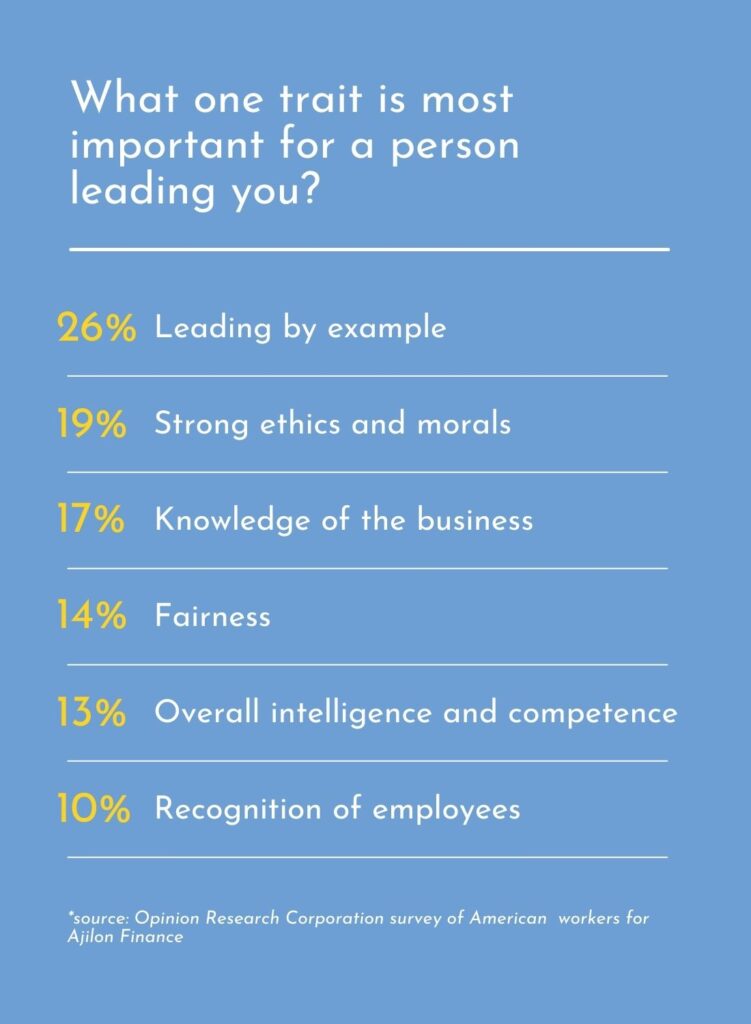
Source: Success Magazine
Ways to implement Principle Three in day-to-day leadership role:
• Set clear expectations: Clearly communicate and articulate the values, behaviors, and standards expected from yourself and your team. Be explicit about the desired behaviors that align with the organization’s mission and values.
• Be authentic: Align your words and actions, ensuring consistency between what you say and what you do. People are more likely to follow leaders who demonstrate authenticity and integrity.
• Exhibit positive behaviors: Demonstrate positive leadership behaviors such as active listening, empathy, respect, and inclusivity. Act as a role model for your team by exemplifying the behaviors you expect from others.
• Practice transparency: Foster an environment of transparency by openly sharing information, insights, and decisions whenever possible. This promotes trust, accountability, and a sense of shared ownership.
• Show appreciation and recognition: Regularly acknowledge and recognize the contributions of individuals and the team. Celebrate successes, both big and small, and express genuine appreciation for their efforts. This reinforces a positive and supportive culture.
• Develop others: Invest in the growth and development of your team members. Provide coaching, mentorship, and opportunities for skill-building. Encourage a culture of continuous learning and improvement.
• Encourage collaboration and teamwork: Foster a collaborative work environment where individuals work together toward shared goals. Encourage open communication, cooperation, and mutual support among team members.
• Practice self-care: Take care of your own well-being, both physically and mentally. Prioritize work-life balance, manage stress effectively, and practice self-reflection. A leader who takes care of themselves serves as a positive role model for self-care to others.
By implementing Principle Three, leaders can create a culture where positive behaviors are valued, and each individual recognizes their ability to make a positive difference. Leading by example sets the tone for the entire organization and inspires others to strive for excellence.
The consequences of not leading by example
If a leader does not lead by example, several negative consequences can arise within the organization, ultimately hindering team cohesion, performance, and overall success. Here are some potential outcomes:
1. Erosion of Trust: When a leader’s actions do not align with their words, trust is eroded among team members. If leaders don’t demonstrate the values, ethics, and work ethic they expect from their team, employees may feel deceived or misled, leading to skepticism and cynicism about the leader’s intentions and decisions.
2. Decreased Morale and Engagement: Leaders who don’t lead by example can demotivate their team. Employees often look to their leader for guidance and inspiration. If a leader isn’t actively involved or invested in the team’s efforts, it can lead to a sense of disconnection and decreased morale. This can, in turn, result in reduced engagement and productivity.
3. Communication Breakdown: Leading by example is a form of effective communication. If a leader doesn’t practice open and transparent communication themselves, it sets a precedent for poor communication within the team. This can lead to misunderstandings, misinterpretations, and a breakdown of essential information flow.
4. Loss of Credibility: Credibility is vital for leadership influence. When a leader’s actions don’t match their words, their credibility suffers. This can impact their ability to persuade, guide, and inspire their team. Over time, the leader may find it difficult to gain support for their initiatives or decisions.
5. Cultural Impact: A leader’s behavior often sets the tone for the organizational culture. If a leader doesn’t uphold the values and standards they promote, it can contribute to the development of a negative culture. This can lead to increased turnover, resistance to change, and a lack of cohesiveness among team members.
6. Missed Learning Opportunities: Leaders who lead by example provide valuable learning opportunities for their team. When a leader doesn’t actively engage or demonstrate problem-solving, innovation, or adaptability, team members miss out on seeing how these skills are applied in practice.
7. Lack of Accountability: If a leader is not accountable for their actions, it sends a message that accountability is not a priority. This can lead to a culture where team members feel they can shirk their responsibilities without consequence, affecting overall performance and outcomes.

Case Study: Failing to Lead by Example
One notable case study of a leader failing to lead by example is the Enron scandal, which unfolded in the early 2000s. Enron, a prominent American energy company, was led by CEO Jeffrey Skilling and Chairman Kenneth Lay. The scandal ultimately led to Enron’s bankruptcy, a significant loss of jobs, and a major blow to investor trust.
In this case, the leaders’ failure to lead by example was evident in several ways:
1. Misleading Financial Practices: Enron engaged in unethical accounting practices to inflate their profits and hide their debt. Despite portraying the company as highly successful and profitable, the leadership knowingly misled investors, employees, and regulators. This dishonesty contradicted the values of transparency and integrity that leaders are expected to uphold.
2. Lack of Accountability: Skilling and Lay encouraged a culture that prioritized short-term financial gains over ethical considerations. This created an environment where employees felt pressured to meet aggressive targets, even if it meant bending or breaking the rules. The leaders themselves didn’t take responsibility for their actions and often shifted blame onto others when the company’s problems came to light.
3. Insider Trading: Some Enron executives engaged in insider trading by selling their shares before the company’s financial troubles became widely known. This revealed a disregard for the impact of their actions on other stakeholders, including employees and investors.
4. Ignoring Employee Concerns: As Enron’s financial problems escalated, many employees began to suspect that something was amiss. However, the leadership dismissed these concerns and continued to project an image of success. This lack of responsiveness eroded trust and created a sense of disillusionment among the workforce.
The Enron scandal serves as a cautionary tale about the far-reaching consequences of leaders failing to lead by example. The lack of integrity, transparency, and accountability displayed by the company’s leadership contributed to a series of unethical decisions that not only led to financial ruin but also shattered the trust of stakeholders and had a broader impact on the business world’s perception of corporate ethics.
This case study underscores the importance of leaders embodying the values they promote, practicing ethical decision-making, and fostering an environment of transparency and accountability. It also demonstrates how a failure to lead by example can result in severe reputational damage and legal repercussions for both individuals and organizations.

Principle Four: “Effective leadership requires the use of constructive, positive, respectful authority, power, and influence.”
Principle Four emphasizes the significance of using authority, power, and influence in a constructive and positive manner. It highlights that leadership is not about exerting control or dominance, but rather about leveraging authority and power to inspire and empower others. By employing respectful and ethical leadership practices, leaders can foster a healthy and productive work environment, enhance team collaboration, and drive positive outcomes.
Research has consistently shown that leaders who adopt a positive and respectful approach in utilizing their authority and power tend to have more engaged and committed teams. A study by organizational psychologist Dov Eden found that leaders who exhibited positive leadership behaviors, such as fairness, inclusivity, and empowerment, had higher-performing teams and greater overall organizational success.
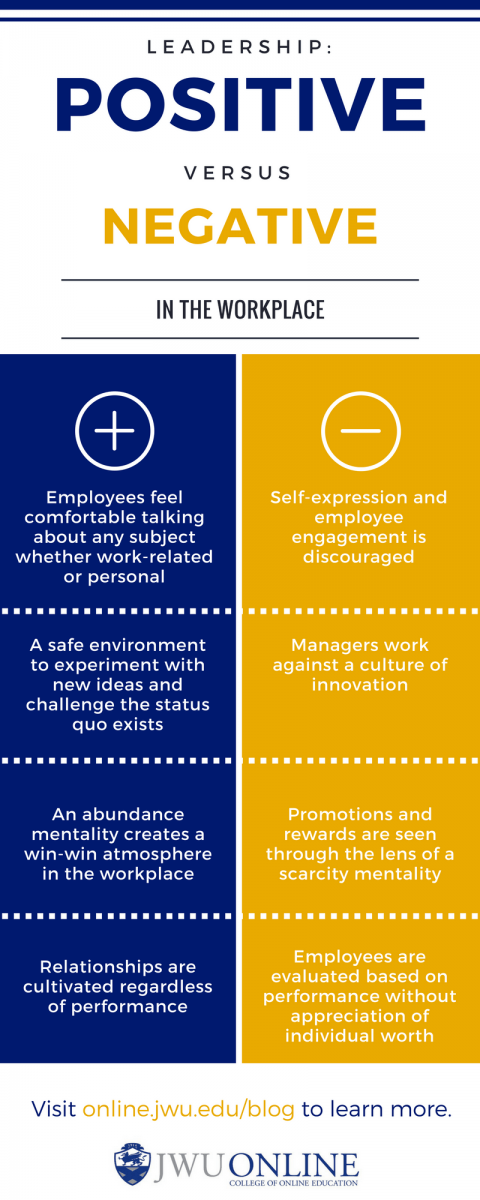
Ways to implement Principle Four in day-to-day leadership role:
• Foster a collaborative decision-making process: Involve team members in decision-making processes whenever possible. Seek their input, consider diverse perspectives, and encourage active participation. This approach empowers individuals and increases their commitment to the outcomes.
• Communicate effectively and transparently: Clearly communicate goals, expectations, and organizational changes to your team. Ensure information flows freely and openly, promoting transparency and reducing uncertainties.
• Delegate and empower: Delegate tasks and responsibilities to team members, allowing them to take ownership and develop their skills. Provide support and guidance as needed, while granting autonomy to foster growth and confidence.
• Build relationships based on trust and respect: Cultivate trust by being reliable, keeping promises, and demonstrating integrity. Show respect for diverse opinions, listen actively, and treat others with dignity.
• Provide constructive feedforward: Offer timely and constructive feedforward to help individuals improve their performance. Feedforward means focusing on what you want not what has been. It is future oriented not past focused. Concentration on strengths and areas for development, and provide guidance for growth. Foster a growth mindset by framing feedback as an opportunity for improvement rather than criticism.
• Mentor and coach: Support the growth and development of your team members by acting as a mentor or coach. Provide guidance, share experiences, and help individuals identify and overcome challenges. This builds trust and encourages continuous learning.
• Advocate for fairness and equity: Promote fairness and equity in decision-making, resource allocation, and opportunities for advancement. Ensure that individuals are treated fairly and with respect, irrespective of factors such as gender, race, or background.
• The Sin of Omission applies: Many leaders avoid application or responsibility of influence not dealing with issues or challenges. Evading important or critical conversations or saying what is popular not what is needed – is not reflective of Magnus Leadership Principles.
By implementing Principle Four, leaders can create a positive and inclusive work environment, where individuals feel empowered and valued. Utilizing authority, power, and influence in a constructive and respectful manner enhances team collaboration, motivation, and overall organizational effectiveness.
The consequences of not using authority, power, and influence in a constructive and positive manner
Failing to use authority, power, and influence in a constructive and positive manner as a leader can have detrimental effects on both the leader’s effectiveness and the overall health of the organization. Here are some of the consequences:
1. Lack of Direction and Structure: Authority is essential for providing direction and structure within a team. If a leader doesn’t use their authority effectively, it can lead to confusion, unclear roles, and a lack of focus. Team members might not know what is expected of them or how to prioritize tasks, resulting in inefficiency and frustration.
2. Decreased Team Morale: Misusing authority, such as being overly controlling or micro-managing, can lead to decreased morale among team members. When individuals feel that their abilities and decisions are constantly questioned or undermined, they can become disheartened and demotivated.
3. Diminished Empowerment: Power, when misused, can stifle employee empowerment. If a leader hoards decision-making authority and doesn’t delegate responsibilities, team members might feel disempowered and undervalued. This can hinder personal growth, creativity, and innovation.
4. Erosion of Respect: Leaders who wield power in a negative or authoritarian manner can lose the respect of their team. Instead of inspiring admiration and loyalty, leaders who misuse power might only elicit compliance out of fear, which doesn’t foster a healthy or sustainable working relationship.
5. Resistance to Change: If a leader uses their authority to impose decisions without considering input or explaining rationale, it can lead to resistance when changes are introduced. Team members are more likely to embrace change if they understand its purpose and have been part of the decision-making process.
6. Lack of Collaboration: Influence is a potent tool for collaboration and alignment. If a leader doesn’t use influence constructively, they might struggle to get buy-in from team members, resulting in a lack of cooperation and synergy. This can lead to silos, reduced sharing of ideas, and overall poor teamwork.
7. High Turnover Rates: Leaders who misuse authority, power, and influence can contribute to high turnover rates. Employees are more likely to leave if they feel disempowered, disrespected, or if they perceive the work environment as toxic due to poor leadership practices.
8. Missed Growth Opportunities: Leaders who don’t use their influence to support professional growth and development miss an opportunity to nurture talent. This can lead to stagnation among team members and, in turn, hinder the organization’s ability to adapt and innovate.
9. Negative Organizational Culture: When authority, power, and influence are misused, it can shape a negative organizational culture marked by fear, distrust, and low morale. This can create a toxic work environment that impedes collaboration and hampers the organization’s overall success.

Case Study: Nelson Mandela’s Leadership in South Africa
Background: Nelson Mandela, a South African anti-apartheid revolutionary, was imprisoned for 27 years due to his activism against the apartheid regime that enforced racial segregation and discrimination. After his release in 1990, Mandela emerged as a unifying figure and played a significant role in the negotiation process that led to the end of apartheid and the establishment of a democratic South Africa.
Positive Use of Influence, Authority, and Power:
1. Inclusive Leadership: Mandela recognized the importance of inclusivity and unity in a deeply divided nation. He used his influence to bring together various political parties, ethnic groups, and stakeholders to negotiate a peaceful transition to democracy. His ability to empathize with diverse perspectives helped him build bridges and encourage collaboration.
2. Reconciliation Over Revenge: Despite enduring decades of imprisonment and injustice, Mandela advocated for reconciliation instead of revenge. He used his authority to establish the Truth and Reconciliation Commission, which aimed to address the atrocities of the past through open hearings. This process allowed victims to share their stories and perpetrators to seek amnesty in exchange for truth-telling.
3. Leading by Example: Mandela exemplified the values he promoted. He emphasized forgiveness and understanding, even extending friendship to his former oppressors. His actions were consistent with his words, and he demonstrated a commitment to peaceful negotiation, demonstrating integrity and building trust.
4. Peaceful Transition: Mandela’s influence was crucial in guiding South Africa through a peaceful transition from apartheid to democracy. His reputation as a leader who sought unity and fairness made him a respected figure both within South Africa and on the global stage.
Impact and Legacy:
Nelson Mandela’s positive use of influence, authority, and power helped prevent a potential descent into violence and chaos during the transition period. His leadership contributed to the establishment of a democratic South Africa where all citizens, regardless of race, had equal rights. Mandela’s ability to harness his authority for the greater good and to influence reconciliation rather than revenge is a testament to the transformative potential of leadership grounded in ethical principles.
Mandela’s legacy continues to inspire leaders around the world, showcasing the profound impact that leaders can have when they use their authority, power, and influence to promote unity, justice, and positive change.

Exercise 1.6: Leading by Example Scenarios
• Printed role-model scenarios (shortened versions)
• Whiteboard or flipchart
• Markers
1. Introduction (5 minutes):
• Recap the concept of leading by example and its significance in effective leadership.
2. Scenario Sharing (10 minutes):
• Prepare and share a few scenarios that showcase different leadership behaviors, both positive and negative.
• For example:
1. The team faces a tight deadline. The leader arrives early and works alongside the team to meet it.
2. A team member suggests an innovative idea, but the leader dismisses it without considering its potential.
3. During challenges, the leader addresses the team with a positive attitude and expresses confidence in finding solutions.
4. The leader is often late to meetings and leaves early.
5. A team member makes a mistake, and the leader criticizes them openly in front of the team.
3. Small Group Discussion (15 minutes):
• Divide participants into small groups.
• Assign each group one scenario to discuss.
• In their groups, participants should answer:
– How does this scenario relate to leading by example?
– What specific actions can the leader take to demonstrate positive leadership behaviors in this situation?
4. Group Sharing (10 minutes):
• Have each group share a brief summary of their discussion with the whole group.
• Encourage participants to highlight key insights and solutions for each scenario.
5. Wrap-Up (5 minutes):
• Summarize the importance of leading by example and the impact it can have on team dynamics and success.
• Invite participants to reflect on how they can apply these insights in their own leadership roles.

Course Manual 7: Transformational Principles 5 & 6
Understanding and addressing the deeper needs of individuals within a leadership role, along with granting individual autonomy, are two essential pillars that shape effective and empathetic leadership. These approaches combine to create a dynamic and empowering work environment that fosters both personal and organizational growth.
Embracing individual autonomy in leadership empowers leaders to make informed decisions, drive innovation, and foster a culture of ownership. Leaders who trust their team members to think critically and make independent judgments often see a surge in creative solutions and calculated risks. This not only accelerates progress but also highlights the unique strengths and perspectives each individual brings, nurturing collaborative problem-solving. Balancing this autonomy within the framework of a shared vision ensures that organizational goals remain aligned.
Source: Khan Academy
Concurrently, understanding and addressing the deeper needs of individuals deepen interpersonal connections and enhance overall well-being. By delving beyond surface concerns, leaders build trust and rapport. Acknowledging personal aspirations and challenges creates a sense of belonging, fostering job satisfaction, engagement, and a commitment to the organization’s mission. Moreover, recognizing and supporting team members’ emotional well-being cultivates a healthier and more productive work environment.
The synergy of individual autonomy and addressing deeper needs enriches professional development. Leaders who grasp personal motivations can tailor growth opportunities that align with aspirations. This targeted approach not only builds skill sets but also nurtures a pipeline of capable leaders. Effective leaders balance these individualized efforts with a cohesive team dynamic and shared organizational goals, maintaining open lines of communication to ensure that personal growth contributes to collective success.
In essence, the amalgamation of individual autonomy and understanding deeper needs establishes an inclusive and innovative leadership style. This approach leverages individual strengths and aspirations, fostering a sense of ownership, trust, and accountability. By nurturing personal growth and engagement, leaders create a harmonious and productive work culture that drives both individual fulfillment and overall organizational success.

Principle Five: “Individuals have the autonomy to determine their actions, behavior, and treatment of others.”
Principle Five emphasizes the importance of individual autonomy in leadership. It recognizes that individuals should have the freedom to make decisions, choose their actions, and treat others with respect and fairness. This principle highlights the value of empowering individuals and trusting them to act responsibly, fostering a sense of ownership, and promoting a positive work environment.
Research in organizational behavior and psychology consistently demonstrates the benefits of autonomy in the workplace. Studies have shown that granting individuals autonomy over their work leads to higher levels of motivation, job satisfaction, and overall performance. Autonomy enables individuals to tap into their creativity, problem-solving abilities, and intrinsic motivation, ultimately driving innovation and growth.

Source: Medium
Ways to implement Principle Five in day-to-day leadership role:
• Provide clear expectations and goals: Clearly communicate the expectations and goals to individuals, providing them with a sense of direction and purpose. This clarity allows them to exercise autonomy within the defined boundaries.
• Delegate decision-making authority: Empower individuals by delegating decision-making authority. Provide them with the necessary information, resources, and support to make informed decisions. Encourage them to take ownership of their work and be accountable for the outcomes.
• Foster a culture of trust: Build a culture of trust by demonstrating trust in your team members’ abilities and judgment. Trust individuals to make responsible decisions and take appropriate actions. This trust fosters a positive work environment where individuals feel empowered and valued.
• Encourage creativity and innovation: Create opportunities for individuals to explore creative solutions and contribute innovative ideas. Provide a supportive environment that values experimentation and learning from failures. Encourage individuals to take calculated risks and explore new approaches.
• Support individual development: Recognize and support the growth and development needs of your team members. Provide them with opportunities for learning, skill-building, and professional development. Encourage them to pursue their interests and passions, allowing them to grow both personally and professionally.
• Foster open communication and collaboration: Encourage open and transparent communication within the team. Create platforms for sharing ideas, feedback, and suggestions. Encourage collaboration and teamwork, allowing individuals to learn from each other and contribute collectively to the team’s success.
• Provide feedback and guidance: Offer constructive feedback and guidance to individuals, helping them navigate their autonomy effectively. Provide support when needed and help them learn from their experiences. Regularly check in to provide guidance and ensure alignment with goals.
• Encourage self-reflection and learning: Encourage individuals to engage in self-reflection and continuous learning. Promote a growth mindset, where individuals actively seek feedback, reflect on their experiences, and learn from both successes and challenges.
By implementing Principle Five, leaders can create an environment that values autonomy and empowers individuals to take ownership of their actions. Embracing autonomy enhances motivation, engagement, and overall performance, driving individual and organizational success.
What if a leader lacks individual autonomoy?
If someone in a leadership role lacks individual autonomy, several negative consequences can arise that can hinder both the leader’s effectiveness and the overall performance of the team or organization:
1. Micromanagement: Without individual autonomy, leaders may resort to micromanagement. This involves excessively controlling and overseeing every aspect of their team’s work. This stifles creativity, demotivates team members, and prevents them from making decisions or contributing their unique insights. As a result, the team’s potential for innovation and independent problem-solving is severely curtailed.
2. Reduced Initiative: When leaders don’t have the freedom to make decisions, they can’t effectively lead their team. This lack of initiative can lead to delayed responses to challenges, missed opportunities, and a lack of adaptability. The team’s ability to respond swiftly to changing circumstances or capitalize on emerging trends diminishes, potentially putting the organization at a disadvantage.
3. Low Morale: Employees thrive in environments where their contributions and ideas are valued. When leaders lack autonomy, they may struggle to recognize and appreciate their team members’ capabilities, leading to lower morale and job satisfaction. Team members might feel unimportant, leading to decreased engagement and ultimately impacting productivity.
4. Limited Growth and Learning: Individual autonomy is closely tied to personal development. Leaders who are not allowed autonomy miss out on opportunities to learn from their decisions, both successes and failures. This hampers their growth as leaders and can limit their ability to develop essential skills, such as decision-making, critical thinking, and strategic planning.
5. Slow Decision-Making: A lack of individual autonomy can lead to decision-making bottlenecks. Leaders may be required to seek approval for every decision from higher-ups, leading to delays and inefficiencies. This sluggish decision-making process can hinder the organization’s ability to respond promptly to market changes and seize opportunities.
6. Loss of Trust and Respect: When leaders are denied autonomy, their credibility and effectiveness can be compromised. Team members might question their leadership abilities, leading to a loss of trust and respect. This breakdown in trust can disrupt team dynamics and collaboration, ultimately affecting the overall cohesion and performance of the group.

Case study: Richard Branson’s approach to individual autonomy
A leader who understood the importance of individual autonomy in leadership is Richard Branson, the founder of the Virgin Group. Branson’s leadership style is characterized by his emphasis on empowering his employees and giving them the freedom to innovate and take ownership.
Branson believed that happy and motivated employees are the key to a successful business. He encouraged his team members to think creatively, make decisions, and take risks. This approach to individual autonomy had several notable impacts:
1. Innovation: Branson’s trust in his employees’ abilities to come up with innovative ideas led to the diversification of the Virgin brand into various industries, including music, airlines, telecommunications, and more. His willingness to listen to and invest in his employees’ ideas resulted in Virgin becoming a recognized name in multiple sectors.
2. Employee Engagement: By giving employees the autonomy to shape their roles and contribute to the company’s growth, Branson fostered a sense of ownership and pride. This translated into higher levels of employee engagement and commitment, as they felt valued and integral to the company’s success.
3. Adaptability: Branson’s approach to leadership allowed Virgin to be agile and adaptable. Employees were encouraged to make decisions quickly and respond to changing market conditions. This flexibility enabled the company to seize opportunities and navigate challenges more effectively.
4. Continuous Learning: Branson valued personal growth and learning, both for himself and his employees. He supported initiatives that encouraged skill development and encouraged his team to take on new challenges, which contributed to a culture of continuous learning and improvement.
5. Trust and Respect: Branson’s respect for individual autonomy created an atmosphere of trust. Employees felt trusted to make decisions and were more likely to take initiative and responsibility. This mutual trust between leadership and employees formed a strong foundation for Virgin’s success.
6. Employee Well-Being: Branson’s emphasis on work-life balance and treating employees well contributed to a positive work environment. His recognition of employees’ needs beyond the workplace highlighted his understanding of the deeper needs of individuals.
However, it’s important to note that while Branson’s leadership style has been largely successful, it might not fit every organizational context. The degree of autonomy given to employees needs to be balanced with clear communication and alignment with the company’s goals and values. Overall, Richard Branson’s leadership exemplifies how individual autonomy can lead to innovation, engagement, and growth within a business.

Principle Six: “Leadership involves understanding and meeting the deeper needs of the people being led or served.”
Principle Six highlights the significance of understanding and addressing the deeper needs of individuals within a leadership role. It emphasizes that effective leaders go beyond surface-level interactions and recognize the importance of meeting the intrinsic needs of their team members. By understanding and fulfilling these deeper needs, leaders can create a supportive and fulfilling work environment that enhances engagement, satisfaction, and overall well-being.
Research in organizational psychology and leadership has emphasized the importance of addressing the deeper needs of individuals in the workplace. Studies have shown that when leaders focus on creating a sense of meaning, purpose, and belonging for their team members, it positively impacts their motivation, commitment, and job satisfaction. By understanding and meeting these deeper needs, leaders can foster a sense of fulfillment and enable individuals to perform at their best.
Ways to implement Principle Six in day-to-day leadership role:
• Clarify personal purpose and meaning: Help individuals understand their purpose and significance of themselves first – and their work second. Connect their tasks and contributions to the broader organizational goals and mission. Highlight the impact they have on others and the value they bring to the team.
• Cultivate a strengths-based approach: Recognize and leverage the unique strengths and talents of each team member. Encourage team members to first discover and confirm their strengths then second have them focus how to use them to contribute to the team’s success, fostering a sense of empowerment and engagement.
• Foster open communication: Create a culture of open communication where individuals feel comfortable expressing their needs, concerns, and aspirations. Encourage regular dialogue and actively listen to understand their perspectives.
• Build relationships and trust: Invest in building strong relationships with team members. Show genuine care, empathy, and respect. Create a trusting environment where individuals feel safe to share their needs and vulnerabilities.
• Support personal growth and development: Recognize and support the personal growth and development needs of individuals. Note this is personal as well as professional. Deeper needs can include items like family, work flexibility and adjustments to responsibilities to meet their personal needs. Provide opportunities for learning, skill-building, and career advancement. Offer mentorship, coaching, and training to help them reach their full potential.
• Practice empathy and emotional intelligence: Cultivate empathy and emotional intelligence to understand the needs, emotions, and perspectives of others. Be attuned to their well-being and proactively offer support and encouragement.
By implementing Principle Six, leaders can create a work environment that addresses the deeper needs of individuals, fostering engagement, satisfaction, and a sense of fulfillment. By understanding and meeting these needs, leaders can unlock the potential of their team members and build strong, cohesive teams.

Source: Scott Jeffrey
Failing to address an individual’s deeper needs
If someone in a leadership role fails to address the deeper needs of individuals within their team, several negative consequences can unfold, impacting both the well-being of team members and the overall effectiveness of the organization:
1. Decreased Engagement and Motivation: Ignoring the deeper needs of individuals can lead to a sense of disconnection and apathy among team members. When their personal aspirations, values, and challenges are not acknowledged, they might become demotivated and disengaged. This lack of emotional investment can result in decreased productivity and a decline in the quality of work.
2. High Turnover Rates: Employees who feel their deeper needs are not recognized or met are more likely to seek opportunities elsewhere. The absence of a supportive and empathetic work environment can lead to higher turnover rates, which can be costly for organizations in terms of recruitment, training, and lost institutional knowledge.
3. Low Morale and Job Satisfaction: Employees who perceive that their emotional and psychological well-being is neglected by leadership are likely to experience low morale and job satisfaction. This can create a negative atmosphere, affecting team dynamics and overall organizational culture.
4. Reduced Innovation: Addressing the deeper needs of individuals can foster a sense of psychological safety that encourages innovation and risk-taking. Without this support, employees might be hesitant to share creative ideas or take calculated risks, limiting the organization’s potential for growth and advancement.
5. Mental Health Issues: Neglecting deeper needs can contribute to stress, anxiety, and burnout among team members. Unresolved personal challenges can escalate into serious mental health issues, impacting both the individual’s well-being and their ability to contribute effectively to the team.
6. Lack of Trust in Leadership: When leaders fail to address the deeper needs of their team members, it can erode trust in leadership. Employees might perceive the leadership as indifferent or uncaring, which can lead to a breakdown in communication, collaboration, and overall respect for authority.
7. Limited Professional Development: Personal growth often aligns with professional development. Leaders who don’t recognize and support individual aspirations miss out on opportunities to develop their team members’ skills and talents. This can hinder the growth of both individuals and the organization as a whole.
8. Negative Reputation: Organizations that disregard the emotional well-being of their employees can develop a negative reputation within their industry or community. This can affect their ability to attract top talent and retain clients, partners, and customers who value ethical and employee-centric practices.
In conclusion, not addressing the deeper needs of individuals within a leadership role can lead to a host of detrimental outcomes, affecting team morale, productivity, innovation, and overall organizational success. Prioritizing empathy, open communication, and support for individuals’ well-being is essential for creating a healthy and thriving work environment.

Case Study: The Dieselgate Scandal
A case study that highlights a failure to meet individuals’ deeper needs in a leadership role is the Volkswagen (VW) emissions scandal, also known as “Dieselgate.” This scandal emerged in 2015 when it was revealed that VW had intentionally manipulated emissions tests for their diesel vehicles to appear more environmentally friendly than they actually were.
In this case, the leadership of VW, including executives and senior management, failed to address the deeper needs of various stakeholders:
1. Deception and Lack of Transparency: The leadership’s decision to install “defeat devices” in their vehicles to cheat emissions tests showcased a lack of transparency and disregard for customers’ deeper need for accurate information. This unethical practice not only violated trust but also betrayed the expectations of environmentally conscious consumers.
2. Employee Pressure: Reports suggest that there was significant pressure on VW employees to develop vehicles that met stringent emissions standards while maintaining performance and profitability. This pressure created an environment where employees might have felt forced to compromise ethical standards to meet unrealistic goals set by leadership.
3. Reputation Damage: VW’s actions damaged its reputation not only among customers but also among employees. Individuals who worked for the company might have felt ashamed of being associated with a brand that was found guilty of intentional deception, impacting their sense of pride and job satisfaction.
4. Investor Confidence: The scandal resulted in a significant drop in VW’s stock value and led to financial losses for investors. The leadership’s failure to uphold ethical standards negatively impacted the deeper needs of investors for honest and transparent business practices.
5. Legal Consequences: The scandal had far-reaching legal repercussions, resulting in massive fines and lawsuits against the company. This not only affected the company’s financial stability but also cast uncertainty over the job security and career prospects of employees.
The VW emissions scandal serves as a stark reminder of the consequences when leaders fail to address the deeper needs of their stakeholders, including customers, employees, and investors. Prioritizing ethical behavior, transparency, and accountability is crucial for maintaining trust and fostering a culture where individuals’ well-being and expectations are valued and respected.

Exercise 1.7: Exploring Team’s Intrinsic Needs
1. Introduction:
• Begin by recapping the concept of intrinsic needs – the internal desires and motivations that drive individuals. Explain how recognizing and fulfilling these needs is crucial for team members’ motivation and well-being.
• Emphasize that as leaders, understanding and addressing team members’ intrinsic needs can lead to better team dynamics, increased engagement, and higher productivity.
2. Brainstorming Intrinsic Needs:
• Divide participants into 2 groups.
• Provide each group with a flip chart paper and markers.
• Instruct each group to brainstorm and list as many intrinsic needs as they can think of. Remind them that these could include autonomy, competence, relatedness, creativity, growth, purpose, etc. Encourage them to consider the needs that their team members might have.
3. Sharing and Discussion:
• After brainstorming, have each group present their list of intrinsic needs to the larger group.
• As each group presents, discuss how these needs could apply to team dynamics and how understanding and addressing them can impact team members’ motivation and well-being.
4. Identifying Team Members’ Intrinsic Needs:
• Distribute sticky notes to each participant.
• Instruct participants to individually choose three intrinsic needs from the list that they believe could be important for their team members and write each need on a separate sticky note.
5. Mapping Team Members’ Needs:
• Have participants come up and place their sticky notes on a designated area of the wall, forming a visual map of the most common intrinsic needs they believe their team members have.
6. Reflection and Group Discussion:
• Lead a discussion on the patterns that emerge from the sticky notes on the wall. Which needs are likely prevalent within the team?
• Discuss the potential benefits of leaders understanding and addressing these intrinsic needs, such as improved team morale, increased productivity, and enhanced collaboration.
7. Application and Action:
• Encourage participants to reflect on how they can incorporate the understanding of their team members’ intrinsic needs into their leadership approach. How can they create an environment that caters to these needs and fosters motivation?
• Summarize the key takeaways, highlighting the importance of leaders recognizing and addressing their team members’ intrinsic needs for fostering a motivated and engaged team.
• Thank the participants for their active participation and insights.

Course Manual 8: Transformational Principles 7 & 8
Effective leadership is a multifaceted endeavor that hinges on a dynamic interplay of emotions, values, ethics, collaboration, and teamwork. Emotions, values, and ethics constitute the bedrock of leadership by influencing not only a leader’s decisions and actions but also the overall organizational culture. Emotionally intelligent leaders are adept at understanding and managing their own emotions, which, in turn, enables them to connect empathetically with their teams. By fostering a culture of transparency and authenticity, leaders encourage team members to align their behaviors with shared values. Upholding ethical principles reinforces the integrity of leadership, guiding decisions that prioritize stakeholders and the larger societal context.
This foundation seamlessly intertwines with the significance of collaboration and teamwork in leadership, particularly in the context of transformational leadership. Collaborative leaders recognize that no single individual possesses all the answers. By championing collaboration, they tap into the diverse strengths and perspectives of their team members, resulting in innovative and comprehensive solutions. In the transformational leadership paradigm, collaboration nurtures a sense of collective ownership, aligning team members with the organization’s visionary goals. This shared purpose, nurtured through teamwork, fosters intrinsic motivation and empowers individuals to contribute actively to the pursuit of transformative change.
Furthermore, collaboration and teamwork serve as exemplars of the values transformational leaders promote. By modeling openness to different viewpoints, leaders set a standard that encourages team members to engage in open communication and idea sharing. Through collaboration, leaders foster an environment of trust and mutual respect, which are essential elements for achieving transformational outcomes.
In summary, the intricate interplay of emotions, values, ethics, collaboration, and teamwork forms the essence of effective leadership. Leaders who acknowledge the significance of these factors create cultures that embrace change, innovation, and growth. By leveraging emotional intelligence, upholding ethical principles, and promoting collaborative efforts, transformational leaders not only guide their teams toward success but also cultivate a cohesive, motivated, and adaptable workforce that thrives in the face of challenges.

Principle Seven: “Leadership is an affair of the heart and encompasses a moral component central to all other aspects of leadership.”
Principle Seven highlights the crucial role of emotions, values, and ethics in leadership. It emphasizes that effective leadership goes beyond technical skills and requires leaders to lead with authenticity, compassion, and a strong moral compass. By recognizing the emotional and moral dimensions of leadership, leaders can foster trust, inspire others, and create a positive organizational culture.
Research has shown that leadership that incorporates emotional intelligence and moral values has a significant impact on employee engagement, commitment, and overall organizational performance. Studies by Daniel Goleman and others have demonstrated that leaders who are emotionally intelligent and demonstrate ethical behavior create a positive work environment and promote higher levels of employee well-being and satisfaction.
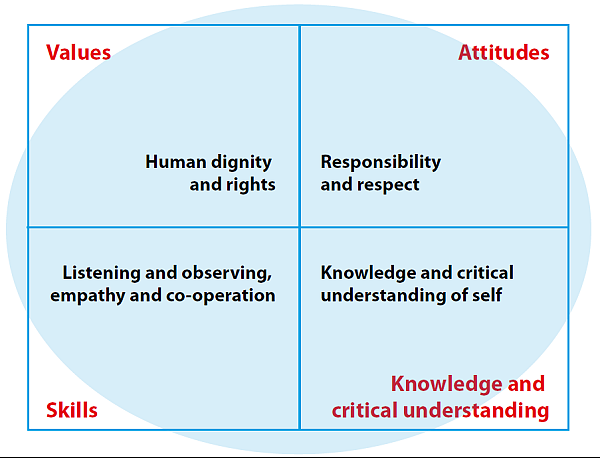
Source: The Council of Europe
Ways to implement Principle Seven in day-to-day leadership role:
• Cultivate self-awareness: Develop self-awareness by understanding your emotions, values, and beliefs. Reflect on your motivations and intentions as a leader. This self-awareness forms the foundation for leading with authenticity and integrity.
• Acknowledge when you are not a fit nor have the values to lead other: Many have heard of the Peter Principle where leaders are promoted into a level of incompetence. If you are in a position that is not a fit and you are not passionate about leadership – admit it and be a responsible adult by moving on. Being a miserable leader does no one a favor especially yourself.
• Communicate openly and honestly: Foster a culture of open and honest communication. Clearly articulate expectations, share information transparently, and encourage dialogue. Be honest and authentic in your interactions, fostering trust and credibility.
• Set and uphold ethical standards: Establish clear ethical standards and values for yourself and your team. Lead by example, demonstrating integrity, fairness, and ethical decision-making. Uphold these standards consistently in your actions and decisions.
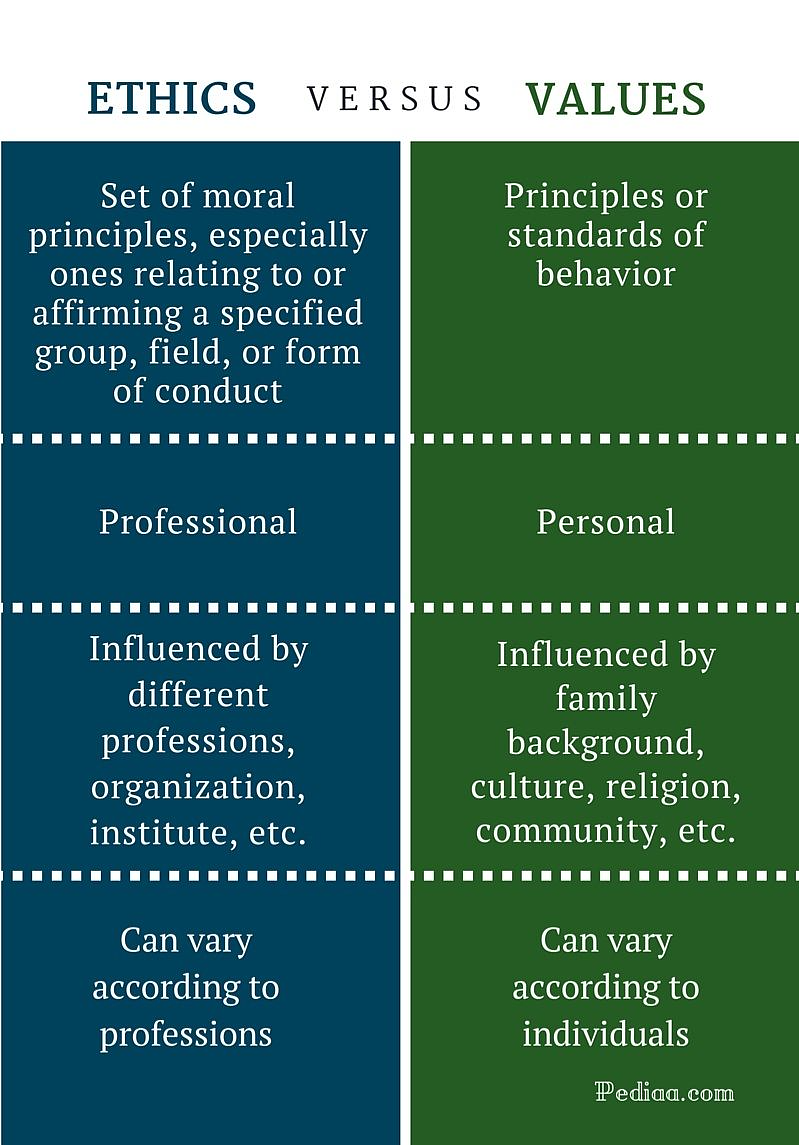
• Promote a positive work culture: Create a positive work culture that values respect, trust, and ethical behavior. Encourage collaboration, fairness, and inclusivity. Recognize and reward ethical conduct within the team.
• Make values-based decisions: Incorporate your values and ethical considerations into decision-making processes. Consider the impact of decisions on stakeholders, the broader community, and the organization’s long-term sustainability.
• Encourage ethical discussions: Foster an environment where team members feel comfortable discussing ethical dilemmas and concerns. Encourage open dialogue and provide guidance in navigating ethical challenges.
• Seek feedback and learn from mistakes: Be open to feedback and learn from mistakes. Embrace a growth mindset and view setbacks as learning opportunities. Use feedback to continuously improve your leadership and ethical practices.
By implementing Principle Seven, leaders can create an environment that fosters trust, authenticity, and ethical behavior. Leading with heart and moral values enhances employee engagement, loyalty, and a positive organizational culture.
The consequences of not practising this principle
If a leader does not comprehend the vital role of emotions, values, and ethics in leadership, there can be significant consequences that negatively impact both the leader and the organization they are guiding:
1. Poor Team Dynamics: Emotions are a fundamental aspect of human interaction, and leaders who disregard their role may struggle to build strong relationships with their team members. Without understanding and managing emotions, leaders might fail to empathize with their team’s concerns, leading to poor communication, low morale, and an overall negative work environment. This can result in decreased collaboration, increased conflicts, and reduced productivity.
2. Erosion of Trust and Credibility: Values and ethics provide the foundation for trust in leadership. If a leader doesn’t prioritize ethical decision-making and transparently uphold shared values, team members and stakeholders may perceive them as inconsistent, untrustworthy, or even manipulative. This erosion of trust can have far-reaching consequences, affecting loyalty, commitment, and the organization’s reputation.
3. Unethical Behavior: A lack of understanding of ethics can lead to leaders making decisions that prioritize short-term gains or personal interests over the well-being of stakeholders or society. Such behavior can result in legal and reputational risks, financial losses, and a negative impact on employee morale. Unethical behavior can also permeate the organizational culture, setting a precedent that encourages others to follow suit.
4. Missed Opportunities for Innovation: Ignoring the role of emotions, values, and ethics may hinder a leader’s ability to foster an environment that encourages creativity and innovation. Teams that don’t feel valued or understood are less likely to contribute their ideas openly, leading to missed opportunities for growth and improvement.
5. High Turnover and Disengagement: A leader who disregards the importance of emotions, values, and ethics may contribute to employee disengagement and high turnover. Employees are more likely to leave an organization where they feel undervalued, unsupported, or where their ethical concerns are dismissed. This constant turnover disrupts the stability of the workforce and can incur recruitment and training costs.
6. Legal and Compliance Issues: Leaders who overlook the ethical aspects of their decisions might inadvertently engage in actions that breach legal and compliance standards. This can result in legal battles, regulatory fines, and a tarnished reputation that affects both the leader and the organization.

Case Study: Satya Nadella
One exemplary leader who deeply understands the significance of emotions, values, and ethics in leadership is Satya Nadella, the CEO of Microsoft. Under his leadership, Microsoft has undergone a significant transformation, and his approach highlights the importance of these elements.
Emotional Intelligence: Satya Nadella is known for his strong emphasis on emotional intelligence. He has openly discussed the empathy he developed through personal experiences, including his son’s health challenges. This empathy has translated into his leadership style, enabling him to connect with employees on a human level. He encourages a growth mindset within the company, where mistakes are seen as opportunities to learn, fostering a more inclusive and supportive work environment.
Values and Ethics: Nadella places great importance on Microsoft’s core values and ethical principles. He has focused on creating a culture that respects diversity and promotes inclusivity. His commitment to ethical behavior is evident in his initiatives to ensure that Microsoft’s technology is used responsibly and ethically. For instance, he has advocated for principles like fairness, accountability, and transparency in the development and deployment of artificial intelligence technologies.
Collaboration and Innovation: Nadella’s leadership style encourages collaboration and innovation. He has shifted the company’s focus from a purely competitive approach to one that embraces partnerships and openness. This is reflected in his support for cross-functional teams and his willingness to collaborate with other tech companies, fostering an environment where diverse perspectives can drive creative solutions.
Satya Nadella’s understanding of the significance of emotions, values, and ethics has not only contributed to Microsoft’s successful turnaround but has also positioned the company as a leader in ethical technology development. His leadership philosophy highlights how these elements can guide decision-making, foster a positive organizational culture, and drive sustainable growth in today’s complex business landscape.

Principle Eight: “Transformational leadership involves collaboration and recognizing that leadership is a team effort, based on mutual respect, trust, and a sense of belonging.”
Principle Eight emphasizes the significance of collaboration and teamwork in transformational leadership. It highlights that leadership is not a solo endeavor, but a collective effort that requires the participation and engagement of the entire team. By fostering collaboration, trust, and a sense of belonging, leaders can harness the collective intelligence and creativity of their team members to achieve shared goals and drive organizational success.
Research on leadership has consistently shown that collaboration and team-based approaches lead to higher levels of performance, innovation, and employee engagement. Studies have demonstrated that when leaders prioritize teamwork, establish a supportive and inclusive environment, and encourage mutual respect and trust, teams are more likely to achieve superior outcomes.

Ways to implement Principle Eight in day-to-day leadership role:
• Foster a culture of collaboration: Create a culture that values and promotes collaboration. Encourage team members to work together, share ideas, and support one another. Establish systems and processes that facilitate collaboration, such as cross-functional teams or regular team meetings.
• Put your Hubris away. Being a know it all or always having the be right is the kiss of death to living out this principle. Leadership is about helping and serving others to succeed which will build collaboration. This is not about feeding your ego.
• Build trust: Trust is essential for effective collaboration. Demonstrate trust in your team members by delegating responsibilities, providing autonomy, and honoring commitments. Foster an environment where trust is earned and maintained through open communication, transparency, and integrity.
• Encourage diverse perspectives: Embrace diversity in all its forms and encourage team members to contribute their unique perspectives and experiences. Recognize that diverse perspectives can lead to more creative solutions and innovative ideas. Create a safe space for individuals to express their opinions and actively seek out different viewpoints.
• Promote open communication: Establish channels for open and transparent communication within the team. Encourage active listening, respectful dialogue, and constructive feedback. Foster an environment where individuals feel comfortable sharing their thoughts, concerns, and ideas.
• Foster a sense of belonging: Create a sense of belonging and inclusivity within the team. Celebrate diversity and create opportunities for team members to connect on a personal level. Encourage team-building activities and foster a supportive and respectful work environment where everyone feels valued and included.
• Recognize and leverage individual strengths: Recognize and appreciate the unique strengths and skills of each team member. Assign tasks and responsibilities that align with their strengths, allowing individuals to contribute their best work. Encourage collaboration and leverage the diverse strengths of the team to achieve collective success.
• Encourage shared goals and ownership: Foster a sense of shared purpose and goals within the team. Clearly communicate the team’s objectives and how they align with the broader organizational mission. Encourage team members to take ownership of their roles and contribute actively to achieving shared goals.
By implementing Principle Eight, leaders can create a collaborative and inclusive work environment, where team members feel empowered, valued, and motivated to work together toward shared goals. Collaboration becomes a driving force for innovation, creativity, and organizational success.

The consequences of a lack of collaboration and teamwork
If a leader fails to grasp the significance of collaboration and teamwork in transformational leadership, several adverse consequences can unfold, hampering both the leader’s effectiveness and the organization’s potential for growth and innovation:
1. Missed Innovation Opportunities: Transformational leadership relies on harnessing the collective creativity and diverse expertise of team members. Without a focus on collaboration, innovative ideas and solutions might not surface. A lack of collaboration stifles the exchange of perspectives and limits the organization’s ability to adapt to changing circumstances and seize new opportunities.
2. Diminished Employee Engagement: Transformational leaders seek to inspire and motivate their teams by aligning them with a compelling vision. Without fostering a collaborative environment, employees may feel disconnected and disengaged. The absence of shared ownership over the vision can lead to decreased motivation, lowered job satisfaction, and ultimately higher turnover rates.
3. Fragmented Decision-Making: Effective transformational leadership involves making decisions that consider various viewpoints and expertise. Without collaboration, decision-making becomes fragmented, leading to suboptimal choices that may lack the holistic understanding required for transformative change. This can result in confusion, conflicts, and a lack of alignment among team members.
4. Limited Learning and Development: Collaborative interactions facilitate knowledge sharing and skill development among team members. When collaboration is neglected, opportunities for mentoring, cross-training, and learning from one another are reduced. This inhibits the growth and professional development of individual team members, hindering the overall progress of the organization.
5. Resistance to Change: Transformational leadership often involves guiding the organization through significant changes. Without collaboration, employees might feel excluded from decision-making processes, leading to resistance and reluctance to embrace change. An inclusive, collaborative approach can help generate buy-in and enthusiasm for transformative initiatives.
6. Inefficient Problem-Solving: Complex challenges often require the combined efforts of a diverse team to be effectively addressed. Without collaboration, leaders may struggle to find comprehensive solutions. This can result in prolonged problem-solving, subpar outcomes, and a lack of adaptability in the face of changing circumstances.
7. Lack of Adaptability: In today’s rapidly evolving business landscape, organizations need to be agile and adaptable. A leader who underestimates the importance of collaboration may inadvertently hinder the organization’s ability to respond to market shifts, technological advancements, and other disruptions.

Case Study: Travis Kalanick
One example of a leader who faced challenges in the area of collaboration and teamwork is the former CEO of Uber, Travis Kalanick. While he led the company through a period of rapid growth and innovation, his leadership style and approach to collaboration were often criticized and led to significant problems.
Lack of Collaborative Leadership: Travis Kalanick was known for his aggressive and assertive leadership style, which at times overshadowed the importance of collaboration and teamwork. His focus on individualism and aggressive competition led to a lack of collaboration among employees and even between executives, creating a divisive and confrontational culture within the organization.
Internal Conflicts and Employee Morale: Under Kalanick’s leadership, Uber faced numerous internal conflicts and controversies. Reports emerged of a toxic work environment, fueled by a lack of collaboration and a disregard for employee well-being. The organization’s culture became associated with intense competition and internal divisions, leading to low employee morale and high turnover.
Resistance to Change: Kalanick’s leadership was often criticized for resisting change and being slow to adapt to shifts in public sentiment and regulatory environments. This resistance to collaboration and engagement with stakeholders contributed to Uber facing legal and regulatory challenges in various markets, tarnishing the company’s reputation.
Lack of Accountability: Collaborative leadership often involves taking responsibility for mistakes and fostering a culture of accountability. During his tenure, Kalanick faced criticism for not taking responsibility for some of Uber’s missteps, which further eroded trust and hindered the organization’s ability to collaborate effectively with regulators and the public.
In summary, Travis Kalanick’s leadership of Uber highlighted the potential pitfalls of neglecting collaboration and teamwork. His aggressive and competitive leadership style led to a culture of internal conflict, low morale, and resistance to change. The lack of collaboration hindered the company’s ability to navigate challenges, resulting in reputational damage and legal troubles. This case underscores the importance of fostering a collaborative and inclusive leadership approach to build a positive organizational culture and drive sustainable success.

Exercise 1.8: The Human Knot
1. Have the participants stand in a circle, facing each other.
2. Instruct everyone to extend their right hand and grab the right hand of someone across the circle from them. Then, have them do the same with their left hand, but with a different person.
3. The challenge is for the participants to untangle themselves without letting go of each other’s hands. The end result should be a circle where participants are standing side by side, not directly across from the person they started with.
4. The participants can step over or duck under hands, but they must not let go of their grip.
• Encourage participants to communicate, strategize, and collaborate to figure out the best way to untangle the knot.
• If the group is large, you can create multiple smaller circles to ensure everyone can actively participate.
• How did your team approach the challenge? What strategies did you use?
• How did communication impact your success?
• What role did each team member play in helping the group untangle?
• What did you learn about the importance of teamwork and collaboration through this exercise?
• How can you apply the lessons learned from this activity to real work situations?

Course Manual 9: Transformational Principles 9 & 10
Leadership, once confined to formal roles and specific contexts, has evolved into a concept that extends its reach far beyond these limitations. Today, leadership is recognized as a potent force present in every sphere of life, transcending titles to emphasize the capacity for positive impact through actions and influence. This perspective underscores that leadership opportunities abound in the tapestry of our daily interactions, calling on individuals to harness their innate potential to inspire, guide, and transform situations.
Central to this evolved understanding of leadership is the shift towards prioritizing long-term impact and personal/professional development over the allure of immediate results. While short-term achievements may offer fleeting gratification, visionary leaders comprehend that lasting change requires a commitment to the future. By steering efforts towards enduring goals, leaders set the stage for sustainable success and progress that extends beyond quick wins.
Source: Susan Madsen’s
Concurrently, investing in personal and professional growth becomes paramount in this narrative. Leaders who actively engage in self-improvement become beacons of inspiration, fostering a culture of continuous learning within their spheres of influence. This cultivation of skills and emotional intelligence not only propels their personal journey but also resonates within their teams, amplifying the ripple effect of positive leadership.
In essence, leadership today is a tapestry woven from the threads of far-sightedness and self-development. It speaks to the enduring legacy leaders can craft by extending their vision beyond immediate horizons and nurturing their growth. By embracing this holistic ethos of leadership, individuals are poised to become architects of transformation, steering the course of progress in a world hungry for positive change.

Principle Nine: “Leadership opportunities exist in every environment, interaction, situation, and moment, providing chances to make a difference.”
Principle Nine highlights the idea that leadership is not limited to formal positions or specific situations. It emphasizes that leadership opportunities are present in every aspect of life, and individuals have the potential to make a positive impact through their actions and influence. This principle encourages individuals to recognize and embrace their leadership potential, empowering them to contribute and make a difference in any context.
Research suggests that leadership is not solely determined by formal authority or position. Scholars like Warren Bennis and John Kotter have emphasized the importance of informal leadership and the influence individuals can have on others, regardless of their hierarchical status. Studies have shown that individuals who demonstrate leadership behaviors, such as taking initiative, inspiring others, and driving change, can positively impact their teams and organizations.
Source: Ohio Department of Education
Ways to implement Principle Nine in day-to-day leadership role:
• Embrace a growth mindset: Adopt a growth mindset that acknowledges and seeks out leadership opportunities in various aspects of life. Cultivate a belief that leadership is not restricted to specific roles or situations, but can be practiced and developed continuously.
• Take initiative: Be proactive and take ownership of projects, tasks, and challenges. Look for opportunities to lead, even in small ways, by stepping up, offering solutions, and taking responsibility. Demonstrate a willingness to go above and beyond your defined role.
• Every moment is an opportunity: Be a positive role model by demonstrating the behaviors and values you wish to see in others. Show integrity, professionalism, and a commitment to excellence in every situation. Being an idiot at your company picnic will equally impact your leadership as the monthly managers meeting. Your actions no matter in what context can and will impact and influence those around you.
• Support and empower others: Encourage and support the development and growth of your peers and colleagues. Provide guidance, mentorship, and resources to help them reach their potential. Be a source of inspiration and support, creating an environment that encourages others to step into leadership roles.
• Cultivate strong relationships: Build positive relationships with colleagues, peers, and other stakeholders. Develop trust, respect, and effective communication with others. These relationships can provide opportunities for collaboration, influence, and collective impact.
• Continuously learn and grow: Invest in your personal and professional development. Seek out opportunities to enhance your knowledge, skills, and leadership competencies. Stay updated on industry trends, best practices, and emerging technologies.
• Support organizational initiatives: Engage with and support the vision and goals of your organization. Contribute to the achievement of these goals by aligning your actions and initiatives with the broader organizational mission. Be proactive in identifying opportunities for improvement and driving positive change.
By implementing Principle Nine, individuals can recognize and seize leadership opportunities in various aspects of their lives. Taking initiative, inspiring others, and making a positive difference in any and every situation can contribute to personal growth, team success, and the overall advancement of organizations.

Case Study: Malala Yousafzai
An example of a leader whose role extended beyond formal positions and specific situations is Malala Yousafzai. Malala, a Pakistani education activist, became an international symbol of courage and advocacy for girls’ education in the face of adversity.
Malala’s leadership emerged from her determination to speak out against the Taliban’s efforts to deny education to girls in her home region of Swat Valley. Her activism wasn’t confined to a specific organizational structure or traditional leadership role. Instead, she used her voice, her story, and her advocacy to rally support for education rights, both within Pakistan and globally.
At a young age, Malala started blogging anonymously about her experiences under the Taliban’s rule, which ultimately led to her being targeted and shot by a Taliban gunman. Surviving the attack, Malala’s resolve only deepened, and she emerged as an even more powerful advocate for education and gender equality.
Malala’s leadership transcended immediate results, focusing on the long-term impact of education for girls and societal change. Her efforts weren’t just about the moment; they were about shifting mindsets, challenging norms, and creating a lasting legacy of empowerment.
Her story also highlights personal growth and development as integral aspects of leadership. Malala’s courage, resilience, and commitment to her cause served as an inspiration to people around the world, motivating them to stand up for what they believe in, regardless of their age or circumstances.
In summary, Malala Yousafzai exemplifies how leadership can be a force for change without the constraints of formal positions. Her advocacy for education, her resilience in the face of adversity, and her global impact illustrate that leadership is about taking a stand, using one’s voice, and inspiring others to join a cause that extends far beyond any specific context.

Principle Ten: “Long-term impact and professional/personal development hold greater importance than immediate results.”
Principle Ten emphasizes the significance of focusing on long-term impact and personal/professional development rather than solely prioritizing immediate results. It underscores the idea that effective leaders look beyond short-term gains and consider the broader implications of their actions. By emphasizing growth, development, and sustainable outcomes, leaders can create a culture that fosters continuous improvement and long-term success.
Research has shown that leaders who prioritize long-term impact and invest in personal and professional development create a more engaged and motivated workforce. Studies by Jim Collins and other researchers highlight the importance of cultivating a growth mindset, fostering a learning culture, and focusing on sustainable success rather than short-term gains.
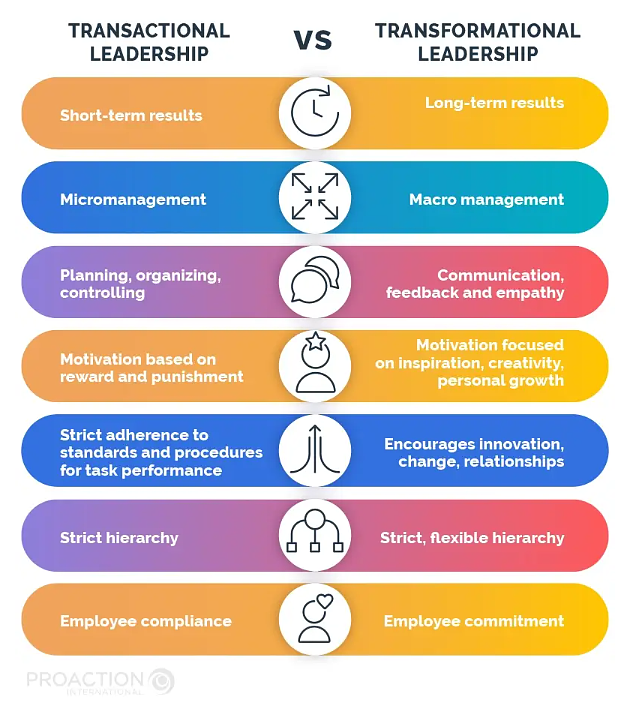
Ways to implement Principle Ten in day-to-day leadership role:
• Set long-term goals: Define and communicate long-term goals that align with the organization’s mission and vision. Encourage team members to understand the broader purpose behind their work and how it contributes to long-term success.
• Stop focusing on short-term gains: You might be able to drive your car extra distance without an oil change without any seeming consequence but we all know that is not true. Saving money by not investing in team development is a short term counterproductive mindset.
• Conversely provide opportunities for learning and development: Support the learning and development of team members by providing access to training programs, workshops, conferences, and other resources. Encourage them to expand their knowledge and skills, enabling them to contribute more effectively to organizational success.
• Foster a growth mindset: Encourage a growth mindset among team members by emphasizing the value of continuous learning, improvement, and personal/professional development. Promote a culture that embraces challenges, views setbacks as opportunities for growth, and values learning from experiences.
• Prioritize and invest in mentoring and coaching: Establish mentorship and coaching programs within the organization. Pair individuals with experienced leaders who can provide guidance, support, and feedback. Encourage the transfer of knowledge and expertise to foster growth and development.
• Foster a learning culture: Create an environment that values and supports continuous learning. Encourage knowledge sharing, innovation, and experimentation. Promote a culture where individuals are encouraged to learn from both successes and failures.
• Recognize and reward growth and development: Acknowledge and celebrate individuals’ efforts in their personal and professional growth journeys. Recognize milestones, accomplishments, and progress made toward long-term goals. Provide incentives and opportunities for further development.
By implementing Principle Ten, leaders can create an environment that prioritizes long-term impact and personal/professional development. Focusing on growth, learning, and sustainable success not only benefits individuals but also contributes to the overall success and resilience of the organization.
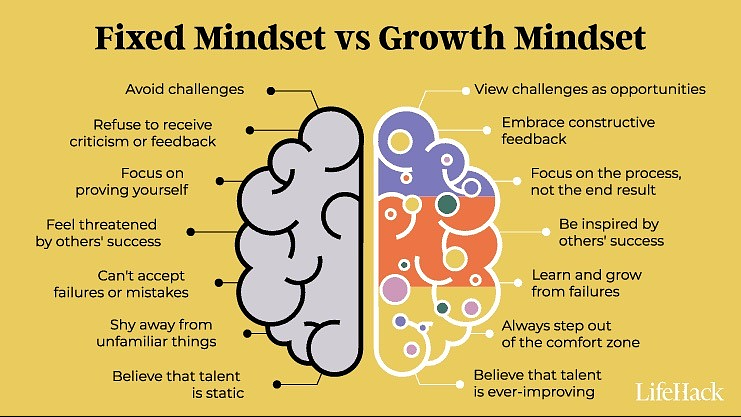
What happens if you solely prioritize immediate results over long-term impact
Solely prioritizing immediate results without considering long-term impact and personal/professional development can have several significant downsides:
1. Short-Term Gains, Long-Term Losses: Relying solely on achieving quick wins can lead to decisions that sacrifice sustainable growth and lasting success. What might seem like immediate success could come at the cost of ignoring potential future challenges or missing out on opportunities for greater achievements down the line.
2. Lack of Innovation: A focus on quick results can discourage experimentation and innovation. Leaders may opt for tried-and-tested methods that yield immediate outcomes, rather than investing time and resources into exploring new ideas or approaches that could lead to more significant breakthroughs in the long run.
3. Burnout and High Stress: Constantly chasing immediate results can lead to a high-stress environment where individuals and teams feel pressured to deliver at an unsustainable pace. This can result in burnout, decreased morale, and even higher turnover rates as people struggle to cope with the relentless pressure.
4. Neglected Learning and Growth: Prioritizing short-term gains might lead to neglecting opportunities for personal and professional development. Leaders and team members may miss out on chances to acquire new skills, expand their knowledge, and enhance their capabilities, hindering their potential for growth.
5. Lack of Adaptability: A short-term focus often doesn’t provide room for flexibility and adaptability in the face of changing circumstances. Leaders who are solely focused on immediate results might struggle to pivot when unexpected challenges arise, leaving their teams ill-prepared to navigate shifting landscapes.
6. Erosion of Trust: If a leader consistently emphasizes quick results over long-term vision, it can erode trust among team members. They may feel that their contributions are only valued for their immediate impact, rather than being part of a larger, meaningful journey.
7. Missed Opportunities for Meaningful Impact: Meaningful, transformative change often takes time to materialize. By fixating on immediate outcomes, leaders risk missing opportunities to create lasting, positive impacts that could benefit individuals, organizations, and communities in profound ways.
In conclusion, while immediate results can offer a sense of achievement, a sole focus on them can lead to a range of negative consequences. It’s crucial for leaders to balance short-term goals with a broader perspective that encompasses long-term impact and personal/professional development. This holistic approach not only enhances the sustainability of outcomes but also nurtures an environment of growth, adaptability, and meaningful change.

Case Study: Elon Musk
Elon Musk provides an illuminating example of a leader who directs his attention towards long-term impact and personal/professional development rather than solely fixating on immediate results. As the CEO of SpaceX and Tesla, Musk’s visionary approach has reshaped industries and challenged conventional norms.
Musk’s endeavors emphasize a future-oriented mindset. He envisions humanity becoming multi-planetary through SpaceX, aiming to establish a human presence on Mars. This focus on interplanetary exploration showcases his dedication to a long-term vision that surpasses the immediacy of quarterly profits.
Furthermore, Musk’s emphasis on personal and professional growth is evident in his tireless pursuit of knowledge and self-improvement. His roles as CEO, engineer, and innovator require a diverse skill set, which he has cultivated through continuous learning. This ethos trickles down, fostering a culture of growth within his companies.
Musk’s electric vehicle company, Tesla, demonstrates his dedication to lasting impact. By pushing the boundaries of electric vehicle technology and renewable energy solutions, he drives innovation in sustainable transportation, creating long-term environmental benefits that extend far beyond short-term financial gains.
In essence, Elon Musk’s leadership underscores the profound effect of focusing on enduring impact and personal/professional development. By embracing an audacious vision and nurturing growth, he exemplifies how transformative leadership can drive innovation, create lasting change, and shape the trajectory of entire industries.

Exercise 1.9: Future Impact Brainstorm
1. Introduction: Recap the importance of thinking long-term and share a brief example of an individual or organization that achieved significant goals through a future-oriented approach. E.g. Elon Musk
2. Brainstorm Long-Term Goals: Have participants individually jot down one long-term goal that could have a meaningful impact. Emphasize thinking beyond short-term results.
3. Group Sharing: Go around the room and have each participant share their long-term goal. Write each goal on the whiteboard.
4. Cluster Goals: Organize the goals on the whiteboard based on common themes or areas of impact.
5. Envision Impact: Break participants into small groups. Assign each group a cluster of goals. Have them envision the impact if all the goals in their cluster were achieved.
6. Group Presentations: Each small group shares their envisioned impact with the larger group.
7. Reflection and Action: Facilitate a brief discussion on the insights gained from the exercise. Ask participants to commit to one action they can take to contribute to achieving a long-term goal.

Course Manual 10: Transformation Principles 11 & 12
Leadership is a multifaceted concept deeply intertwined with a person’s core beliefs, values, and principles. Beyond just authority and direction, effective leadership stems from a leader’s internal compass, shaping their actions, decisions, and interactions. A leader’s beliefs serve as foundational convictions, influencing their approach to challenges and opportunities. These deeply held beliefs frame a leader’s perspective, shaping how they envision success, approach collaboration, and engage with their team.
Aligned with beliefs, a leader’s values come into play, acting as guiding principles that govern behavior and decision-making. When leaders uphold values such as integrity, accountability, or innovation, they create a framework that fosters ethical leadership and establishes a culture of trust and respect. These values not only shape the leader’s character but also set expectations for their team, influencing how they interact and work together.
Additionally, principles derived from a combination of beliefs and values serve as fundamental truths that underpin a leader’s actions. These principles act as a consistent guide for decision-making, particularly in complex or uncertain situations. When a leader consistently adheres to principles of fairness, empathy, or adaptability, they foster a sense of predictability and authenticity that resonates with their team.
Moreover, the integration of a growth mindset into leadership amplifies the impact of these beliefs, values, and principles. A growth mindset, rooted in the belief that abilities can be developed through effort and learning, transforms how leaders approach challenges and setbacks. Leaders who embrace a growth mindset emphasize continuous learning, adaptability, and resilience.
A growth mindset encourages leaders to view failures as opportunities for growth and development. This mindset instills a culture of learning within the team, as leaders model curiosity, open-mindedness, and a willingness to take calculated risks. Leaders who exhibit a growth mindset not only empower themselves but also inspire their team members to push boundaries and innovate.
In conclusion, leadership is profoundly influenced by a leader’s beliefs, values, and principles. These foundational elements shape a leader’s perspective, behavior, and decision-making, creating an authentic and impactful leadership style. When combined with a growth mindset, leadership becomes a catalyst for continuous learning, adaptability, and innovation, fostering an environment where both leaders and their teams thrive.

Principle Eleven: “Leadership originates from a person’s underlying beliefs and values.”
Principle Eleven emphasizes that leadership is deeply rooted in a person’s beliefs, values, and principles. It recognizes that effective leadership stems from a strong sense of personal values and a clear understanding of one’s purpose. By aligning actions and decisions with these underlying beliefs and values, leaders can inspire others and create an authentic and impactful leadership style.
Research has shown that leaders who demonstrate authenticity and act in alignment with their values tend to be more effective in motivating and influencing others. Studies by researchers such as Simon Sinek have highlighted the importance of understanding one’s “why” and communicating it effectively to inspire and engage others.
Source: Rohit Prabhakar
Ways to implement Principle Eleven in day-to-day leadership role:
• Belief’s are foundational to sustainability. Most individuals including leaders do not know what they believe in life and of the world around them. Example: Individuals are inherently evil or individuals are inherently good are beliefs. It is these underlining beliefs that will drive people’s behaviors.
• It starts with Belief Clarification: This is one of the first skills that we will have leaders review and confirm later in the book. This is also true with every team member and person in your circle of influence. If they have not done this step or process, it is impossible for a person to be grounded and centered and be able to function effectively.
• Reflect and confirm personal values: Take time to reflect on your personal values and beliefs. Consider what is truly important to you and how those values align with your leadership role. Identify the values that guide your decision-making and behavior as a leader.
• Communicate your values: Articulate your values to your team and colleagues. Clearly communicate the principles that guide your leadership approach. Share stories and examples that illustrate how your values are reflected in your actions and decisions.
• Make values-based decisions: Consider your values when making decisions. Evaluate the alignment of choices with your underlying beliefs and principles. Strive to make decisions that are consistent with your values, even when faced with difficult situations.
• Encourage values-driven behavior: Encourage and recognize behaviors that align with the shared values of the organization. Create a culture where individuals are encouraged to make decisions and take actions based on their own values and the values of the organization.
• Foster a values-based culture: Nurture a culture that embraces and promotes shared values. Reinforce the importance of values through regular communication, recognition, and alignment of practices and policies with the organization’s core values.
• Lead with integrity: Act in alignment with your values and principles. Demonstrate integrity and consistency between what you say and what you do. This builds trust and credibility among your team members and stakeholders.
• Seek alignment and congruence: Continuously assess your leadership behaviors and actions to ensure they align with your underlying beliefs and values. Strive for congruence between your personal values, the values of your team, and the values of the organization.
• Continuously grow and develop: Engage in ongoing personal and professional development to deepen your understanding of your own values and beliefs. Seek opportunities to further align your leadership approach with your evolving values.
By implementing Principle Eleven, leaders can cultivate an authentic and values-driven leadership style. Leadership that is rooted in personal beliefs and values has the power to inspire and motivate others, fostering a culture of trust, purpose, and collective success.

Case Study: Oprah Winfrey
One leader who is often cited as having strong personal values and a clear understanding of their purpose is Oprah Winfrey. Throughout her career, Oprah has demonstrated a deep commitment to values such as empathy, authenticity, and empowerment, while also having a well-defined sense of purpose.
Personal Values: Oprah Winfrey’s personal values are evident in her interactions, decisions, and philanthropic endeavors. She consistently emphasizes the importance of empathy and understanding, using her platform to shed light on various social issues and challenges faced by individuals. Her commitment to authenticity has allowed her to connect with audiences on a genuine level, fostering trust and respect. Oprah’s values have driven her to create spaces where people feel heard, understood, and inspired to make positive changes in their lives.
Clear Understanding of Purpose: Oprah’s understanding of her purpose is rooted in her desire to inspire, uplift, and transform lives. She has expressed that her mission is to use her influence to create positive change in the world. This purpose has guided her career choices, from her impactful talk show to her involvement in media production, literature, and humanitarian efforts. Oprah’s philanthropic initiatives, such as the Oprah Winfrey Leadership Academy for Girls in South Africa, further exemplify her commitment to empowering individuals to overcome adversity and realize their potential.
Oprah’s leadership is characterized by her alignment with her values and purpose. Her authenticity, empathy, and dedication to making a difference have not only garnered her immense success but have also shaped her legacy as a transformative leader who empowers others to lead purposeful and meaningful lives.

Principle Twelve: “Embracing a growth mindset allows for a deeper understanding of reality beyond the current level of comprehension.”
Principle Twelve emphasizes the importance of adopting a growth mindset in leadership. It highlights that leaders should embrace a belief that their abilities, intelligence, and understanding can be developed through dedication, effort, and continuous learning. By cultivating a growth mindset, leaders can expand their perspectives, challenge assumptions, and adapt to new situations, enabling them to navigate complexity and drive innovation.
Research by psychologist Carol Dweck has shown that individuals with a growth mindset are more likely to seek challenges, persist in the face of obstacles, and view failures as opportunities for growth. They tend to embrace learning, develop resilience, and achieve higher levels of success. In a leadership context, a growth mindset enables leaders to inspire their teams, foster a culture of continuous improvement, and navigate change effectively.
Ways to implement Principle Twelve in day-to-day leadership role:
• Growth mindset is foundational: Growth mindset is mentioned in every other principle as an implementation strategy. Why? Without it – it is nearly impossible to change. It is our openness to learn, adjust and gain new and fresh perspectives.
• Embrace a learning orientation: Cultivate a mindset that values learning and growth. Encourage curiosity, intellectual humility, and a willingness to continuously acquire new knowledge and skills.
• Encourage a growth mindset in others: Foster a culture that promotes a growth mindset among your team members. Encourage them to embrace challenges, view failures as learning opportunities, and invest in their personal and professional development.
• Encourage experimentation and innovation: Create an environment that supports experimentation and innovation. Encourage team members to explore new ideas, take calculated risks, and learn from both successes and failures. Celebrate learning and improvement, rather than solely focusing on outcomes.
• Provide resources for development: Support the growth and development of your team members by providing resources such as training programs, mentorship, coaching, and access to learning opportunities. Help them expand their skills and knowledge base.
• Foster psychological safety: Create a psychologically safe environment where individuals feel comfortable taking risks, sharing ideas, and engaging in open dialogue. Encourage constructive feedback and support mistakes as learning experiences.
• Encourage reflection and self-assessment: Promote reflection and self-assessment as important components of growth and development. Encourage individuals to reflect on their experiences, identify areas for improvement, and set goals for growth.
• Embrace change and adaptability: Foster an organizational culture that embraces change and values adaptability. Encourage your team members to be flexible and open to new ideas and perspectives. Emphasize the importance of adapting to evolving circumstances.
By implementing Principle Twelve, leaders can foster a culture of growth, learning, and adaptability. Embracing a growth mindset enables leaders and their teams to navigate challenges, embrace change, and unlock their full potential.
The negative impact of having a fixed mindset
Having a fixed mindset can have several detrimental effects on leadership, hindering personal growth, team development, and overall organizational success. A fixed mindset is characterized by the belief that one’s abilities and traits are fixed and unchangeable, which can lead to the following negative impacts:
1. Resistance to Change: Leaders with a fixed mindset are often resistant to change because they perceive new challenges as threats to their established competence. This can hinder the organization’s ability to adapt to evolving circumstances and seize opportunities for growth.
2. Fear of Failure: Fixed mindset leaders are more likely to avoid taking risks due to the fear of failure. They may prioritize maintaining their image of competence over pursuing innovative ideas, which stifles creativity and limits the organization’s potential for breakthroughs.
3. Lack of Accountability: When leaders believe that their abilities are fixed, they might be less likely to take responsibility for their mistakes or shortcomings. This can erode trust within the team and discourage a culture of accountability.
4. Limited Learning: Leaders with a fixed mindset may be less inclined to seek out learning experiences or constructive feedback. They might perceive such experiences as threats to their self-image rather than as opportunities for improvement.
5. Stagnation: Fixed mindset leaders tend to plateau in their personal and professional development. They may not actively seek to enhance their skills or acquire new knowledge, resulting in stagnation that can negatively impact their ability to lead effectively.
6. Micromanagement: Fixed mindset leaders might feel the need to closely control their team’s actions to maintain an appearance of competence. This can lead to micromanagement, stifling autonomy and creativity within the team.
7. Inflexible Leadership Style: Leaders with a fixed mindset are more likely to stick to rigid leadership approaches that they believe have worked for them in the past. This can prevent them from adapting their style to different team members’ needs or changing circumstances.
8. Negative Impact on Team Morale: Fixed mindset leaders who prioritize their own success over the growth of their team can create an environment where team members feel undervalued and unsupported. This can lead to decreased morale and engagement.
9. Limited Talent Development: Fixed mindset leaders might not invest in developing the talents and potential of their team members. This limits the growth of individuals and the overall team’s capacity to contribute effectively to the organization.
10. Resistance to Feedback: Leaders with a fixed mindset may interpret feedback as criticism rather than as a means of improvement. This can hinder their ability to refine their leadership skills and foster an environment of open communication.
In conclusion, a fixed mindset can severely hamper a leader’s effectiveness by impeding growth, hindering innovation, and undermining team dynamics. Leaders who cultivate a growth mindset, on the other hand, are better positioned to adapt, learn, and inspire their teams to excel in the face of challenges.

Case Study
Angela Duckworth, a psychologist and author, is a leader who epitomizes a growth mindset. She is renowned for her pioneering research on grit and perseverance, and her insights into the importance of a growth-oriented mindset in achieving long-term goals.
Duckworth’s work emphasizes that success is not solely determined by innate talent, but also by the willingness to put in sustained effort, learn from failures, and persist in the face of challenges. Her research on grit, which she defines as a combination of passion and perseverance, underscores the idea that individuals who maintain a growth mindset are more likely to exhibit the determination required to overcome obstacles.
Through her writing, speaking engagements, and research, Duckworth encourages individuals to embrace the concept of growth. She emphasizes that the path to achievement involves continuous learning, adaptability, and resilience. Duckworth’s leadership and contributions have inspired countless individuals to cultivate a growth mindset, ultimately leading to greater personal and professional development.

Exercise 1.10: Exploring Fixed Mindsets and Growth Mindsets
• Whiteboard or flip chart
• Markers
• Sticky notes
1. Introduction: Recap the concepts of fixed and growth mindsets.
2. Fixed vs. Growth Mindset Activity: Divide the participants into 2 or 3 groups. Provide each group with a set of sticky notes and markers.
• Part 1 – Fixed Mindset: Ask each group to brainstorm and write down statements that reflect a fixed mindset. These could be thoughts or beliefs that hinder personal growth, such as “I’m not good at this,” or “I can’t do it.”
• Part 2 – Growth Mindset: Next, ask each group to brainstorm and write down statements that reflect a growth mindset. These should be thoughts or beliefs that encourage learning, such as “I can improve with practice,” or “Challenges help me grow.”
3. Sharing and Discussion: Have each group share their sticky notes with the entire group. Write down the statements on the whiteboard or flip chart, categorizing them into fixed and growth mindset columns.
Facilitate a discussion on the differences between the two mindsets. Ask questions like:
• How do fixed mindsets limit personal and professional growth?
• How do growth mindsets encourage development and resilience?
• Can you recall instances when you’ve exhibited fixed or growth mindset attitudes?
4. Reflecting on Personal Mindsets: Provide participants with a moment for self-reflection. Ask them to individually consider whether they tend to lean more towards a fixed mindset or a growth mindset. Have them jot down a few examples from their personal experiences.
5. Shift to a Growth Mindset: Lead a group discussion on strategies to shift from a fixed mindset to a growth mindset. Encourage participants to share techniques they can use to embrace challenges, learn from failures, and foster a positive attitude towards improvement.
6. Wrap-Up: Conclude the exercise by summarizing key takeaways and emphasizing the importance of cultivating a growth mindset. Encourage participants to apply what they’ve learned in both their personal and professional lives.

Course Manual 11: Application, Reflection & Taking Action
Cultivating Exceptional Transformational Leaders
In the previous course manuals, we explored the profound concept of Transformational Leadership and its impact on individuals, teams, and organizations. We explored how the 12 transformation principles can mould the best transformational leaders of this era. These principles, carefully formulated through comprehensive research and analysis, serve as the cornerstone for cultivating the best transformational leaders. Lets recap how Transformational Leaders lead their teams and organizations to success as well as fostering personal and professional growth:
Visionary Thinkers
Transformational leaders understand the power of a compelling vision. By envisioning a future that inspires and motivates, they not only ignite passion within themselves but also instill a sense of purpose within their teams.
Authenticity and Integrity
True transformational leadership stems from authenticity and integrity. When leaders remain true to their values and principles, they establish trust and credibility, becoming role models that their team members can look up to.
Empowering Others
The ability to empower and uplift others is central to transformational leadership. By delegating responsibility, encouraging autonomy, and fostering a culture of collaboration, leaders create an environment where growth and innovation flourish.
Active Listening
Effective communication begins with active listening. Transformational leaders understand the importance of genuinely hearing their team members’ perspectives, concerns, and ideas, enabling them to make well-informed decisions and build strong connections.
Adaptability and Learning Agility
Change is inevitable, and transformational leaders embrace it. They continuously seek opportunities for personal and professional growth, displaying adaptability that resonates with their team, particularly in times of uncertainty.
Emotional Intelligence
Understanding and managing emotions, both their own and those of others, is a hallmark of transformational leaders. By fostering emotional intelligence, they create empathetic connections and lead with compassion.
Innovative Mindset
Innovation drives progress, and transformational leaders are catalysts for it. By encouraging creativity and open-mindedness, they challenge the status quo, introducing novel solutions that propel their teams and organizations forward.
Resilience and Grit
Transformational leaders weather challenges with resilience and grit. Their determination in the face of adversity serves as an inspiration to their teams, demonstrating that setbacks are opportunities for growth.
Servant Leadership
A servant leader puts the needs of their team before their own. This selfless approach fosters an environment where collaboration thrives, and individuals feel valued, resulting in enhanced team cohesion and productivity.
Continuous Communication
Transformational leaders prioritize transparent and continuous communication. By keeping their teams informed and engaged, they create a shared sense of purpose and direction, aligning everyone toward common goals.
Mentorship and Development
Investing in the growth of team members is a key responsibility of transformational leaders. By providing mentorship and developmental opportunities, they not only enhance individual skills but also contribute to the overall success of the organization.
Social Responsibility
The best transformational leaders recognize their broader impact on society. They integrate social responsibility into their leadership approach, making ethical decisions that contribute positively to the well-being of the community.

The Importance of the 12 Principles in Leadership Success
In this workshop, we have explored the 12 principles that form the foundation of our Transformational (Magnus) Leadership Development Model. These principles highlight the multifaceted nature of effective leadership and provide guidance for leaders to inspire, empower, and create positive change in their organizations.
Let’s summarize the importance of these principles and their role in leadership success.
1. The first principle reminds us that every individual, in every situation, has the capacity to impact others positively or negatively. It emphasizes the significance of self-awareness and recognizing the influence we have on those around us. By understanding the impact of our actions, we can cultivate a culture of positive leadership.
2. The second principle emphasizes the observation of our actions to understand their effects and identify opportunities for growth. It highlights the importance of self-reflection and continuous improvement, enabling leaders to enhance their effectiveness and adapt their approach.
3. Principle three underscores the power of leading by example. True leadership lies in the choices we make in every moment with every person. By embodying the behaviors and values we expect from others, we inspire and influence our teams to follow suit.
4. Effective leadership, as emphasized in principle four, requires the use of constructive, positive, respectful authority, power, and influence. By utilizing these elements in a responsible and ethical manner, leaders create a positive work environment that motivates and engages their team members.
5. Principle five emphasizes the autonomy individuals have in determining their actions, behavior, and treatment of others. By granting autonomy and fostering a sense of ownership, leaders empower their team members, unlocking their full potential.
6. Leadership, as described in principle six, goes beyond surface-level interactions. It involves understanding and meeting the deeper needs of the people being led or served. By addressing these needs, leaders create an environment that fosters engagement, fulfillment, and overall well-being.
7. Principle seven reminds us that leadership is an affair of the heart and encompasses a moral component central to all other aspects of leadership. By leading with authenticity, empathy, and ethical behavior, leaders build trust, inspire others, and create a positive organizational culture.
8. Principle eight highlights the importance of collaboration and recognizing that leadership is a team effort. By fostering mutual respect, trust, and a sense of belonging, leaders harness the collective intelligence and creativity of their team members to achieve shared goals and drive organizational success.
9. Principle nine emphasizes that leadership opportunities exist in every environment, interaction, situation, and moment. It encourages individuals to recognize their leadership potential and make a positive difference in any context, empowering them to contribute and create impact.
10. Principle ten reminds us that long-term impact and personal/professional development hold greater importance than immediate results. By prioritizing growth, learning, and sustainable outcomes, leaders create a culture that fosters continuous improvement, resilience, and long-term success.
11. Principle eleven underscores that leadership originates from a person’s underlying beliefs and values. By leading in alignment with these values, leaders inspire and motivate others, fostering trust, authenticity, and a sense of purpose.
12. Finally, principle twelve highlights the importance of embracing a growth mindset. By adopting a belief in the potential for growth and continuous learning, leaders expand their perspectives, challenge assumptions, and navigate complexity, enabling them to drive innovation and adapt to change.
Collectively, these 12 principles provide a comprehensive framework for effective leadership. They remind us that leadership is a multifaceted journey that requires self-awareness, authenticity, empathy, collaboration, continuous learning, and a focus on long-term impact. By embracing these principles, leaders can create a positive and empowering environment that nurtures the growth and success of their teams and organizations.
As we conclude this chapter, let us carry these principles forward, integrating them into our leadership practices and embracing their transformative power. By doing so, we lay the groundwork for our continued leadership journey and the collective success of those we lead.
As part of the next module you will be reviewing and engaging the skills in section one Self-Management. You will also be completing another assessment the Personal Style Indicator as part of this module and begin your understanding of your leadership Style and how this is influencing your credibility with others.

Exercise 1.11: Self-Reflection Chart: Tracking Personal and Work Situations
1. Create Your Self-Reflection Chart: Set up a journal, spreadsheet, or digital document where you can regularly record your reflections. Divide your chart into the following sections:
• Date: Record the date of each entry.
• Situation: Describe the situation briefly (work-related or personal) that you want to reflect upon.
• Thoughts: Note down the thoughts that crossed your mind during the situation. Be as detailed as possible.
• Emotions: Identify and describe the emotions you felt during the situation.
• Reactions/Actions: Describe how you responded or reacted in the situation.
• Outcome: Reflect on the outcome of your reactions or actions.
2. Choose Situations: Select a few situations each week to reflect upon. Aim for a mix of work-related and personal scenarios. These can range from challenging work tasks to interactions with colleagues, friends, or family members.
3. Regular Reflection: Set a specific time each day or week (e.g., before bed or at the end of the workweek) to fill in your self-reflection chart. Consistency is key to gaining valuable insights.
4. Deepen Your Reflections: As you fill in your chart, try to dig deeper into your thought processes. Ask yourself why you thought or felt a certain way, and how you could have responded differently.
5. Review and Learn: At the end of the month, review your self-reflection chart. Look for patterns in your thoughts, emotions, and reactions. Identify areas where you consistently handled situations well and areas where you could improve.
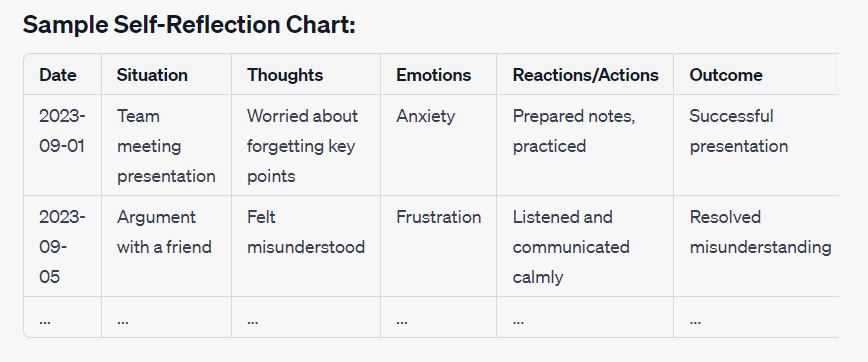
• Are there situations that consistently trigger certain reactions?
• How could you have approached challenging situations differently?
• What strengths did you demonstrate during the month?
• What areas would you like to focus on for personal growth?

Exercise 1.12: Team Beliefs, Values, and Principles Impact Chart
1. Create Your Impact Chart: Set up a chart in a journal, spreadsheet, or digital document where you can record your observations throughout the month. Divide the chart into the following sections:
• Date: Record the date of each entry.
• Team Beliefs/Values/Principles: Identify the specific belief, value, or principle you’re focusing on for that entry.
• Observations: Describe how the chosen belief, value, or principle manifested in your team’s actions, decisions, or interactions.
• Impact: Reflect on the impact of these actions, decisions, or interactions on the work environment, team dynamics, and relationships.
2. Select Focus Areas: Choose a few key beliefs, values, or principles that your team holds dear. These could be related to collaboration, innovation, integrity, customer focus, etc.
3. Regular Tracking: Dedicate a few minutes each day or week to reflect and record instances where you notice the chosen belief, value, or principle affecting your team’s actions.
4. Diverse Situations: Consider various scenarios where your team’s guiding principles come into play, such as meetings, project discussions, interactions with clients, and internal communications.
5. Deepen Your Observations: As you fill in your chart, dig into the context of each observation. How did the belief, value, or principle influence decision-making or behavior? What were the consequences, both positive and challenging?
6. Month-End Reflection: At the end of the month, review your impact chart. Look for patterns and trends in how your team’s principles are being upheld and their outcomes.
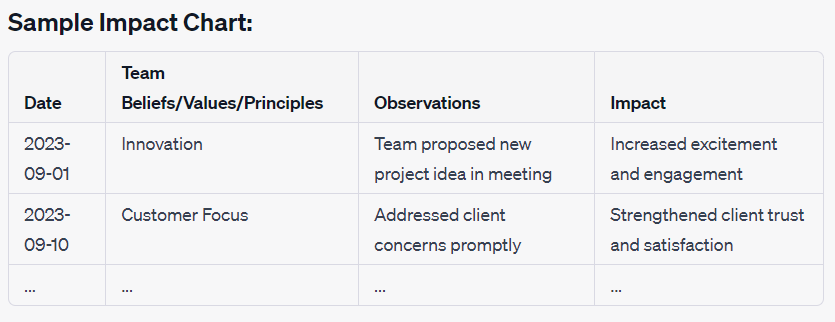
Project Studies
Project Study (Part 1) – Customer Service
The Head of this Department is to provide a detailed report relating to the Introduction and Leadership Principles process that has been implemented within their department, together with all key stakeholders, as a result of conducting this workshop, incorporating process: planning; development; implementation; management; and review. Your process should feature the following 12 parts:
01. Influence, Credibility and the Transformational Leader
02. The Foundation of Self-Awareness in Leadership Success
03. Completion of the Leadership Skills Inventory
04. Developing the Whole Leader: You!
05. Transformational Principles 1 & 2
06. Transformational Principles 3 & 4
07. Transformational Principles 5 & 6
08. Transformational Principles 7 & 8
09. Transformational Principles 9 & 10
10. Transformational Principles 11 & 12
11. Application, Reflection & Taking Action
Please include the results of the initial evaluation and assessment.
Project Study (Part 2) – E-Business
The Head of this Department is to provide a detailed report relating to the Introduction and Leadership Principles process that has been implemented within their department, together with all key stakeholders, as a result of conducting this workshop, incorporating process: planning; development; implementation; management; and review. Your process should feature the following 12 parts:
01. Influence, Credibility and the Transformational Leader
02. The Foundation of Self-Awareness in Leadership Success
03. Completion of the Leadership Skills Inventory
04. Developing the Whole Leader: You!
05. Transformational Principles 1 & 2
06. Transformational Principles 3 & 4
07. Transformational Principles 5 & 6
08. Transformational Principles 7 & 8
09. Transformational Principles 9 & 10
10. Transformational Principles 11 & 12
11. Application, Reflection & Taking Action
Please include the results of the initial evaluation and assessment.
Project Study (Part 3) – Finance
The Head of this Department is to provide a detailed report relating to the Introduction and Leadership Principles process that has been implemented within their department, together with all key stakeholders, as a result of conducting this workshop, incorporating process: planning; development; implementation; management; and review. Your process should feature the following 12 parts:
01. Influence, Credibility and the Transformational Leader
02. The Foundation of Self-Awareness in Leadership Success
03. Completion of the Leadership Skills Inventory
04. Developing the Whole Leader: You!
05. Transformational Principles 1 & 2
06. Transformational Principles 3 & 4
07. Transformational Principles 5 & 6
08. Transformational Principles 7 & 8
09. Transformational Principles 9 & 10
10. Transformational Principles 11 & 12
11. Application, Reflection & Taking Action
Please include the results of the initial evaluation and assessment.
Project Study (Part 4) – Globalization
The Head of this Department is to provide a detailed report relating to the Introduction and Leadership Principles process that has been implemented within their department, together with all key stakeholders, as a result of conducting this workshop, incorporating process: planning; development; implementation; management; and review. Your process should feature the following 12 parts:
01. Influence, Credibility and the Transformational Leader
02. The Foundation of Self-Awareness in Leadership Success
03. Completion of the Leadership Skills Inventory
04. Developing the Whole Leader: You!
05. Transformational Principles 1 & 2
06. Transformational Principles 3 & 4
07. Transformational Principles 5 & 6
08. Transformational Principles 7 & 8
09. Transformational Principles 9 & 10
10. Transformational Principles 11 & 12
11. Application, Reflection & Taking Action
Please include the results of the initial evaluation and assessment.
Project Study (Part 5) – Human Resources
The Head of this Department is to provide a detailed report relating to the Introduction and Leadership Principles process that has been implemented within their department, together with all key stakeholders, as a result of conducting this workshop, incorporating process: planning; development; implementation; management; and review. Your process should feature the following 12 parts:
01. Influence, Credibility and the Transformational Leader
02. The Foundation of Self-Awareness in Leadership Success
03. Completion of the Leadership Skills Inventory
04. Developing the Whole Leader: You!
05. Transformational Principles 1 & 2
06. Transformational Principles 3 & 4
07. Transformational Principles 5 & 6
08. Transformational Principles 7 & 8
09. Transformational Principles 9 & 10
10. Transformational Principles 11 & 12
11. Application, Reflection & Taking Action
Please include the results of the initial evaluation and assessment.
Project Study (Part 6) – Information Technology
The Head of this Department is to provide a detailed report relating to the Introduction and Leadership Principles process that has been implemented within their department, together with all key stakeholders, as a result of conducting this workshop, incorporating process: planning; development; implementation; management; and review. Your process should feature the following 12 parts:
01. Influence, Credibility and the Transformational Leader
02. The Foundation of Self-Awareness in Leadership Success
03. Completion of the Leadership Skills Inventory
04. Developing the Whole Leader: You!
05. Transformational Principles 1 & 2
06. Transformational Principles 3 & 4
07. Transformational Principles 5 & 6
08. Transformational Principles 7 & 8
09. Transformational Principles 9 & 10
10. Transformational Principles 11 & 12
11. Application, Reflection & Taking Action
Please include the results of the initial evaluation and assessment.
Project Study (Part 7) – Legal
The Head of this Department is to provide a detailed report relating to the Introduction and Leadership Principles process that has been implemented within their department, together with all key stakeholders, as a result of conducting this workshop, incorporating process: planning; development; implementation; management; and review. Your process should feature the following 12 parts:
01. Influence, Credibility and the Transformational Leader
02. The Foundation of Self-Awareness in Leadership Success
03. Completion of the Leadership Skills Inventory
04. Developing the Whole Leader: You!
05. Transformational Principles 1 & 2
06. Transformational Principles 3 & 4
07. Transformational Principles 5 & 6
08. Transformational Principles 7 & 8
09. Transformational Principles 9 & 10
10. Transformational Principles 11 & 12
11. Application, Reflection & Taking Action
Please include the results of the initial evaluation and assessment.
Project Study (Part 8) – Management
The Head of this Department is to provide a detailed report relating to the Introduction and Leadership Principles process that has been implemented within their department, together with all key stakeholders, as a result of conducting this workshop, incorporating process: planning; development; implementation; management; and review. Your process should feature the following 12 parts:
01. Influence, Credibility and the Transformational Leader
02. The Foundation of Self-Awareness in Leadership Success
03. Completion of the Leadership Skills Inventory
04. Developing the Whole Leader: You!
05. Transformational Principles 1 & 2
06. Transformational Principles 3 & 4
07. Transformational Principles 5 & 6
08. Transformational Principles 7 & 8
09. Transformational Principles 9 & 10
10. Transformational Principles 11 & 12
11. Application, Reflection & Taking Action
Please include the results of the initial evaluation and assessment.

Project Study (Part 9) – Marketing
The Head of this Department is to provide a detailed report relating to the Introduction and Leadership Principles process that has been implemented within their department, together with all key stakeholders, as a result of conducting this workshop, incorporating process: planning; development; implementation; management; and review. Your process should feature the following 12 parts:
01. Influence, Credibility and the Transformational Leader
02. The Foundation of Self-Awareness in Leadership Success
03. Completion of the Leadership Skills Inventory
04. Developing the Whole Leader: You!
05. Transformational Principles 1 & 2
06. Transformational Principles 3 & 4
07. Transformational Principles 5 & 6
08. Transformational Principles 7 & 8
09. Transformational Principles 9 & 10
10. Transformational Principles 11 & 12
11. Application, Reflection & Taking Action
Please include the results of the initial evaluation and assessment.

Project Study (Part 10) – Production
The Head of this Department is to provide a detailed report relating to the Introduction and Leadership Principles process that has been implemented within their department, together with all key stakeholders, as a result of conducting this workshop, incorporating process: planning; development; implementation; management; and review. Your process should feature the following 12 parts:
01. Influence, Credibility and the Transformational Leader
02. The Foundation of Self-Awareness in Leadership Success
03. Completion of the Leadership Skills Inventory
04. Developing the Whole Leader: You!
05. Transformational Principles 1 & 2
06. Transformational Principles 3 & 4
07. Transformational Principles 5 & 6
08. Transformational Principles 7 & 8
09. Transformational Principles 9 & 10
10. Transformational Principles 11 & 12
11. Application, Reflection & Taking Action
Please include the results of the initial evaluation and assessment.

Project Study (Part 11) – Logistics
The Head of this Department is to provide a detailed report relating to the Introduction and Leadership Principles process that has been implemented within their department, together with all key stakeholders, as a result of conducting this workshop, incorporating process: planning; development; implementation; management; and review. Your process should feature the following 12 parts:
01. Influence, Credibility and the Transformational Leader
02. The Foundation of Self-Awareness in Leadership Success
03. Completion of the Leadership Skills Inventory
04. Developing the Whole Leader: You!
05. Transformational Principles 1 & 2
06. Transformational Principles 3 & 4
07. Transformational Principles 5 & 6
08. Transformational Principles 7 & 8
09. Transformational Principles 9 & 10
10. Transformational Principles 11 & 12
11. Application, Reflection & Taking Action
Please include the results of the initial evaluation and assessment.

Project Study (Part 12) – Education
The Head of this Department is to provide a detailed report relating to the Introduction and Leadership Principles process that has been implemented within their department, together with all key stakeholders, as a result of conducting this workshop, incorporating process: planning; development; implementation; management; and review. Your process should feature the following 12 parts:
01. Influence, Credibility and the Transformational Leader
02. The Foundation of Self-Awareness in Leadership Success
03. Completion of the Leadership Skills Inventory
04. Developing the Whole Leader: You!
05. Transformational Principles 1 & 2
06. Transformational Principles 3 & 4
07. Transformational Principles 5 & 6
08. Transformational Principles 7 & 8
09. Transformational Principles 9 & 10
10. Transformational Principles 11 & 12
11. Application, Reflection & Taking Action
Please include the results of the initial evaluation and assessment.
Program Benefits
Technology
- Foster creativity
- Ensure compliance
- Enhance skills
- Improve experience
- Reduce footprint
- Streamline processes
- Ensure protection
- Drive advancements
- Embrace change
- Optimize processes
Management
- Nurture leaders
- Foster collaboration
- Retain talent
- Smooth transitions
- Data-driven decisions
- Drive improvement
- Resolve conflicts
- Promote inclusivity
- Enhance EQ
- Set direction
Operations
- Streamline operations
- Optimize logistics
- Ensure consistency
- Mitigate risks
- Decrease expenses
- Measure performance
- Eliminate variability
- Enhance satisfaction
- Promote responsibility
- Drive enhancements
Client Telephone Conference (CTC)
If you have any questions or if you would like to arrange a Client Telephone Conference (CTC) to discuss this particular Unique Consulting Service Proposition (UCSP) in more detail, please CLICK HERE.













